#But of a later immigrant generation and less accepted by old New York
Explore tagged Tumblr posts
Text
I don't want to go to work but I showered and put on clean clothes and brushed my teeth and washed my face and did my skincare and took my meds and am being sooo brave about it. I'm going to read academic articles from the 90s about Jewishness in American Gilded Age novels at the register for fanfiction research then sleep for 84 years
#Isidore Levinson was I think conceived in part as an August Belmont figure#But of a later immigrant generation and less accepted by old New York
14 notes
·
View notes
Text
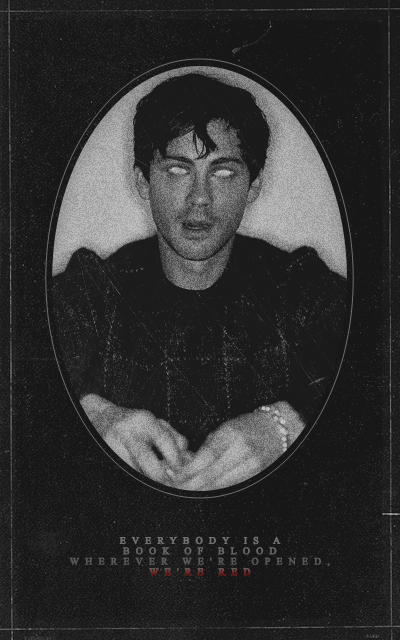
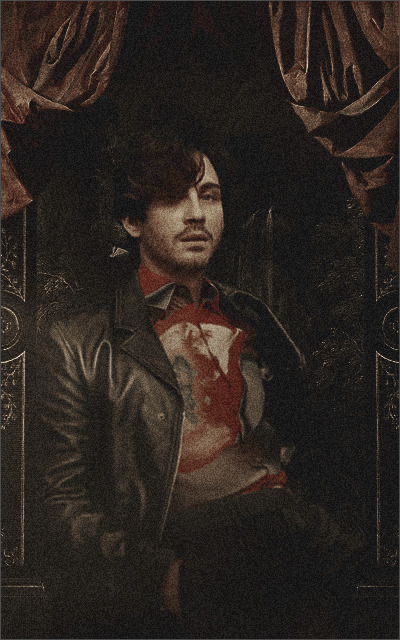
❝ EVERYBODY IS A BOOK OF BLOOD. WHEREVER WE'RE OPENED, WE'RE RED. ❞
⸻. ᚠᚱᛟᛗ ⸻ logan lerman. cis man. he/him. ⸻ i saw EASTON JAMES around COLONY HOUSE, you know? the 29 years old that was driving from BROOKLYN, NEW YORK when they saw the tree on the road. EASTON has been here for TWO DAYS and I think they were A FOURTH YEAR MEDICAL STUDENT before they got stuck in the town. with the way things are now, they are now struggling to maintain a sense of normalcy and seek a way out without losing themselves or dying. lets hope you at least survive the night. ⸻
GENERAL information. ⸻
full name easton nathaniel james
nickname(s) easton
age twenty-nine
gender identity cis man
orientation bisexual
place of birth baltimore, maryland
date of birth may 2nd, 1994
former occupation medical student at nyu
3 positive traits dauntless, incisive and steadfast
3 negative traits acrimonious, persistent and volatile
moral alignment lawful neutral
faceclaim logan lerman
TOWN information. ⸻
current residency colony house
current occupation doctor
BIOGRAPHY your character's background. (TW: death, medical explanations) ⸻
Easton hoped he would move through this life without incident, without anything that would shake up his whole world, but nobody gets what they really want.
Easton's world was mundane, ordinary even. The son of two Polish immigrants with a younger brother never screamed unique for him. He was just one of many in school as a child. His parents did the best they could, but they would often work long hours. Thankfully, he had his younger brother Ezra in his life to make the days less ordinary.
Despite the pressure he felt from the outside, Ezra always seemed to take his stress away effortlessly. While Easton felt lost in the universe, Ezra always seemed sure of himself. That's what was the worst about his accident. At fourteen years old, Ezra not only insisted on becoming involved in school sports but demanded it in hopes to integrate himself more. Eventually their parents caved and he was able to start playing football for their high school, excelling in it almost immediately.
It wouldn't be much longer until Ezra experienced the last blow, literally. A usual game, just like the others before, that ended up with his brother facing up on the turf. As a precaution they went to the hospital, but was diagnosed with nothing more than a simple head injury and sent home without further testing. Days later, in the middle of the school day an ambulance arrived to take the younger James brother to the hospital.
It was an undiagnosed traumatic brain injury from the blow to his head. If it had been caught early enough, Ezra would have been fine, but without a CT scan to diagnose the injury, his brain was left to bleed and the pressure caused him to seize and lose consciousness. Ezra never woke up after that. At sixteen years old, Easton became an only child.
The hospital took his parents aside, offered them a measly 500,000 that went as quickly as it came, to avoid a lawsuit and without knowing anything else, they accepted. It didn't matter what payout the James family received, it didn't take away their loss. Easton couldn't understand what had happened, that he lost his brother from a stupid mistake. After that, Easton was done living a life of uncertainty.
He became obsessed with his brother's case, even if it would never bring back his brother he learned the mistake they had made and he enraged. The system failed them and he would do anything to make sure that wouldn't happen again.
Studying for the rest of his high school years, he rose academically to make sure that he could get into the best school, the best programs so that he could become a doctor that would be more diligent than those who treated his brother. His parents watched their oldest go from a soft young boy to a toughened man. He had gotten into the University of Maryland without trouble and dedicated all his time and studies to prepare for medical school.
All that hard work paid off and he accepted a position at the NYU medical school. Vindication was within reach and even if time passed, Easton never forgot about Ezra and what happened. He had seen numerous cases in school of those with a head injury, each one of them correctly diagnosed and they left the school with their lives which was never offered to Ezra.
Easton was about ready to graduate, but his best friend suggested a road trip to upstate New York for one last celebration of fun before they all went their separate ways with their residencies. However, a fallen tree would derail their plans.
Through the woods, Easton lost his friend and managed to be discovered by people who helped him and took him to a place that he was safe. He felt like he was losing his brother again when they told him that there was no way out of this place he had stumbled upon and now he faces the same pain he felt all those years ago.
Now, he's been hearing his brother's voice at night and slowly he's going mad.
#from.intro#easton: intro#easton: tasks 「like you said i'll just get happy instead」#easton: musings 「while these thoughts all leech from my head」#easton: conversations 「so i disassociate until i'm separate from my body and i shelter in the words i never said」#easton: answered 「there's a solemn breeze and it's whispering things that i don't want to hear」#easton: answered 「are we dancing after death you and i?」#tw: death#tw: medical
4 notes
·
View notes
Text
Subtext and Culture, Young Royals, Season 1, Episode 2
Episode 2 picks up the morning day after the initiation party, the girls are having breakfast lunch at their dorm, the boys at theirs, and everyone wants the juicy details about what happened at the party...

Culture: Tell me more, tell me more, did you get very far? Although, it's pretty funny how the roles are reversed, Maddie is all "meh" about it, while Nils tells a different story. Then again, since when do you get together after a blowjob?
Culture: I actually have no idea why Simon is having breakfast at Skogsbacken, since regular schools only cover lunch for students, everyone eats breakfast at home, and then goes to school. Then again, it allows a scene where (Never mind, they're having lunch, thanks @kamand !) Blink and you miss it: Wilhelm casts some nervous glances at Simon after having been called out for disappearing at the party and almost forced to confess to making out with someone.
Culture: I know Felice is trying to put August down, but don't knock a proper Swedish pizza! As much as I like living in the US, they can't fucking make pizzas here, and the first thing I eat every time I go back to Sweden is always a real pizza. With pineapple and shrimp as God intended pizza to be made!
Culture: August is namedropping ski resorts in the Alps, which is where you go skiing in Europe if you have money, although Saint-Martin-de-Belleville is actually near Val Thorens in France, while Verbier is in Switzerland. It does have a three-star restaurant, though. Sweden and Norway have a couple of decent ski resorts, but the Scandinavian mountain chain is simply not as impressive as the Alps.
Subtext: Remember Wilhelm getting up and hurrying to math class in the beginning of the scene? It was so he could grab the other seat next to Simon, because he knows Simon is gonna sit next to Sara, since no-one else does.
Culture: Formally greeting your teacher before class is very uncommon in Sweden, but since Hillerska is all about discipline and tradition, of course they do it. Note that they're again using the formal Swedish title for male teachers, Magister, which in a regular school would be kind of a joke, since teachers and students are on a first-name basis with each other.
Subtext: Wilhelm is exposing how the world works if you have money. At Simon's old school, studying alone would result in good grades, but Hillerska is slightly corrupt and almost expects the students to essentially pay for getting a good grade.
Subtext: Simon is lying to his teacher, he absolutely hasn't talked to his parents about paying for private lessons.

Subtext: No, Sara absolutely does care about what other people think about her, and when she directly tells Felice that she would actually like some friends, that's when Felice gets it and starts making an effort to become real friends with her.
Culture: They're all bilingual at Simon's home, they're all speaking Spanish and Swedish, although Linda has a very noticeable accent to her Swedish. Based on demographics and statistics, the most likely scenario is that Linda immigrated to Sweden from Chile, met Micke, and started a family. In real life, Omar Rudberg was born in Venezuela and grew up in Sweden, while Carmen Gloria Pérez was born in New York, and grew up in Puerto Rico.
Subtext: Remember how I talked in the intro post about how distant social classes know nothing of each other? Ayub and Rosh are either working class or lower middle class like Simon, and since rowing is a typical upper class sport, they know nothing of it, they don't even think of it as a real sport. Unlike football, which is a proper working class sport, they know all about that!
Subtext: Scandinavia has Jantelagen, and everyone there thinks it's uniquely Scandinavian, but all countries have some form of Tall Poppy Syndrome. In this scene, Simon is starting to make a class journey, he started rowing, he started trying to fit in with the other upper-class kids, and getting into a relationship with someone as upper-class as Wilhelm would definitely move him all the way. But going on a journey means leaving things behind, which is why Rosh and Ayub are cutting him down and literally turning their backs on him. They like it in the small town of Bjärstad, why can't he be happy there too? Why is he betraying his roots?
Subtext: This comment from August nicely foreshadows a later episode when August does something traceable on a School computer...
Subtext: What August means is that he's not sure Wilhelm has the same desire to be accultured into the upper class, to play the part of a proper prince, in the same way that he and Erik have accepted their roles and are even enjoying them.
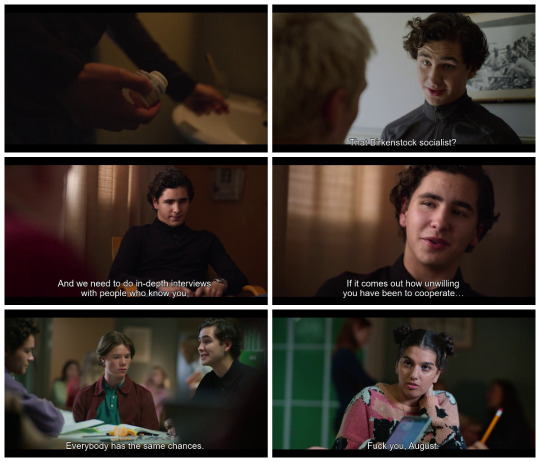
Culture: Although it's impossible to read the name of the medicine, the paper tag on the bottle indicates that it's some kind of prescription medicine. From the conversation with Vincent, we learn that it's some kind of ADHD medication, probably some kind of Dextroamphetamine since those improve athletic ability and cognitive functions in healthy people.
Culture: Birkenstock sandals are associated with hippies in Sweden as well as in many parts of the world, so August is actually saying that the school counselor isn't really part of the same upper-class society as the rest of the staff. And again, his use of the word sosse drives the point home.
Subtext: Consequently, the counselor sees right through August and refuses to immediately prescribe him the medication that he wants...
Subtext: ...even though August tries to both bribe him and threaten him into giving him the medication he wants.
Subtext: A big theme of this episode is class journeys, and in this scene and a previous exercise scene, August gushes about how good a thing that is, how proud he is of Simon for going on one, and spouts some crap about how everyone can make it if they really want to.
Subtext: Thankfully, Madison says what we're all thinking: August is full of shit, life isn't fair, and they're only at the school because they were born into privilege.

Blink and you miss it: After Wilhelm has nervously texted his crush for the first time, he starts to bite his fingernails, but quickly stops himself, because why would he be nervous? He's just texting another boy about rowing practice, there's nothing more to it!
Subtext: Simon's texting game is on point though, he knows exactly what he should write to get Wilhelm to go on a totally-not-a-date with him.
Subtext: In the same way that August couldn't convince the counselor about being sick, I don't think Wilhelm's atrocious acting here convinces August that he's sick either.
Culture: Public transport in the greater Stockholm area - or wherever we're supposed to be - is of course cash-less, and you pay by either charging a special card, or by signing up in their app and buying tickets through there. The point of this scene though is to drive home how Wilhelm has never ever had to take the bus before in his life, and therefore has no idea how it works.
Culture: The totally-not-a-date starts at a Circle K, which in Sweden is just another gas station, but it is actually a Canadian multi-national convenience store corporation. The price of gas is of course posted in kr/l, and 13.98kr/l corresponds to roughly $6/gal.
Subtext: Throughout the totally-not-a-date, Wilhelm is trying to reach for common ground with Simon, trying to show him how he's just a regular guy...
Subtext: ...but then real life intrudes, Wilhelm is recognized by some local girls, who call out to him and run away giggling, which shows how he's not a regular guy, he's going to get recognized wherever he goes.
Culture: Kokt eller grillat, boiled or grilled, are the two ways you can get your hot-dog at pretty much any hot-dog place in Sweden, and ketchup and mustard is always offered. The correct answer to this question is of course grilled, with ketchup and mustard, and this just shows that Wilhelm is a man of culture and good taste. Unfortunately, they were out grilled ones, so they all got boring soggy boiled hot-dogs instead. Is there a metaphor here? I don't know.
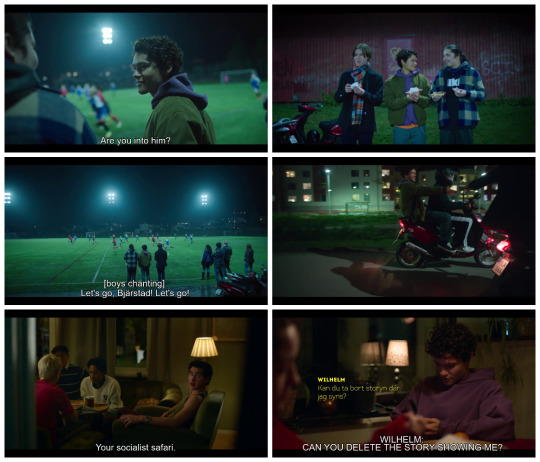
Subtext: Again, the show drives home the point that absolutely no-one has a problem with people being gay. Simon is clearly out to Ayub and the rest of his friends, and Ayub immediately picks up on the fact that this is totally a date.
Blink and you miss it: Ayub nudges Simon with his elbow to tell him that he should make a move on Wilhelm.
Culture: What we're looking at is just the local junior/high school football team, Bjärstad, playing a match against some other unnamed junior football team. Since the stakes are super low, the audience basically consists of whichever parents and friends of the players that could be bothered showing up.
Culture: Driving age is 18 in Sweden, and even then getting your own car at that age is extremely uncommon. However, you can easily get a license for a moped when you turn 15, so these are the vehicles of choice for teenagers to get around.
Subtext: August found out about Wilhelm's trip to town, but his main problem with it is that he wants Wilhelm to stop slumming it with lower class people, and to start hanging out with everyone at school instead, so that he can be properly accultured into the upper class. Again, sosse in this context means working class, not socialist.
Subtext: Although Simon felt really great about his first date with Wilhelm, the text message reminds him that Wilhelm isn't a regular person, and that even this innocent little trip generates interest and scrutiny, and can't be posted publicly.

Culture: As everyone should have noticed by now, Madison keeps speaking English, while everyone speaks to her in Swedish, so clearly she understands it. But here she gives her motivation for sticking to English, and that is that she doesn't feel she's good enough at speaking Swedish. Boarding schools like Hillerska attracts international students that have some kind of connection to the country, so a likely scenario is that Madison grew up in the US with a Swedish parent, and she's being sent here to experience Swedish culture and get immersed in the language to learn it better.
Cinematography: This shot of August drives really home all the pressure he is under, he's out of drugs, the headmistress just hinted that he's out of money, and he's literally being weighed down by books and work-out weights.
Subtext: Simon has kept his visits to Micke a secret from Sara, so here he has to intervene to make sure August doesn't accidentally reveal this to her. He also wants to protect his sister, so he's redirecting August's search for drugs onto himself.
Subtext: And on the flipside, Simon isn't really telling his dad that Sara still hates him and really doesn't want to see him, so he's vague when Micke asks about Sara and Linda.
Culture: Finally a bottle of medicine where we can read the label! Unfortunately for Simon, this is Tramadol, an opiate prescribed for pain relief, which is the complete opposite of the kind of drugs August wants.
Subtext: If you haven't figured out yet that this episode is about class journeys, August spells it out for us here. However, the reason he's "congratulating" Simon in front of everybody is because Simon just supplied him with more drugs, so this is his way of thanking him, since he can't really pay him.

Blink and you miss it: For a split second, Wilhelm grabs Simon's leg during the scary scene.
Subtext: The entire dialogue of the movie works as subtext for what's actually going on between Wilhelm and Simon at this point, and Wilhelm is getting a little freaked out by this sneaky display of affection.
Subtext: The movie also puts words on the implications of Wilhelm getting together with a boy, what about having kids in the future? Can you carry on your family name and traditions, or will they die with you?
Lost in translation: The plaque actually says "FEEL YOUR RESPONSIBILITY FOR THE HERITAGE". Even though the plaque means the heritage and legacy of the school itself, Wilhelm is thinking about his legacy, his heritage, and how getting together with Simon would threaten that.
Lost in translation: Wilhelm actually says "jag är inte en..." - "I'm not a..." before he stops himself. So it's not possible that he was trying to say "I'm not gay", because that doesn't work grammatically in Swedish either. He could be trying to say "I'm not a guy like that" or "I'm not a guy who likes guys", that would work.
Cinematography: The framing and silhouetting of this shot is just chef's kiss. The outline of their hair allows us to see who is who, and we can see from their poses that Simon is welcoming a kiss, while Wilhelm is still hesitating.
493 notes
·
View notes
Photo


Fragile [1/3]
Part Two
Based on The Falcon and the Winter Soldier
Pairing: Bucky Barnes x Fem!Reader
Summary: Who would have thought that fate would bring you face to face with your father's killer? 13 years old, an orphan girl who was taken under the protection of the United States, who was educated to serve the nation and who was now assigned by the CIA to guard what was once one of the most dangerous men in the world.
Warnings: Mentions of murder, psychological problems, violence.
Word count: 2463
A/N: Post Endgame. Sorry for my spelling and grammatical mistakes, English is not my native language, I am learning.

You are waiting for a plane, a plane that will take you far away. You know where you want to go, where you need to go, but you really have no idea where that plane will take you. But it doesn't really matter now, nothing matters because you've lost everything, you have nothing left. Whatever fate throws at you you are willing to accept it, after all you leave nothing behind. That's what you told yourself when in 2009, at the age of thirteen, you boarded that plane that took you out of Iran, when your nuclear engineer father was brutally murdered by someone you could never put a name or a face to. It was not until much later that you discovered the truth of that moment that marked your life forever.
Call it fate, call it chance, but that plane paved your future path. Your destination was the United States, specifically the city of Washington. At the age of 13, when you were a minor, you were detained by the government, assigned to a foster family, preparing you for your future, which already seemed to be written. At 18, the CIA had your position waiting for you, you had been educated and trained for the job, you never had a different opportunity in front of you, but you didn't really want it either.
Your first years within the Central Intelligence Agency you had to learn and live with all the events that that group, called the Avengers, dropped on the nation and the whole world. However, you were not a part of it until it was all over, for like the vast majority of humanity your body vanished from the face of the earth and did not return until years later. That's when it all began. When your superior assigned you a case, his case, to be the shadow of James Buchanaham Barnes, also known as the Winter Soldier, who was going to rejoin society after being pardoned by the government. You didn't know what that meant, what that entailed.
Your move to New York was sudden, the neighbourhood the man had selected to live in was in Sunset Park, a New York borough of Brooklyn, one of the best known ethnic Chinese enclaves. It was really nice, but the building was far less comfortable than the neighbourhood. When you arrived with barely any hot water, you figured that assuming the building looked like it might collapse at the drop of a hat, the plumbing would be no less so. But at least your CIA team had been able to provide you with comfortable furniture and the necessary equipment to do your job.
You had a plan, the plan, you had been analysing Bucky Barnes, his exits from the building, the places he frequented, which were pretty scarce apart from the therapy sessions and the restaurant across the street, and his social relations, which were even scarcer, however he had forged a small friendship with a neighbour in the same building, Yori Nakajima originally from Japan. You didn't have to work out your first meeting, any self-respecting neighbour would help a newcomer to the building during the move.
A dozen cardboard boxes were scattered around the hall of the building, you looked at them with a thoughtful gesture while biting your nails waiting for your dear neighbour to arrive from the laundry next door. You had kept track of the time, and just as you predicted, he came in through the front door with a basket of clean clothes. You continued to look at the boxes, took a breath and exaggerated your gesture of concern, just as he focused his gaze on you.
"Do you need help?" he asked, putting down the laundry basket and approaching you.
You turned your face, still biting your nails, but pretended to be surprised to find him there.
"Oh, don't worry, I only just realised that this building is so green it barely has a lift," you said with a smile, causing Bucky to grin.
"Yes, we like to do our bit for the environment," he said, putting his hand behind his head and then offering it to you in greeting. "Bucky."
"Susan," you smiled and shook his hand, then returned your gaze to the stacked boxes. Evidently that wasn't your real name, it was the name of the person you had invented yourself.
"Come on, let me help you," abandoning his laundry basket he approached your belongings and with barely a reproach he picked up two stacked boxes.
"Oh, God, don't you think you should...?" you began worriedly as you looked at the weight he had taken into his arms.
"Don't worry," he added. "Do you think you could take my clothes?"
That was how it all began. Maybe it could have started some other way, perhaps a chance encounter at the laundromat next door, or when you came out of your government-assigned therapy, or maybe a night at the Japanese restaurant, but no, it was that way. You had no idea how things were going to develop, you had no idea why you were assigned to the case, you were so innocent that you thought it was because of your positive attitude, your willingness to do something relevant, but there was too much hidden behind it that you had hardly a clue. You and that young man were connected, a blood-soaked red thread linked you, but it wasn't until some time later that you discovered it.
Before you knew it, the boxes had gone from being stacked in the hall of the building to being in your small living room. You barely had to feign the surprise you felt as the young man had climbed all four floors in record time.
"OK, who are you? You don't work for a moving company do you?" you laughed and headed towards the small kitchen that was connected to the living room. "If so leave me your card because you'll be the one I call."
"No, not really," he put his hand behind his neck and looked away, he seemed nervous as you tried to start a conversation with him.
"A beer? It's the least I can do," you said, opening the fridge. "Well, and it's the only thing I have apparently."
"Better another time," he commented looking at the basket of clean clothes you had left in the middle of your living room and approaching it to pick it up.
It was at that moment that you noticed the black leather gloves covering his hands, you guessed the fact, surely they were to cover his left hand which complemented his vibranium arm.
"Oh, of course," you closed the fridge the same way you had opened it and leaned against the kitchen island to watch him in the middle of the room with the laundry basket offering you an awkward smile. "Then it only remains for me to thank you again."
"It's been a pleasure," he said without moving from the spot, which made you bite your lip smiling at his awkwardness. "Uh... welcome."
"Thank you," you added, watching him clumsily walk out the door and close it behind him.
The image of Bucky Barnes you had formed in your mind collapsed as soon as you met him. Everything you had seen, read, heard about the man had nothing to do with what you found that morning. Who was this person and what had he done with the Winter Soldier? As soon as you closed the door you opened the box marked 'FRAGILE' and extracted all the archival material that the CIA had compiled for you, and opening your laptop you began to generate your first report on Bucky Barnes, totally contrary to what you had expected to do.
The following days you took it upon yourself to generate spontaneous encounters in the most common places the two of you might frequent. The laundromat or the supermarket were the best selected, you discovered that his lifestyle could be that of any ordinary New Yorker, there was nothing strange, nothing out of the ordinary. You had explained to him the story you had created for Susan, a young immigrant girl who had been adopted at the age of 5 by an American family and had left her small town in the state of Ohio to come to New York looking to live the New York dream. Bucky didn't really talk much, but he was a really good listener. He tended to be quite expressive with his face and as we met, it wasn't so often that he looked away from you, only when you stared at him, which was quite common as his blue eyes tended to evade you too much.
Two months later you received the desired psychological analysis that the therapist had been working on during her sessions with Bucky. Throughout your years of life you had been trained not to engage in any kind of emotional relationship with the cases you were assigned at the CIA, you didn't realise it at first, but it was too big for you. When you opened the envelope, sat down on the couch and began to read each of the reports you felt it, a slight sigh propitiated what was happening, you had felt compassion for him. But who couldn't feel compassion reading that? Session after session, talking about the numerous nightmares that kept him awake, endless lists of his victims he had killed, the tortures HYDRA put him through... it all made your insides churn.
You dropped the papers on the table and thoughtfully paced around the room biting your nails. You had been longing for a case like this for a long time, you had practically begged for it, and now that you were inside it you didn't know if you would be able to face it with a cool head. It was a difficult two weeks, where every conversation with Bucky provoked associations with what you read in the therapist's reports and that made you think too much about what you were doing.
But something happened, one Saturday like any other, your doorbell rang while you were preparing a report to send to your superior, you closed everything running and approached the entrance. As you opened the door the figure of Bucky stood in front of you, while behind him loomed the small body of Yori Nakajima.
"Hey..."
"Come on we don't have all day!" exclaimed Yori tapping Bucky's back with his particular cane.
"I'm coming..." chided Bucky turning his face towards his friend and neighbour.
"Come on!" exclaimed Yori again.
The situation was quite peculiar even for you, who were used to encountering all sorts of situations in your work. Your eyebrows were arched as you leaned against the doorframe waiting for what Bucky was supposed to say. Your two neighbours made a comical but endearing pair. Bucky seemed hesitant to speak, being rather nervous as he fiddled with his gloves, so Yori tapped him again with the cane to push him aside.
"What he wants to tell you is to go on a date with him," Yori said bluntly, to which Bucky exasperatedly sighed and put his hand to his face.
"A date?" you asked arching your eyebrows even more and blinking rapidly.
"Well, it's not exactly that..." began Bucky but again he received another blow from Yori's cane, "Hey! Stop it," he refocused his blue eyes on yours. "I'm sorry..."
"For what, needing help asking me out on a date?" you asked smiling slightly, causing him to do so as well. "Had you come up with any concrete plans or did Yori have to find it for you?"
Your question caused Yori to laugh and leave the place alluding that his work had already been done. You continued to watch Bucky with your arms crossed as you slumped against the door frame. The whole situation was getting too out of hand without you even realising it. You lied to yourself that it could be good for your mission, but none of it was good. At that moment you were just a young girl getting carried away, being asked out on a date by a guy you found really attractive.
"Maybe... tomorrow at eight o'clock? If not..." she asked, putting her hand behind her neck, causing her white t-shirt to ride up and reveal part of her naked lower body.
"Why tomorrow? Why not tonight?" you asked showing complete confidence in your voice.
"Or... sure, tonight," she rectified, nodding.
"All right," you said, smiling, and closed the door, leaving Bucky standing there.
In the back of your mind you were trying to convince yourself that this would be helpful to the investigation, that what the CIA really wanted was for you to maintain contact with him, that he was under your control, that he wouldn't do anything that the government would regret offering a pardon for, and apparently he was. What you didn't know is that it was you who was falling under his control.
Your love life is not what you could call it, you were not someone of long realizations, someone who opened her heart easily, you had never really opened it to anyone, apparently at the age of 13 your heart was broken and of that loving and shy girl there was hardly anything left. Relationships, yes, you had had them, but they were based only on physical contact, no feelings, no emotions, only physical contact. You were stubborn, obstinate and sometimes a little presumptuous, a trump card you played with Bucky, but the innocence was still inside you even if you could hardly notice it.
But believe it or not, those months you were spending in that practically ruined building in the middle of that Brooklyn neighbourhood were changing the course of your destiny, they were connecting you with the loving girl you had once been. Something inside you prevented you from writing reports providing the information the CIA was asking for, it seemed really absurd, but for the last two weeks you had offered details of the conversations you had with Bucky, you were just giving ordinary data, useless to the government, who expected you to relay everything the former Winter Soldier said or did. You would never have thought that anything, or anyone, would have limited your ability to tackle an investigation, but there it was, Bucky had done it in just a few months. You felt so empty, it was easy to connect with someone as empty as you, him.
To be continue...

Taglist Open (DM)
MAIN MASTERLIST
#bucky barnes x reader#bucky barnes#bucky barnes imagine#bucky barnes x you#bucky barnes x y/n#bucky barnes angst#bucky barnes smut#bucky barnes fluff#the falcon an the winter soldier#tfatws#bucky barnes fanfic#bucky barnes fan fiction#marvel x reader#marvel imagine#avengers x reader#avengers imagine#sebastian stan x reader#sebastian stan imagine#sebastian stan x you#bucky barnes female reader#faw#fatws#fatws fanfic#winter soldier x reader#winter soldier x you#winter soldier imagine#winter soldier#winter soldier fanfic
242 notes
·
View notes
Photo
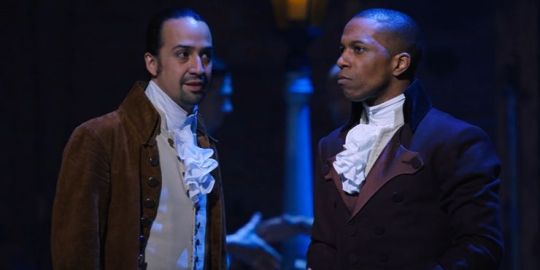
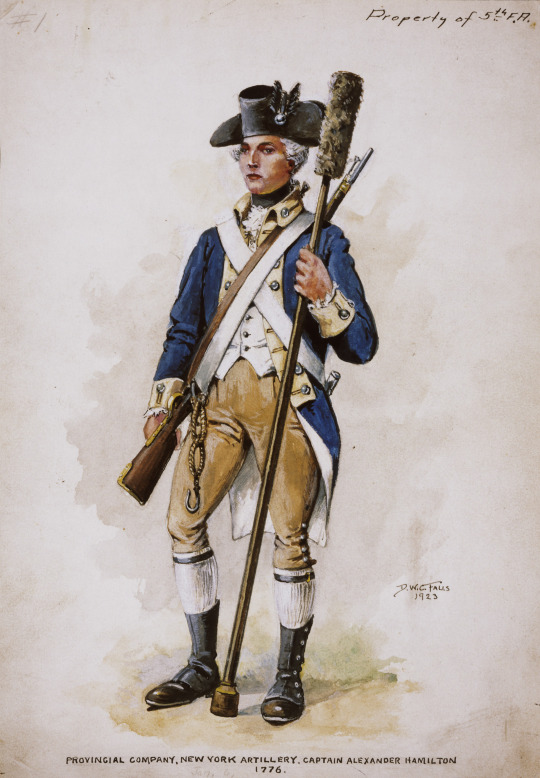
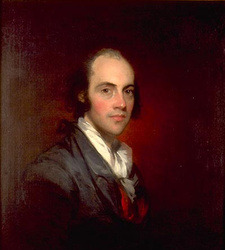
Images:
Top: Lin-Manuel Miranda and Leslie Odom Jr., courtesy of Disney Plus
Middle: Captain Alexander Hamilton of the Provincial Company NY Artillery; 1776 (artwork 1923), National Archives ID 542435
Lower: Portrait of Aaron Burr attributed to Gilbert Stuart
HAMILTON IN OUR RECORDS: Who Lives, Who Dies, Who Tells Your Story? Song 2: Aaron Burr, Sir
Today’s post, by Miriam Kleiman from the Public Affairs office, is the second in a series using archival records (largely from the National Archives Founders Online) to explore Hamilton’s life and legacy, song by song. Please note: given differing accounts of Hamilton’s birth year, stories use the 1755 date, with the 1757 date in parentheses.
The blockbuster musical’s catchy second number, “Aaron Burr, Sir,” could be the response to an AP US History Exam question:
Compare and contrast (in rap): Alexander Hamilton and Aaron Burr
The song opens in New York City in 1776, setting the stage for the coming drama by showing the first encounter of “young, scrappy and hungry” Hamilton and “prodigy of Princeton college” Burr, and underscoring the cavernous difference between the two in the following realms.
First impressions
From the start, Hamilton’s enthusiasm clashes with Burr’s haughtiness. Burr is evasive when Hamilton asks: “Are you Aaron Burr, Sir?” responding: “That depends, who’s asking?” Beyond thrilled to meet Burr, Hamilton enthusiastically solicits college and career advice: “Sir, I heard your name at Princeton” when “seeking an accelerated course of study.” Like Burr, he wanted to ”graduate in two, then join the revolution” and asks: “So how’d you do it, how’d you graduate so fast?” Burr responds: “It was my parent’s dying wish before they passed.”Burr also offers the following guidance: “Talk less… Smile more…”
Background
Though both orphans, the men are from vastly different backgrounds. Hamilton, as described by John Adams, was the “bastard brat of a Scotch Pedler” (letter of 1/25/1806) who immigrated from the Caribbean to America in 1772 at age 15 (13) lacking family, wealth, and connections. By contrast, Burr was born into early American aristocracy; his maternal grandfather was “Great Awakening” preacher Jonathan Edwards, his father helped establish the College of New Jersey (Princeton), and his father and grandfather were the second and third presidents of the school.
Education
Hamilton hoped to study at Princeton and was initially accepted, but was rejected when he sought to follow Burr’s lead and “graduate in two.” He says the bursar “looked at me like I was stupid” and admits he “may have punched him.”* Hamilton enrolled at Kings College (now Columbia) in 1774, but didn’t graduate.
Despite his unparalleled connections to the school, Burr was rejected when he first applied to Princeton (at age 11)! He was admitted two years later (age 13) with sophomore standing, excelled on the debate team, and graduated in two years. After college, he first studied theology and then law.
To the Revolution!
Hamilton became an activist at Kings College, speaking and writing in support of the Continental Congress and independence. He left school to “join the revolution” in 1775, started a volunteer military company, and was commissioned Captain of the New York Provincial Artillery Company in March 1776.
Following the Battle of Lexington and Concord, Burr put his legal studies on hold and “fast tracked” his military career. In July 1775, he traveled with another well-connected friend, Matthias Ogden, to the fledgling, month-old Continental Army camp in Cambridge, MA. Thanks to their impressive family networks, they personally met with General George Washington and presented themselves and a letter of introduction/recommendation from Continental Congress President John Hancock! General Washington reportedly had no officer appointments available but accepted both men as so called “gentlemen volunteers.“
*FUN FACT!
Hamilton met with Princeton president (and founding father) John Witherspoon, not a bursar. Also, there’s no record of violence. Miranda justified the need for artistic license: “Chernow blanched a bit at this historical leap-Hamilton wasn’t needlessly violent-but the rhyme [bursar and blur/Burr, sir] was too good to pass up.” Agreed, Mr. Burr, Sir?
ICYMI: Song 1, Alexander Hamilton
Stay tuned for Song 3, My Shot, and discover:
Does Hamilton socially advance or socially distance?
Can he help the new country “handle our financial situation”?
Do he and Burr prove they’re “worth more than anyone bargained for”?
Featured National Archives public program/video:
Historians on Hamilton: How a Blockbuster Musical is Restaging America’s Past, with opening remarks by Archivist of the United States David S. Ferriero.
More online:
Papers of Alexander Hamilton, Founders Online
Papers of Aaron Burr, Founders Online
Archives Displays Hamilton’s Documents in Exhibit Incorporating Musical’s Lyrics, National Archives News
Conversation with Chernow, Kail, and Miranda at the 2016 Records of Achievement Award Ceremony
From Alexander Hamilton to ‘Hamilton’—at the National Archives
Obscure fun fact: Romano and Kleiman were high school classmates and fellow speech/debate team members!
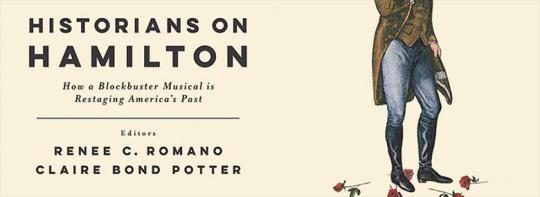

#hamilton#hamiltonmusical#alexander hamilton#support blm#linmanu#ronchernow#aaronburr#broadway#riseup#reneeromano#aburr#clairebondpotter#leslieodomjr
101 notes
·
View notes
Text
ana de armas, cis female, she/her — whenever i see alba rivas meandering down agnes street la escalera by pablo alborán starts to play inside my head. maybe it is the vibe they give off. bullet journals, colorful dresses, hairstyles with bandanas ; you know ? artistic impressions is what keeps them interested in agnes. i heard they are a thirty-three year old teacher at bright future. they look like the kind of person who would make you do a vision board.

hi again, it’s ella again. okay so i had cameron (the lily james) but tbh she’s a new muse and right now i don’t have the brain to develop a muse from scratch but i still want to write and that’s why i decided to bring alba, one of my oldest muses. i’m so happy to give her a new home and i can’t wait for her to meet all of your characters.
basics
NAME: alba carolina rivas borges
NICKNAME: al, albie
GENDER: cis female
PLACE OF BIRTH: boca raton, florida
DATE OF BIRTH: april 19, 1988
AGE: thirty-thirty
SEXUAL ORIENTATION: bisexual
OCCUPATION: teacher at bright future
background
tw: illness, cheating
CHILDHOOD
her story starts between cuba and spain. her mother, carolina, fled from cuba and her father immigrated from spain with no friends or family and only with a few dollars. the two newcomers were matched by fate and just a year later they welcomed their daughter, alba.
two years later, a son completed the rivas family. they didn’t have much and often had to deal with homesickness and many times they considered moving to spain, but eventually they decided to stay.
it was a big change for both julián and carolina. he used to work as a lawyer back in spain and carolina had almost graduated from med school. now in the united states they both had to start from zero.
her mother traveled an hour from boca raton to palm spring every day where she worked cleaning those luxurious houses. her father got his credentials to become a spanish teacher and taught in the local high school.
alba always knew she didn’t have much. she grew up going with her mom to those huge houses and from a young age she understood what wealth could buy. however, alba never envied those who had a lot more than her. in fact, her childhood best friend was the girl that lived in the house her mother cleaned. the two were inseparable.
ADOLESCENCE AND COLLEGE YEARS
alba excelled as a student. education was something her parents always deemed as important and so she made it her goal to make them proud.
she earned a spot in a prestigious public high school. as a teenager, she was the model child. always listening to her parents, rarely giving them problems. she had an active social life, she went on a couple of dates and she was part of several groups.
these qualities eventually earned her a place at nyu. moving to new york was something she’d never considered. she liked florida, and her family were there but her parents convinced her that this would be a great opportunity and that she could comeback.
becoming a teacher was her ambition. she admired her father for doing it and she knew from a young age that she wanted to teach children.
to make ends meet, she got a job as a waitress and she really didn’t have a social life as she worked and studied full time. there was no time for friendship and even less time for dating.
it was during one day at work that she met someone that changed her life. she met another student while she was working who asked her out but she refused, however, he came back and did the same thing every night until one day she finally accepted.
one date turned into two and then three until soon people couldn’t see one without the other. most people thought they wouldn’t last, their personalities and values were too different. he came from a wealthy family, the typical spoiled kid that was set to inherit his parents’ fortune someday, the one that always featured on page six with a different woman every night. meanwhile, alba came from a working-class family, daughter of immigrants who always had to work to get what she had in life. despite the skepticism, they proved everyone wrong.
at twenty-two, alba graduated with a degree in early childhood education and began working as a teacher.
ADULTHOOD
her relationship with this guy (i dont have a name for him lmao) was better than ever and after dating for three years, he proposed and alba said yes as she was convinced she’d found her other half.
however, not everything was perfect. his family didn’t like her and things only got worse after they got engaged. the couple married only a year later. they left new york and moved to florida where they bought one of those houses alba always had dreamed to have and the best part is that they were neighbors with her childhood best friend.
but all good things must come to an end, and soon her fairytale turned into a nightmare. the relationship with her in-laws was awful which eventually caused tension in their marriage. they began to fight more often and he started to spend more time at his office than at home. however, she was determined to make their marriage work, a love like theirs couldn’t end like this, she wouldn’t allow it.
tw cheating: one day, alba returned to their home early and what she saw was heartbreaking. there he was, in bed with none other but her childhood best friend. heartbroken, alba refused to accept any of his excuses and immediately filed for divorce, to the joy of her in-laws. end of tw.
after her divorce, alba moved to california where she started a year course at stanford. she planned to stay there but that when she received news from home.
tw illness: her father was very sick, and her parents had decided to move to islebury, rhode island. without anything holding her back, she packed up her stuff and moved here as well so she could help her mother with her dad. end of tw.
she’s been living here for three years now and works as a teacher at bright future.
personality
She has the ability to see the good in almost anyone or anything and tends to sympathize with even the most unfriendly person. She often hides the extreme depth of feelings from her, even from herself, until circumstances elicit a passionate response.
She has a deep sense of idealism that comes from a strong personal sense of right and wrong. She sees the world as a place full of possibilities and potentials and is governed by her intuition. She is quite reserved and is not easily manipulated.
She is a good listener and considerate, they try to care for and understand others in a deep way. She can be very calm and intuitive with the people around her, being able to search for hidden meanings in the actions and words of others.
Of course, all of life is not rosy and Alba is not exempt from suffering the same disappointments and frustrations that are common to others. She tends to be a perfectionist and often strives for personal ideals that can be exhausting or very difficult to obtain.
headcanons
she’s a bookworm. her favorite book is the persuasion by jane austen
she speaks fluent spanish
alba has a beautiful white persian cat named nube
she loves wearing bandanas in her hair
claims she’s allergic to strawberries, she’s not. she just hates them and that’s easier than explaining why
connections
Younger brother: I’m gonna make a wanted connection because I love this dynamic. He is two years younger than her and she adores him. She tries to stay in touch with him and in general, they are close.
Ex-best friend: they met as children and grew up together, they knew everything about the other. alba’s mother worked as a housekeeper and she used to go with her sometimes, that’s how they met. this person came from a different background, she lived in one of those expensive houses alba could only dream to own. their friendship was so strong that they even applied to the same university (although her friend was not accepted). alba considered this person as the sister she never had, but then she did the worst thing in the world, she slept with alba’s husband. they haven’t spoken since she found out.
Ex-husband: They divorced two years ago, after alba found out he had been cheating on her with her best friend. they met while she was a student at NYU and were together for three years before getting engaged and married. he comes from a wealthy family, the typical perfect american family. their relationship was never approved by his parents. she hasn’t spoken to him since the divorce.
Best Friendish: Okay, so this is a tricky one because her actual best friend turned into Judas and slept with her husband, but maybe this person is the closest she has to a best friend. she trusts this person and since her divorce, this is the only person that she has been able to speak without limitations.
Bad influence: Alba has never been one to go to many parties or even to drink, but this person is the only one that can convince her to have a good time.
Co-workers/Parents: She works as a teacher at bright future, maybe your character works there or their kids go/went there.
Neighbor: self-explanatory
Unlikely friendship: The two have different personalities, but somehow, both have managed to get along and form a weird friendship.
Hook ups: She’s not really the relationship kind bc she’s always busy but once in a while she hooks up with people ghdghdhgd (open to everyone)
Flirtationship: they act like friends, but cannot help to throw flirty looks or comments at each other.
Unrequited: It could go either way, I’m fine to plot it out. I’m an angst hoe sooo
Bad tinder date: after her divorce, her friends tried to set her up with someone but it didn’t go well. There was nothing wrong about her date, but she wasn’t ready and in the end it was a very uncomfortable situation for them.
One night stand: she was drunk, he/she was drunk too. They didn’t plan it but happened and now whenever they see each other in town it’s a bit awkward.
7 notes
·
View notes
Text
Flatbush & Atlantic: part i
Quick note: This is taking place in the 2020-21 season, as if the Islanders still play at Barclays; I know they won’t in actuality. In the story, I’m also going to be taking some liberties with what the duties of a team’s general counsel and legal team would actually be in charge of. My understanding, as a pre-law student, is that it’s more on the corporate angle, dealing with contracts and stuff — in addition to that, Cass will also be dealing with some more immigration and employment law as well.
part i
October 1
“Adiós, mamá. Hablamos pronto. Te amo.” Cassidy hung up, breathing out a tense sigh and rubbing her temples with the heels of her hands. Talking to her mom usually helped to calm her down, bring her back to Earth, but for whatever reason it wasn’t taking. She took a brief glance at the casebook open on her dinged-up Ikea desk. Federal Indian Law. She liked the class, genuinely, but her day had started off bad and gotten worse pretty damn quickly. First she was out of her favorite tea, then her advisor cancelled their meeting, then it started raining as she walked back to her MTA stop, so she had missed the train. Another came fifteen minutes later, but the damage was already done. The only bright spot in the day, aside from calling her mom, had been the cute guy at the Polish deli down the street who had put extra peppers on her Philly cheesesteak. She unwrapped the sandwich, taking a moody bite out of the end. A caramelized onion dropped to the floor. Sighing, she leaned down to pick it up, hurtling it in the direction of the trashcan but only half-looking to see if it reached its target destination. Despite the name, Cass had never had a cheesesteak before she moved to New York, and it wasn’t even because she wasn’t a sandwich person. No, Cass loved a good sandwich, but between her proclivity towards a good BLT and her mom’s homemade Mexican food, she just hadn’t gotten around to it.
Her laptop dinged with an email notification. What now? She swiped over to the mail page, taking another bite as she read the subject line. Experiential learning requirement - unmet. Her brow furrowed. Unmet? Clicking it open, she scanned the email, clearly something automated from the registrar’s office. Yet to complete Columbia’s experiential learning requirement...We suggest you connect with professors...You have until October 8 to submit...Cassidy never finished her sandwich. “Oh my God,” she muttered to herself, feeling her cheeks heat up. “How could you do this? How could you be so stupid, Cass?” She was normally so on top of everything, never missed a date, never forgot an assignment, so how could she have missed one of the only things left to do to graduate? Her law school required all of the graduates to complete some sort of experiential learning requirement — some kind of externship, clinic, summer associate position, anything to get them “out in the real world.” That’s when it hit her. She had coached her high school’s mock trial team the summer after her first year, and interned at the Hartford County DA’s the summer after. But they paid her. Her school had a weird ‘double-dip’ policy, where you weren’t allowed to take a position for class credit and get paid at the same time. It was a confusing rule, convoluted and bizarre and probably a little bit elitist, but it was a rule. As if the day couldn’t get any worse, and then somehow it did.
Turning to her laptop, she started searching for just about anything that could possibly help her. The school’s website, the Manhattan District Attorney’s, state offices, NGOs, federal prosecutors, anyone that might have a lead. Frantically dragging over her resumé and throwing together a cover letter that probably (hopefully) looked way more interesting than it actually was, Cassidy fired off email after email after email. Two hours later, she had sent off some twenty-odd applications, hoping that at least one or two would end up panning out. Glancing at her watch, she let out an exasperated breath. 12:22 A.M. Her classes didn’t start until nine, but it took almost an hour and a subway connection to get to Columbia, and she had to eat and shower before. So, really, it meant getting up at about seven. She needed to go to bed.
Stomach reeling and feeling more resigned than anything, Cass haphazardly brushed her teeth, flossed — it didn’t matter how tired she was, she’d never forget to floss — and clambered into bed, wearing a faded, way-too-big Rangers t-shirt. I’ll be okay. She took a deep breath. It’ll be okay. It has to be. Cassidy Cabrera Shaw was tough as nails and stubborn as hell, and she wasn’t going to let everything she had worked so hard for fall apart so easily.
Whenever Cass was nervous, or anxious, or afraid, she was never able to sleep well. She ended up waking up at ten past six, sitting in her bed for fifteen minutes praying that she’d fall back asleep, and finally accepting her fate that sleep just wasn’t going to come. Rolling over, she grabbed her phone from where she had left it charging on the nightstand. Nightstand was maybe a generous term for it; technically, it was a wooden milk crate that she had spray painted white when she and the other girls had moved into the apartment two years prior. She had a little bit of money set aside from college, but every penny possible was going towards tuition and those ungodly-expensive books that she had to buy every semester. The mattress and frame were from Ikea, and Cass had brought some things like bedding and a desk from her old room. The rest of it — rugs, lighting, and decorations like her six-inch ceramic peacock (his name was Charles) had come from a combination of Goodwill runs and senior citizen yard sales.
Wincing as she did so, Cass pulled up her email, bracing herself for the inevitable barrage of rejection. After scrolling past ten or so automated “no longer hiring” and “position has been filled” messages, one caught her eye. She had sent a few emails to professors of hers, not expecting to hear anything back for a few days. It wasn’t perfect by any means, but there certainly were advantages of going to school in a city as massive as New York. All of her professors knew someone and had some kind of connection from their own education, or days in the practice, or childhood summer trips to the Hamptons with someone who just so happened to be a judge on the Second Circuit Court — that last one was last year’s employment law professor. One particular subject line caught her eye. Thought you might be interested, Professor Murakami had written. David, as he preferred to be called, was her Sports Law professor from last year. She didn’t go into the class expecting to enjoy it all that much, if she was being honest. She had gotten a crappy registration time and most other classes were filled, so it had started out as a placeholder and nothing more. Over the semester, though, it had quickly become one of her favorites, combining pieces of everything else she had studied into one cohesive course. Cass also wasn’t in a position to be turning down any potential offers, so she opened the email and started reading.
I got your email, Cassidy, and think I might be able to help. Okay, so far, so good. I happen to have a contact in the counsel’s office of one of the professional sports teams in the city. That’s exactly what Cass was talking about — where do these people meet each other? Is there some kind of exclusive speakeasy you’re given the password to as soon as you’re admitted to the state bar? Chris Cohen works for the Islanders, and I remember you talking about how interested in hockey you are. Okay, true, but the Islanders? She had practically been born with a Ranger’s jersey on. Beggars can’t be choosers, she thought. I gave him a heads-up that I’d likely be sending a promising candidate his way, so just let me know if this sounds like something you’d be interested in and I’ll send along your contact information.
Cass couldn’t respond fast enough. Yes, please!
---
Wednesdays were her ‘easy’ days, if you could say that. She had Environmental Law and Human Rights back-to-back, but anything after noon was pretty much fair game. That being said, it certainly didn’t mean that she was any less stressed. There were at least a hundred pages to read before class the next day, she had a sample essay due for bar prep, and her mind was still racing about the email. Grabbing a gyro from the cart outside of her last class of the day, Cass stress-ate with one hand while continually refreshing her inbox with the other. Food wasn’t allowed in the library, so she ate the last few bites right outside the doors, throwing away the wrapper and squeezing past the hordes of clearly overwhelmed first-years running to get to class on time.
Popping her Airpods out of their case and into her ears, Cass briskly made her way up the stairs to the third floor, crossing her fingers that her usual spot, a big blue chair over by the research desk, was open. She was in luck, pulling out a water bottle and laptop and getting to work on editing. Four hours later, she had reached some semblance of satisfaction with her work, shutting off her computer and making her way to the subway. There was about half an hour before she had to transfer to the line that would take her to the apartment; squeezing into one of the last free seats, she tugged out a textbook and a highlighter. Why her professor insisted on assigning the entire text of the United Nations charter was a mystery to her, but she’d rather jump off a cliff than be cold called on without an answer. Transferring at Grand Concourse took about ten minutes — it was rush hour, so the first train to come was entirely full — and another twenty or so minutes later, she was letting herself into her shared East Bronx apartment.
Hanging up her denim jacket by the door and toeing off her sneakers, Cass let out a not-so-subtle exasperated sigh.
“One of those days?” Alicia piped in from the kitchen. Alicia also lived in the apartment, one of the four sorority sisters-turned-roommates who had made the move from Connecticut down to New York after graduation. Cass padded into the kitchen, where she was greeted by Alicia in front of a skillet and rice cooker, intensely sautéeing some vegetables.
“You have no idea,” Cass said, hugging her from behind. “Whatcha making?” There were obviously some nights when not everyone was home — most often either Cass or Ryanne, who was in med school — but they always tried to have a few nights a week where someone would cook a meal for the whole house.
“Japchae, it’s my mom’s recipe,” she replied. “I called her and asked how much sesame oil to use, and she just said ‘until it tastes right.’ Like, I love you, Mom, but that doesn’t really help my cause, does it?”
Cass snorted. “Oh for sure, it’s the same way with me. Do you remember the first time I made tamales down here?” Cass had grown up eating and making tamales with her mom and abuela, but she had never been allowed to really take the reins. She had the recipe, though, so the first night after they were moved in, she ventured down to the closest bodega, bought the ingredients, and decided to try her hand making them from scratch. The recipe, however, left out the key piece of exactly how much water to use for steaming — Cass didn’t know, and her mom had always just eyeballed it. So she had ended up putting in way too little and setting the stove way too hot, and to make a long story short, ended up setting off the fire alarm. The one saving grace was the extremely attractive police office that came to double-check the false alarm, but even he couldn’t wipe the mortified expression off of her face.
“How could I forget?” Alicia responded with a grin. “Go put your shit down, it’ll be ready in a few.”
Cass playfully rolled her eyes, heading towards her room in the back. “Yes, mother.” Their apartment was a three bedroom; while obviously it would have been amazing for everyone to have their own, it was still New York City and none of them were exactly rolling in the dough. Cassidy and Ryanne were obviously still students, and while Alicia and Stella had actual jobs — Stella worked international business down by Wall Street and Alicia did something with satellites in Queens — none of them were exactly inclined to set out on their own just yet. So Stella and Alicia shared a room, and she and Ryanne had their own. She shrugged off her jacket, slinging her backpack onto the bed before chugging the rest of her water bottle and checking her phone. Two new emails. A 20% off coupon to Lush, and one from Chris Cohen. Chris Cohen? It took her a minute to remember, but when she did, she couldn’t read it fast enough.
Honestly, Cass didn’t read the whole thing, but got enough information to know that she had an interview Friday afternoon at the office in Brooklyn, that Chris — he had said to call him Chris — said she came with a stellar recommendation from Professor Murakami (an old law school buddy, figures) and that there was no way in hell she was going to fuck this up. She wouldn’t let herself.
---
Cass was lucky her Thursdays were so packed; if she had any extra time to stress over her impending interview, she would have, but she couldn’t. She had two ‘free’ hours in between classes, but after she had scarfed down lunch (Alicia had, mercifully, made plenty of leftovers) it was the only stretch she had to hit the gym. Coupled with the time it took to walk there, change, and shower after, there really wasn’t much in the way of downtime. After classes was her bar prep group, and the day was so exhausting that it was pretty much all she could manage to take the train home, microwave dinosaur chicken nuggets, and stumble into bed. After flossing.
---
If Cassidy lived in any other city, she would have felt wildly out of place on her morning commute. Who shows up to school wearing a suit? She wasn’t an absolute masochist, so her heels were in her bag. But for once in her life she didn’t feel so out of place among the presumably-highbrow, presumably-making-six-figures crowd surrounding her. The suit had been her first big purchase for herself — she had scraped by without one in college, but invested as soon as she had a little saved up from her summer job at a boutique in town. Her mother had always told her that it was the woman who made the clothes, rather than the other way around, and Cass always did what her mom said.
Samaira, one of her friends and another editor on the Columbia Law Review, caught up to her as they both left the twice-weekly morning meeting. “You seem kind of jumpy, Cass. What’s up?”
Cassidy wrung her hands and shrugged her shoulders. “I told you that I missed the internship requirement thing, right?” Samaira nodded. “Well, I have an internship in,” she paused to look at her watch, “two hours, and I��m so nervous I’m going to mess this up. I don’t know what I’m going to do if I don’t get it. There’s not time to look for something else, there’s no alternative, and I don’t know what to do if my own stupidity and forgetfulness is the only thing standing in between me and something I’ve worked so fucking hard for—”
Samaira cut her off. “I’m going to stop you there. That’s bull, Cass, and you know it. You are the furthest thing from a disappointment. You’re one of the kindest, sharpest, and most creative people I know, and you’re not going to let something as petty as a deadline stand in your way. Time gets away from all of us sometimes, and it’s nothing to beat yourself up over. I want you to be confident and have faith in yourself, because you deserve it, but if you don’t, it’s okay. I get it. I believe in you enough for the both of us.” She squeezed Cass’ hand.
She managed a watery smile. “Thanks, Samaira.”
“Any time,” she replied easily. “I’ve got to run to class now, but I want to hear how it went the second you get out, okay?”
“I will.”
Samaira rolled her eyes. “I mean it. You’re going to crush this, Cass. Love you!” She added, waving goodbye as she turned the corner.
There was half an hour before Cass needed to head over to the interview, and before she knew it her feet had taken her to her favorite spot on the north side of Central Park. Grabbing a bagel, she thankfully found the bench empty. After finishing the bagel — she would have preferred cheese, but they were out, so cinnamon raisin it was — and the better part of her Hozier-dominated acoustic playlist, it was time to catch the train. She jumped on with barely a second to spare, grabbing a strap and trying to avoid bumping into anyone.
A seat opened up about halfway to Brooklyn, and Cass took the opportunity to unceremoniously tug off her much more practical flats and switch into the much more professional ankle-strap heels that had been stuffed in her backpack all day. For a fleeting moment, she was worried what everyone around her would think; she was, after all, technically changing on public transportation. A man got on at the next stop who was dressed head-to-toe in neon orange while carrying a Pomeranian in his purse. Nobody batted an eye. She got over herself pretty quickly.
Getting off at the Barclays Center station, Cass pulled out her phone, opening up the camera to give herself a quick once-over. As much as she hated it, first impressions really were everything. Lipstick? Not smudged. Hair? Minimal flyaways. Teeth? No spinach to be seen. Triple-checking that she had the time right, Cass walked through the doors of the office building, Islanders logo emblazoned on the wall behind the secretary’s desk.
“Hi,” she said tentatively, catching his attention. “I have an interview with Chris Cohen at 2?”
The secretary nodded, smiling warmly at her. “No problem. I’m Josh, you can have a seat over there,” he nodded to the small waiting area off to the side, “and I’ll call you when he’s ready for you to be sent up.”
Cass didn’t wait for more than five minutes before Josh gave her the go-ahead, and she was soon headed up the elevator to Chris’ office. “Fourth door on the left. It should have his name on it,” Josh had added.
She raised her fist, knocking quickly on the frosted glass. It swung open a second later, a kind-looking man with glasses and salt-and-pepper hair answering. “You must be Cassidy. I’m Chris Cohen, so nice to meet you. Come right in,” he said, ushering her through the room, where several other associates sat at desks, and into his office.
“David’s always good at keeping an eye out for me in his courses, and I was happy he passed you along,” Chris said, pulling out her resumé. “And you’re a 3L, correct?” She nodded. “Good. So let’s dive right into it. What courses and work experience do you have that you feel best position you for success in this position?” Much though Cass was loath to admit it, if there was anything she was good at, it was talking herself up. There was a reason her high school superlative was “Most Likely to be Able to Talk Their Way Out of a Ticket.” She launched into a well-rehearsed response, making sure to lace in her love for hockey once or twice. If nothing else, it would hopefully at least get her some brownie points. He had a few questions about her resumé, asked about her work on the law review, a few hypotheticals about contract law. She was batting a thousand until he asked the dreaded final question. “Do you have any questions for me?”
Cass was wracking her brain, trying to come up with some intelligent-sounding thing to ask, but nothing came. “Uh—” she started, but was saved by the bell. Or, rather, saved by a frantic door opening and a panicked-sounding Mat Barzal bursting into the room. “Chris, I’ve got a problem.”
#hockey imagine#hockey#nhl imagine#mat barzal#mat barzal imagine#nhl#hockey writing#nhl writing#hockey imagines#nhl imagines#islanders#mat barzal imagines
91 notes
·
View notes
Text
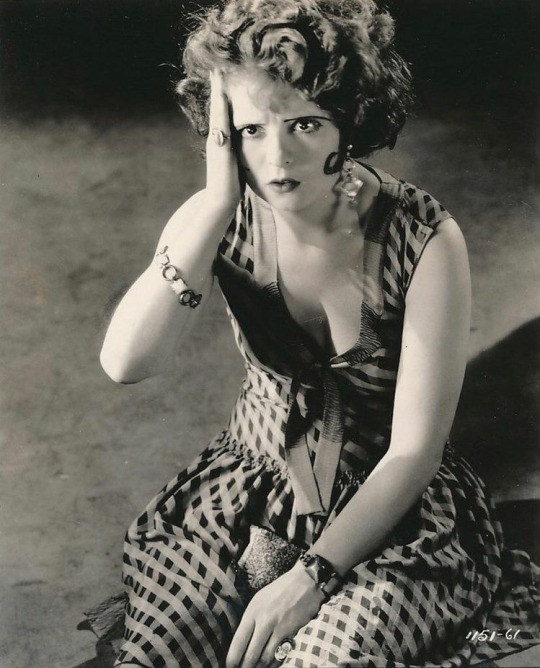
Clara Gordon Bow (July 29, 1905 – September 27, 1965) was an American actress who rose to stardom in silent film during the 1920s and successfully made the transition to "talkies" in 1929. Her appearance as a plucky shopgirl in the film It brought her global fame and the nickname "The It Girl". Bow came to personify the Roaring Twenties and is described as its leading sex symbol.
Bow appeared in 46 silent films and 11 talkies, including hits such as Mantrap (1926), It (1927), and Wings (1927). She was named first box-office draw in 1928 and 1929 and second box-office draw in 1927 and 1930. Her presence in a motion picture was said to have ensured investors, by odds of almost two-to-one, a "safe return". At the apex of her stardom, she received more than 45,000 fan letters in a single month (January 1929).
Two years after marrying actor Rex Bell in 1931, Bow retired from acting and became a rancher in Nevada. Her final film, Hoop-La, was released in 1933. In September 1965, Bow died of a heart attack at the age of 60.
Bow was born in Prospect Heights, Brooklyn at 697 Bergen Street,[9] in a "bleak, sparsely furnished room above [a] dilapidated Baptist Church". Her birth year, according to the US Censuses of 1910 and 1920, was 1905. The 1930 census indicates 1906 and on her gravestone of 1965, the inscription says 1907, but 1905 is the accepted year by a majority of sources.
Bow was her parents' third child, but her two older sisters, born in 1903 and 1904, had died in infancy. Her mother, Sarah Frances Bow (née Gordon, 1880–1923), was told by a doctor not to become pregnant again, for fear the next baby might die as well. Despite the warning, Sarah became pregnant with Clara in late 1904. In addition to the risky pregnancy, a heat wave besieged New York in July 1905, and temperatures peaked around 100 °F (38 °C). Years later, Clara said: "I don't suppose two people ever looked death in the face more clearly than my mother and I the morning I was born. We were both given up, but somehow we struggled back to life."
Bow's parents were descended from English, Irish and Scottish immigrants who had come to America the generation before. Bow said that her father, Robert Walter Bow (1874–1959), "had a quick, keen mind ... all the natural qualifications to make something of himself, but didn't...everything seemed to go wrong for him, poor darling". By the time Clara was four and a half, her father was out of work, and between 1905 and 1923, the family lived at 14 different addresses, but seldom outside Prospect Heights, with Clara's father often absent. "I do not think my mother ever loved my father", she said. "He knew it. And it made him very unhappy, for he worshiped her, always."
When Bow's mother, Sarah, was 16, she fell from a second-story window and suffered a severe head injury. She was later diagnosed with "psychosis due to epilepsy". From her earliest years, Bow had learned how to care for her mother during the seizures, as well as how to deal with her psychotic and hostile episodes. She said her mother could be "mean" to her, but "didn't mean to ... she couldn't help it". Still, Bow felt deprived of her childhood; "As a kid I took care of my mother, she didn't take care of me". Sarah worsened gradually, and when she realized her daughter was set for a movie career, Bow's mother told her she "would be much better off dead". One night in February 1922, Bow awoke to a butcher knife held against her throat by her mother. Clara was able to fend off the attack, and locked her mother up. In the morning, Bow's mother had no recollection of the episode, and later she was committed to a sanatorium by Robert Bow.
Clara spoke about the incident later:
It was snowing. My mother and I were cold and hungry. We had been cold and hungry for days. We lay in each other's arms and cried and tried to keep warm. It grew worse and worse. So that night my mother—but I can't tell you about it. Only when I remember it, it seems to me I can't live.
According to Bow's biographer, David Stenn, Bow was raped by her father at age sixteen while her mother was institutionalized. On January 5, 1923, Sarah died at the age of 43 from her epilepsy. When relatives gathered for the funeral, Bow accused them of being "hypocrites", and became so angry that she even tried to jump into the grave.
Bow attended P.S. 111, P.S. 9, and P.S. 98.[13] As she grew up, she felt shy among other girls, who teased her for her worn-out clothes and "carrot-top" hair. She said about her childhood, "I never had any clothes. ... And lots of time didn't have anything to eat. We just lived, that's about all. Girls shunned me because I was so poorly dressed."
From first grade, Bow preferred the company of boys, stating, "I could lick any boy my size. My right arm was quite famous. My right arm was developed from pitching so much ... Once I hopped a ride on behind a big fire engine. I got a lot of credit from the gang for that."[15] A close friend, a younger boy who lived in her building, burned to death in her presence after an accident. In 1919, Bow enrolled in Bay Ridge High School for Girls. "I wore sweaters and old skirts...didn't want to be treated like a girl...there was one boy who had always been my pal... he kissed me... I wasn't sore. I didn't get indignant. I was horrified and hurt."
Bow's interest in sports and her physical abilities led her to plan for a career as an athletics instructor. She won five medals "at the cinder tracks" and credited her cousin Homer Baker – the national half-mile (c.800 m) champion (1913 and 1914) and 660-yard (c. 600 m) world-record holder – for being her trainer. The Bows and Bakers shared a house – still standing – at 33 Prospect Place in 1920.
In the early 1920s, roughly 50 million Americans—half the population at that time—attended the movies every week. As Bow grew into womanhood, her stature as a "boy" in her old gang became "impossible". She did not have any girlfriends, and school was a "heartache" and her home was "miserable." On the silver screen, however, she found consolation; "For the first time in my life I knew there was beauty in the world. For the first time I saw distant lands, serene, lovely homes, romance, nobility, glamor". And further; "I always had a queer feeling about actors and actresses on the screen ... I knew I would have done it differently. I couldn't analyze it, but I could always feel it.". "I'd go home and be a one girl circus, taking the parts of everyone I'd seen, living them before the glass." At 16, Bow says she "knew" she wanted to be a motion pictures actress, even if she was a "square, awkward, funny-faced kid."
Against her mother's wishes but with her father's support, Bow competed in Brewster publications' magazine's annual nationwide acting contest, "Fame and Fortune", in fall 1921. In previous years, other contest winners had found work in the movies. In the contest's final screen test, Bow was up against an already scene-experienced woman who did "a beautiful piece of acting". A set member later stated that when Bow did the scene, she actually became her character and "lived it". In the January issues 1922 of Motion Picture Classics, the contest jury, Howard Chandler Christy, Neysa McMein, and Harrison Fisher, concluded:
She is very young, only 16. But she is full of confidence, determination and ambition. She is endowed with a mentality far beyond her years. She has a genuine spark of divine fire. The five different screen tests she had, showed this very plainly, her emotional range of expression provoking a fine enthusiasm from every contest judge who saw the tests. She screens perfectly. Her personal appearance is almost enough to carry her to success without the aid of the brains she indubitably possesses.
Bow won an evening gown and a silver trophy, and the publisher committed to help her "gain a role in films", but nothing happened. Bow's father told her to "haunt" Brewster's office (located in Brooklyn) until they came up with something. "To get rid of me, or maybe they really meant to (give me) all the time and were just busy", Bow was introduced to director Christy Cabanne, who cast her in Beyond the Rainbow, produced late 1921 in New York City and released February 19, 1922. Bow did five scenes and impressed Cabanne with true theatrical tears, but was cut from the final print. "I was sick to my stomach," she recalled and thought her mother was right about the movie business.
Bow, who dropped out of school (senior year) after she was notified about winning the contest, possibly in October 1921, got an ordinary office job. However, movie ads and newspaper editorial comments from 1922 to 1923 suggest that Bow was not cut from Beyond the Rainbow. Her name is on the cast list among the other stars, usually tagged "Brewster magazine beauty contest winner" and sometimes even with a picture.
Encouraged by her father, Bow continued to visit studio agencies asking for parts. "But there was always something. I was too young, or too little, or too fat. Usually I was too fat." Eventually, director Elmer Clifton needed a tomboy for his movie Down to the Sea in Ships, saw Bow in Motion Picture Classic magazine, and sent for her. In an attempt to overcome her youthful looks, Bow put her hair up and arrived in a dress she "sneaked" from her mother. Clifton said she was too old, but broke into laughter as the stammering Bow made him believe she was the girl in the magazine. Clifton decided to bring Bow with him and offered her $35 a week. Bow held out for $50 and Clifton agreed, but he could not say whether she would "fit the part". Bow later learned that one of Brewsters' subeditors had urged Clifton to give her a chance.
Down to the Sea in Ships, shot on location in New Bedford, Massachusetts and produced by independent "The Whaling Film Corporation", documented life, love, and work in the whale-hunter community. The production relied on a few less-known actors and local talents. It premiered at the Olympia Theater in New Bedford, on September 25, and went on general distribution on March 4, 1923. Bow was billed 10th in the film, but shone through:
"Miss Bow will undoubtedly gain fame as a screen comedienne".
"She scored a tremendous hit in Down to the Sea in Ships..(and).. has reached the front rank of motion picture principal players".
"With her beauty, her brains, her personality and her genuine acting ability it should not be many moons before she enjoys stardom in the fullest sense of the word. You must see 'Down to the Sea in Ships'".
"In movie parlance, she 'stole' the picture ... ".
By mid-December 1923, primarily due to her merits in Down to the Sea in Ships, Bow was chosen the most successful of the 1924 WAMPAS Baby Stars. Three months before Down to the Sea in Ships was released, Bow danced half nude, on a table, uncredited in Enemies of Women (1923). In spring she got a part in The Daring Years (1923), where she befriended actress Mary Carr, who taught her how to use make-up.
In the summer, she got a "tomboy" part in Grit, a story that dealt with juvenile crime and was written by F. Scott Fitzgerald. Bow met her first boyfriend, cameraman Arthur Jacobson, and she got to know director Frank Tuttle, with whom she worked in five later productions. Tuttle remembered:
Her emotions were close to the surface. She could cry on demand, opening the floodgate of tears almost as soon as I asked her to weep. She was dynamite, full of nervous energy and vitality and pitifully eager to please everyone.
Grit was released on January 7, 1924. The Variety review said "... Clara Bow lingers in the eye, long after the picture has gone."
While shooting Grit at Pyramid Studios, in Astoria, New York, Bow was approached by Jack Bachman of independent Hollywood studio Preferred Pictures. He wanted to contract her for a three-month trial, fare paid, and $50 a week. "It can't do any harm,"[15] he tried. "Why can't I stay in New York and make movies?" Bow asked her father, but he told her not to worry.
On July 21, 1923, she befriended Louella Parsons, who interviewed her for The New York Morning Telegraph. In 1931, when Bow came under tabloid scrutiny, Parsons defended her and stuck to her first opinion on Bow:
She is as refreshingly unaffected as if she had never faced a means to pretend. She hasn't any secrets from the world, she trusts everyone ... she is almost too good to be true ... (I) only wish some reformer who believes the screen contaminates all who associate with it could meet this child. Still, on second thought it might not be safe: Clara uses a dangerous pair of eyes.
The interview also revealed that Bow already was cast in Maytime and in great favor of Chinese cuisine.
On July 22, 1923, Bow left New York, her father, and her boyfriend behind for Hollywood. As chaperone for the journey and her subsequent southern California stay, the studio appointed writer/agent Maxine Alton, whom Bow later branded a liar. In late July, Bow entered studio chief B. P. Schulberg's office wearing a simple high-school uniform in which she "had won several gold medals on the cinder track". She was tested and a press release from early August says Bow had become a member of Preferred Picture's "permanent stock". Alton and she rented an apartment at The Hillview near Hollywood Boulevard. Preferred Pictures was run by Schulberg, who had started as a publicity manager at Famous Players-Lasky, but in the aftermath of the power struggle around the formation of United Artists, ended up on the losing side and lost his job. As a result, he founded Preferred in 1919, at the age of 27.
Maytime was Bow's first Hollywood picture, an adaptation of the popular operetta Maytime in which she essayed "Alice Tremaine". Before Maytime was finished, Schulberg announced that Bow was given the lead in the studio's biggest seasonal assessment, Poisoned Paradise,[51] but first she was lent to First National Pictures to co-star in the adaptation of Gertrude Atherton's 1923 best seller Black Oxen, shot in October, and to co-star with Colleen Moore in Painted People, shot in November.
Director Frank Lloyd was casting for the part of high-society flapper Janet Oglethorpe, and more than 50 women, most with previous screen experience, auditioned. Bow reminisced: "He had not found exactly what he wanted and finally somebody suggested me to him. When I came into his office a big smile came over his face and he looked just tickled to death." Lloyd told the press, "Bow is the personification of the ideal aristocratic flapper, mischievous, pretty, aggressive, quick-tempered and deeply sentimental." It was released on January 4, 1924.
The New York Times said, "The flapper, impersonated by a young actress, Clara Bow, had five speaking titles, and every one of them was so entirely in accord with the character and the mood of the scene that it drew a laugh from what, in film circles, is termed a "hard-boiled" audience", while the Los Angeles Times commented that "Clara Bow, the prize vulgarian of the lot ... was amusing and spirited ... but didn't belong in the picture", and Variety said that "... the horrid little flapper is adorably played ..."
Colleen Moore made her flapper debut in a successful adaptation of the daring novel Flaming Youth, released November 12, 1923, six weeks before Black Oxen. Both films were produced by First National Pictures, and while Black Oxen was still being edited and Flaming Youth not yet released, Bow was requested to co-star with Moore as her kid sister in Painted People (The Swamp Angel). Moore essayed the baseball-playing tomboy and Bow, according to Moore, said "I don't like my part, I wanna play yours." Moore, a well-established star earning $1200 a week—Bow got $200—took offense and blocked the director from shooting close-ups of Bow. Moore was married to the film's producer and Bow's protests were futile. "I'll get that bitch", she told her boyfriend Jacobson, who had arrived from New York. Bow had sinus problems and decided to have them attended to that very evening. With Bow's face now in bandages, the studio had no choice but to recast her part.
During 1924, Bow's "horrid" flapper raced against Moore's "whimsical". In May, Moore renewed her efforts in The Perfect Flapper, produced by her husband. However, despite good reviews, she suddenly withdrew. "No more flappers ... they have served their purpose ... people are tired of soda-pop love affairs", she told the Los Angeles Times, which had commented a month earlier, "Clara Bow is the one outstanding type. She has almost immediately been elected for all the recent flapper parts". In November 1933, looking back to this period of her career, Bow described the atmosphere in Hollywood as like a scene from a movie about the French Revolution, where "women are hollering and waving pitchforks twice as violently as any of the guys ... the only ladies in sight are the ones getting their heads cut off."
By New Year 1924, Bow defied the possessive Maxine Alton and brought her father to Hollywood. Bow remembered their reunion: "I didn't care a rap, for (Maxine Alton), or B. P. Schulberg, or my motion picture career, or Clara Bow, I just threw myself into his arms and kissed and kissed him, and we both cried like a couple of fool kids. Oh, it was wonderful." Bow felt Alton had misused her trust: "She wanted to keep a hold on me so she made me think I wasn't getting over and that nothing but her clever management kept me going." Bow and her father moved in at 1714 North Kingsley Drive in Hollywood, together with Jacobson, who by then also worked for Preferred. When Schulberg learned of this arrangement, he fired Jacobson for potentially getting "his big star" into a scandal. When Bow found out, "She tore up her contract and threw it in his face and told him he couldn't run her private life." Jacobson concluded, "[Clara] was the sweetest girl in the world, but you didn't cross her and you didn't do her wrong." On September 7, 1924, The Los Angeles Times, in a significant article "A dangerous little devil is Clara, impish, appealing, but oh, how she can act!", her father is titled "business manager" and Jacobson referred to as her brother.
Bow appeared in eight releases in 1924.
In Poisoned Paradise, released on February 29, 1924, Bow got her first lead. "... the clever little newcomer whose work wins fresh recommendations with every new picture in which she appears". In a scene described as "original", Bow adds "devices" to "the modern flapper": she fights a villain using her fists, and significantly, does not "shrink back in fear".
In Daughters of Pleasure, also released on February 29, 1924, Bow and Marie Prevost "flapped unhampered as flappers De luxe ... I wish somebody could star Clara Bow. I'm sure her 'infinite variety' would keep her from wearying us no matter how many scenes she was in."
Loaned out to Universal, Bow top-starred, for the first time, in the prohibition, bootleg drama/comedy Wine, released on August 20, 1924. The picture exposes the widespread liquor traffic in the upper classes, and Bow portrays an innocent girl who develops into a wild "red-hot mama".
"If not taken as information, it is cracking good entertainment," Carl Sandburg reviewed September 29.
"Don't miss Wine. It's a thoroughly refreshing draught ... there are only about five actresses who give me a real thrill on the screen—and Clara is nearly five of them".
Alma Whitaker of The Los Angeles Times observed on September 7, 1924:
She radiates sex appeal tempered with an impish sense of humor ... She hennas her blond hair so that it will photograph dark in the pictures ... Her social decorum is of that natural, good-natured, pleasantly informal kind ... She can act on or off the screen—takes a joyous delight in accepting a challenge to vamp any selected male—the more unpromising specimen the better. When the hapless victim is scared into speechlessness, she gurgles with naughty delight and tries another.
Bow remembered: "All this time I was 'running wild', I guess, in the sense of trying to have a good time ... maybe this was a good thing, because I suppose a lot of that excitement, that joy of life, got onto the screen."
In 1925, Bow appeared in 14 productions: six for her contract owner, Preferred Pictures, and eight as an "out-loan".
"Clara Bow ... shows alarming symptoms of becoming the sensation of the year ... ", Motion Picture Classic Magazine wrote in June, and featured her on the cover.
I'm almost never satisfied with myself or my work or anything...by the time I'm ready to be a great star I'll have been on the screen such a long time that everybody will be tired of seeing me...(Tears filled her big round eyes and threatened to fall).
I worked in two and even three pictures at once. I played all sorts of parts in all sorts of pictures ... It was very hard at the time and I used to be worn out and cry myself to sleep from sheer fatigue after 18 hours a day on different sets, but now [late 1927] I am glad of it.
Preferred Pictures loaned Bow to producers "for sums ranging from $1500 to $2000 a week" while paying Bow a salary of $200 to $750 a week. The studio, like any other independent studio or theater at that time, was under attack from "The Big Three", MPAA, which had formed a trust to block out Independents and enforce the monopolistic studio system. On October 21, 1925, Schulberg filed Preferred Pictures for bankruptcy, with debts at $820,774 and assets $1,420. Three days later, it was announced that Schulberg would join with Adolph Zukor to become associate producer of Paramount Pictures, "catapulted into this position because he had Clara Bow under personal contract".
Adolph Zukor, Paramount Picture CEO, wrote in his memoirs: "All the skill of directors and all the booming of press-agent drums will not make a star. Only the audiences can do it. We study audience reactions with great care." Adela Rogers St. Johns had a different take: in 1950, she wrote, "If ever a star was made by public demand, it was Clara Bow." And Louise Brooks (from 1980): "(Bow) became a star without nobody's help ..."
The Plastic Age was Bow's final effort for Preferred Pictures and her biggest hit up to that time. Bow starred as the good-bad college girl, Cynthia Day, against Donald Keith. It was shot on location at Pomona College in the summer of 1925, and released on December 15, but due to block booking, it was not shown in New York until July 21, 1926.
Photoplay was displeased: "The college atmosphere is implausible and Clara Bow is not our idea of a college girl."
Theater owners, however, were happy: "The picture is the biggest sensation we ever had in our theater ... It is 100 per cent at the box-office."
Some critics felt Bow had conquered new territory: "(Bow) presents a whimsical touch to her work that adds greater laurels to her fast ascending star of screen popularity."
Time singled out Bow: "Only the amusing and facile acting of Clara Bow rescues the picture from the limbo of the impossible."
Bow began to date her co-star Gilbert Roland, who became her first fiancé. In June 1925, Bow was credited for being the first to wear hand-painted legs in public, and was reported to have many followers at the Californian beaches.
Throughout the 1920s, Bow played with gender conventions and sexuality in her public image. Along with her tomboy and flapper roles, she starred in boxing films and posed for promotional photographs as a boxer. By appropriating traditionally androgynous or masculine traits, Bow presented herself as a confident, modern woman.
"Rehearsals sap my pep," Bow explained in November 1929, and from the beginning of her career, she relied on immediate direction: "Tell me what I have to do and I'll do it." Bow was keen on poetry and music, but according to Rogers St. Johns, her attention span did not allow her to appreciate novels. Bow's focal point was the scene, and her creativity made directors call in extra cameras to cover her spontaneous actions, rather than holding her down.
Years after Bow left Hollywood, director Victor Fleming compared Bow to a Stradivarius violin: "Touch her, and she responded with genius." Director William Wellman was less poetic: "Movie stardom isn't acting ability—it's personality and temperament ... I once directed Clara Bow (Wings). She was mad and crazy, but WHAT a personality!". And in 1981, Budd Schulberg described Bow as "an easy winner of the dumbbell award" who "couldn't act," and compared her to a puppy that his father B. P. Schulberg "trained to become Lassie."
In 1926, Bow appeared in eight releases: five for Paramount, including the film version of the musical Kid Boots with Eddie Cantor, and three loan-outs that had been filmed in 1925.
In late 1925, Bow returned to New York to co-star in the Ibsenesque drama Dancing Mothers, as the good/bad "flapperish" upper-class daughter Kittens. Alice Joyce starred as her dancing mother, with Conway Tearle as "bad-boy" Naughton. The picture was released on March 1, 1926.
"Clara Bow, known as the screen's perfect flapper, does her stuff as the child, and does it well."
"... her remarkable performance in Dancing Mothers ... ".
Louise Brooks remembered: "She was absolutely sensational in the United States ... in Dancing Mothers ... she just swept the country ... I know I saw her ... and I thought ... wonderful."
On April 12, 1926, Bow signed her first contract with Paramount: "...to retain your services as an actress for the period of six months from June 6, 1926 to December 6, 1926, at a salary of $750.00 per week...".
In Victor Fleming's comedy-triangle, Mantrap, Bow, as Alverna the manicurist, cures lonely hearts Joe Easter (Ernest Torrence), of the great northern, as well as pill-popping New York divorce attorney runaway Ralph Prescott (Percy Marmont). Bow commented: "(Alverna)...was bad in the book, but—darn it!—of course, they couldn't make her that way in the picture. So I played her as a flirt." The film was released on July 24, 1926.
Variety: "Clara Bow just walks away with the picture from the moment she walks into camera range."
Photoplay: "When she is on the screen nothing else matters. When she is off, the same is true."
Carl Sandburg: "The smartest and swiftest work as yet seen from Miss Clara Bow."
The Reel Journal: "Clara Bow is taking the place of Gloria Swanson...(and)...filling a long need for a popular taste movie actress."
On August 16, 1926, Bow's agreement with Paramount was renewed into a five-year deal: "Her salary will start at $1700 a week and advance yearly to $4000 a week for the last year."[78] Bow added that she intended to leave the motion picture business at the expiration of the contract, i.e., in 1931.
In 1927, Bow appeared in six Paramount releases: It, Children of Divorce, Rough House Rosie, Wings, Hula and Get Your Man. In the Cinderella story It, the poor shop-girl Betty Lou Spence (Bow) conquers the heart of her employer Cyrus Waltham (Antonio Moreno). The personal quality —"It"— provides the magic to make it happen. The film gave Bow her nickname, "The 'It' Girl."
The New York Times: "(Bow)...is vivacious and, as Betty Lou, saucy, which perhaps is one of the ingredients of It."
The Film Daily: "Clara Bow gets a real chance and carries it off with honors...(and)...she is really the whole show."
Carl Sandburg: "'It' is smart, funny and real. It makes a full-sized star of Clara Bow."
Variety: "You can't get away from this Clara Bow girl. She certainly has that certain 'It'...and she just runs away with the film."
Dorothy Parker is often said to have referred to Bow when she wrote, "It, hell; she had Those."[109] Parker in actuality was not referring to Bow or to Bow's character in the film It, but to a different character, Ava Cleveland, in the novel of the same name.
In 1927, Bow starred in Wings, a war picture rewritten to accommodate her, as she was Paramount's biggest star, but was not happy about her part: "[Wings is]...a man's picture and I'm just the whipped cream on top of the pie." The film went on to win the first Academy Award for Best Picture. In 1928, Bow appeared in four Paramount releases: Red Hair, Ladies of the Mob, The Fleet's In, and Three Weekends, all of which are lost.
Adela Rogers St. Johns, a noted screenwriter who had done a number of pictures with Bow, wrote about her:
There seems to be no pattern, no purpose to her life. She swings from one emotion to another, but she gains nothing, stores up nothing for the future. She lives entirely in the present, not even for today, but in the moment. Clara is the total nonconformist. What she wants she gets, if she can. What she desires to do she does. She has a big heart, a remarkable brain, and the most utter contempt for the world in general. Time doesn't exist for her, except that she thinks it will stop tomorrow. She has real courage, because she lives boldly. Who are we, after all, to say she is wrong?
Bow's bohemian lifestyle and "dreadful" manners were considered reminders of the Hollywood elite's uneasy position in high society. Bow fumed: "They yell at me to be dignified. But what are the dignified people like? The people who are held up as examples for me? They are snobs. Frightful snobs ... I'm a curiosity in Hollywood. I'm a big freak, because I'm myself!"
MGM executive Paul Bern said Bow was "the greatest emotional actress on the screen", "sentimental, simple, childish and sweet," and considered her "hard-boiled attitude" a "defense mechanism".
With "talkies" The Wild Party, Dangerous Curves, and The Saturday Night Kid, all released in 1929, Bow kept her position as the top box-office draw and queen of Hollywood.
Neither the quality of Bow's voice nor her Brooklyn accent was an issue to Bow, her fans, or Paramount. However, Bow, like Charlie Chaplin, Louise Brooks, and most other silent film stars, did not embrace the novelty: "I hate talkies ... they're stiff and limiting. You lose a lot of your cuteness, because there's no chance for action, and action is the most important thing to me." A visibly nervous Bow had to do a number of retakes in The Wild Party because her eyes kept wandering up to the microphone overhead. "I can't buck progress .. I have to do the best I can," she said. In October 1929, Bow described her nerves as "all shot", saying that she had reached "the breaking point", and Photoplay cited reports of "rows of bottles of sedatives" by her bed.
According to the 1930 census, Bow lived at 512 Bedford Drive, together with her secretary and hairdresser, Daisy DeBoe (later DeVoe), in a house valued $25,000 with neighbors titled "Horse-keeper", "Physician", "Builder". Bow stated she was 23 years old, i.e., born 1906, contradicting the censuses of 1910 and 1920.
"Now they're having me sing. I sort of half-sing, half-talk, with hips-and-eye stuff. You know what I mean—like Maurice Chevalier. I used to sing at home and people would say, 'Pipe down! You're terrible!' But the studio thinks my voice is great."
With Paramount on Parade, True to the Navy, Love Among the Millionaires, and Her Wedding Night, Bow was second at the box-office only to Joan Crawford in 1930. With No Limit and Kick In, Bow held the position as fifth at box-office in 1931, but the pressures of fame, public scandals, overwork, and a damaging court trial charging her secretary Daisy DeVoe with financial mismanagement, took their toll on Bow's fragile emotional health. As she slipped closer to a major breakdown, her manager, B.P. Schulberg, began referring to her as "Crisis-a-day-Clara". In April, Bow was brought to a sanatorium, and at her request, Paramount released her from her final undertaking: City Streets (1931). At 25, her career was essentially over.
B.P. Schulberg tried to replace Bow with his girlfriend Sylvia Sidney, but Paramount went into receivership, lost its position as the biggest studio (to MGM), and fired Schulberg. David Selznick explained:
...[when] Bow was at her height in pictures we could make a story with her in it and gross a million and a half, where another actress would gross half a million in the same picture and with the same cast.
Bow left Hollywood for Rex Bell's ranch in Nevada, her "desert paradise", in June[120] and married him in then small-town Las Vegas in December. In an interview on December 17, Bow detailed her way back to health: sleep, exercise, and food, and the day after[122] she returned to Hollywood "for the sole purpose of making enough money to be able to stay out of it."
Soon, every studio in Hollywood (except Paramount) and even overseas wanted her services. Mary Pickford stated that Bow "was a very great actress" and wanted her to play her sister in Secrets (1933), Howard Hughes offered her a three-picture deal, and MGM wanted her to star in Red-Headed Woman (1932). Bow agreed to the script, but eventually rejected the offer since Irving Thalberg required her to sign a long-term contract.
On April 28, 1932, Bow signed a two-picture deal with Fox Film Corporation, for Call Her Savage (1932) and Hoop-La (1933). Both were successful; Variety favored the latter. The October 1934, Family Circle Film Guide rated the film as "pretty good entertainment", and of Miss Bow said: "This is the most acceptable bit of talkie acting Miss Bow has done." However, they noted, "Miss Bow is presented in her dancing duds as often as possible, and her dancing duds wouldn't weigh two pounds soaking wet." Bow commented on her revealing costume in Hoop-La: "Rex accused me of enjoying showing myself off. Then I got a little sore. He knew darn well I was doing it because we could use a little money these days. Who can't?"
Bow reflected on her career:
My life in Hollywood contained plenty of uproar. I'm sorry for a lot of it but not awfully sorry. I never did anything to hurt anyone else. I made a place for myself on the screen and you can't do that by being Mrs. Alcott's idea of a Little Woman.
Bow and actor Rex Bell (later a lieutenant governor of Nevada) had two sons, Tony Beldam (born 1934, changed name to Rex Anthony Bell, Jr., died July 8, 2011) and George Beldam, Jr. (born 1938). Bow retired from acting in 1933. In September 1937, she and Bell opened The 'It' Cafe in the Hollywood Plaza Hotel at 1637 N Vine Street near Hollywood Boulevard in Los Angeles. It closed in 1943. Her last public performance, albeit fleeting, came in 1947 on the radio show Truth or Consequences. Bow was the mystery voice in the show's "Mrs. Hush" contest.
Bow eventually began showing symptoms of psychiatric illness. She became socially withdrawn, and although she refused to socialize with her husband, she also refused to let him leave the house alone. In 1944, while Bell was running for the U.S. House of Representatives, Bow tried to commit suicide. A note was found in which Bow stated she preferred death to a public life.
In 1949, she checked into the Institute of Living to be treated for her chronic insomnia and diffuse abdominal pains. Shock treatment was tried and numerous psychological tests performed. Bow's IQ was measured "bright normal", while others claimed she was unable to reason, had poor judgment and displayed inappropriate or even bizarre behavior. Her pains were considered delusional and she was diagnosed with schizophrenia; however, she experienced neither auditory nor visual hallucinations. Analysts tied the onset of the illness, as well as her insomnia, to the "butcher knife episode" back in 1922, but Bow rejected psychological explanations and left the Institute. She did not return to her family. After leaving the institution, Bow lived alone in a bungalow, which she rarely left, until her death.
Bow spent her last years in Culver City, under the constant care of a nurse, Estalla Smith, living off an estate worth about $500,000 at the time of her death. In 1965, at age 60, she died of a heart attack, which was attributed to atherosclerosis discovered in an autopsy. She was interred in the Freedom Mausoleum, Sanctuary of Heritage at Forest Lawn Memorial Park Cemetery in Glendale, California. Her pallbearers were Harry Richman, Richard Arlen, Jack Oakie, Maxie Rosenbloom, Jack Dempsey, and Buddy Rogers.
9 notes
·
View notes
Text
Is the immigrant experience in the U.S. different from France? If so, why?
INTRODUCTION
The United States and France have shared a similar history relative to their openness to immigrants. With shared history, culture, and enlightenment experience, there are still normative differences that make one country more unique than the other in immigration. The exceptionalism of the immigrant experience could be visible through both nations' various policies and ethnic immigration. The immigrant experience involves the rapid process of assimilation of the immigrants. The paper is focused on how immigrants in the United States are different from France and why? France is known to have provided enlightenment thinkers that have greatly influenced modern civilization. France is the land that proclaims Liberte, Egalite, and fraternity (Liberty, Equality, and Fraternity) as its motto to commemorate United States life, liberty, and pursuit of happiness. The term fraternity itself could be the pathological ideology behind the French's very constricted nationalistic approach to immigrants. The "Pursuit of happiness" could also define how immigrants have been currently shaped in America through history. As defined by Eric Bogle, America is "the land of the free, home of the brave and a city upon the hill," and France is known as "the No Man's land." The free land emphasizes the United States' individualistic culture, whereby any immigrant is born with inalienable rights for liberty and freedom. As a "No Man's land," France represents how France has a long history of having descendants from different groups worldwide, Arabs, Blacks, and Europeans. It's very open immigration policies. France has always had an opening system to immigrants, especially to the Maghreb (those of Algerian ancestry), but it has not been very welcoming in its assimilation process. The United States and France both have almost similar attitudes towards immigrants by 62% on seeing immigration as a good thing (Kohut & Stokes 153). The exceptionalism of both France and the United States could be significantly identified in their immigrants' experience.
Furthermore, the United States is very rich in cultural diversity. The United States is a country founded by immigrants who sailed England's shores to the United States to escape unemployment and suppression to a free world. The U.S. is a land of a greener pasture and beacon for immigrants since its foundation, and the same immigration culture has continued to make its impact in the present time. It is comprised of people from different backgrounds. The United States could be defined as a nation that has been greatly influenced by immigrants from other nations. It is a country that values pride in its immigrant history and democratic principles. The United States has people of diverse ancestries with unique immigrants' experiences. The immigrant experience has gradually shaped the American experience. There has also been a historical influence of France on the United States. Louisiana, for example, promotes the use of English and French. This explains the unique culture of the United States and shared history with France. The United States is more populated than France due to the rapid growth of immigration from different countries. The rapid growth of immigration in France cannot match the large population of immigrants in the United States. The larger size of immigrants in the United States has made the United States more exceptional than France. In a country like the United States with such a large population, immigrants have arrived and melted into the United States culture. Immigrants assimilate firstly by learning the language of their new country. English is the nationally standardized language in the United States. Twelve percent of United States populations are Spanish speakers. New Mexico and California encourage both English and Spanish, while Louisiana promotes English and French; Hawaiian and English are two official languages of Hawaii. 216.2 million Americans speak English, Spanish is 32.2 million, Chinese is spoken by 2.3 million, French by 1.9 million, German 1.1 million, and other languages spoken by different ethnicities from other nations living in the United States. The foreign-language speakers' census exemplifies American society's uniqueness in tolerating other languages without becoming a barrier to the standardized language of the United States. It reflects the United States immigrant past and multiculturalism of the present. This diversity has made the United States unquestionably exceptional in comparison to other nations around the world. The United States has a population of 305 000,000 with a landmass of almost a continent's size. No other country can account for the large population of such diversity. The United States has been known as an immigrant nation because of the historical influx of immigrants from various backgrounds. Compared with the United States, France has a population of 64 000 000, according to a 2008 estimate; slightly less than twice the size of Colorado. France cannot amount to the level of the United States in geography and immigration. These differences would broadly measure the polarity of assimilation of both countries. United States' large landmass and immigrants' flexibility to live anywhere would have made immigrant assimilation less of a concern than France with a small continent. France is still struggling to control its population growth by reducing birth rates and immigration to sustain its landmass and resources available. The United States does not work much with such concerns.
Furthermore, Tocqueville mentioned that democracy was a balance between equality and liberty. The balance is what makes up the republic of the United States. In a republic, there should be a democracy whereby individuals have the right to express themselves. Tocqueville also stated that the material causes…which can foster wellbeing, are more numerous in America than in any other country in the world at any time in history." There is no limitation to the United States sustenance of immigrants due to the limitless availability of land. "While the Europeans emigrant, arriving without friends and often without resources. "
Two significant factors would be taken into consideration in determining the assimilation of immigrants in both countries. One aspect is the culture, and the other element would be education.
CULTURE
In understanding assimilation, a social scientist, Emile Durkheim, noted in 1893 that individuals are always torn between having loyalty to their native land and pledging allegiance to represent hope and future. The immigrants assimilate into the United States culture by absorbing the culture and still retain their original identity, depending on the generation. This has added to the United States' diversity without actually ascribing the United States to one mundane culture. United States exceptionalism is so broad that it cannot be compacted into a single definition. Exceptionalism is a state of extra-ordinariness which has always described America's world, from the intellectual perspective or just through mere observation. The United States is an individual immigrant nation whereby different groups usually assimilate individually and later come in mass and impact the United States with their culture. "United States has found a middle version, less like the melting pot than a soup with many ingredients, enriching the basic stock and replete with delectable solid tidbits, old and new" (Levine, 2004 pg. 2).
There is no universally accepted process of assimilation. But most Immigrants like the Irish, Jews, Italians and Hispanics, and Asians could be a case study of rapid immigration in the United States. Most immigrants usually come individually and assimilate into the culture more quickly due to demands and the necessity for survival and acceptance. The following immigrants following the individual immigrants in the United States come in mass. As the population grows, they develop a community for themselves in the cities like Boston, New York, and California, mostly due to lack of acceptance by the mainstream Americans. These immigrants usually enter the broader economy through public jobs, like becoming policemen or run for public offices. The one exceptional group during colonial times was the Germans. Germans have greatly influenced places like Texas and Pennsylvania that it could reflect in their dialects. One of the American Revolutionists, Benjamin Franklin, was also skeptical that Pennsylvania would soon become a German colony due to the enormous influence. German hostility increased after the United States' entrance to World War I (Levine, 2004, pg. 3). The Irish have gone through similar assimilation into American culture.
The majority of the Irish had to leave their homelands due to the Irish potato famine of 1845. They were very different from the mainstream Anglo-Saxon Americas who had been in the United States a century earlier. The Irish were English speakers but looked very different and spoke differently and also mostly Catholics. They experienced discrimination from the Ku Klux Klan and the Anglo-Saxons because of their unique differences. They established themselves in Boston places and got public jobs like policemen, and in 1905, John "Honey Fitz" Fitzgerald (John f. Kennedy's grandfather) became the first Irish mayor of Boston. This signified the rapid inclusion of Irish-Americans into national politics. This much-made way for the normalization of Irish descents in American culture with America's culture becoming partly Irish. By 1928, Governor Al Smith of New York became the first fully Irish-American to run for president's democratic nomination, which he lost to President Herbert Hoover in the general election. The same similar assimilation has been experienced by the Germans, Italians, and Jews and would also happen to Mexican-Americans' normalization into American culture. Many Irish-Americans have intermarried of many with other groups.
Italians and Jews almost have a similar experience in population and period of immigration into the United States. The earliest Jews have first arrived in the Dutch colony of New Amsterdam in the 17th century through the early 19th century from Germany. The majority of Jews settled in Michigan and New York and mostly became very rich assimilated more rapidly. By the early 1880s, the oppression in the old Soviet Union (including Poland, Lithuania, and Belarus) has forced many more have immigrated in mass to the United States. By 1925, the United States already accounted for over 4.5 million Jews out of the U.S 1920 population census of 106 million. Immigration acts also play a role in slowing the assimilation process. The Immigration Act of 1924 placed restrictions on those whose national origin is other than Northwestern Europe, which affected the assimilation of the Jews. What aided the assimilation of Jews in the United States was the Holocaust in Germany. The rapid acceptance of the Jews was due to sympathy with Jews and the United States' close relationship with Israel. Holocaust quickened the assimilation of the Jews. 1974, New York City produced its first-ever mayor of Jewish background, Abe Beame. This assimilation pattern continued to impact the Italians, whose immigrant experience is very similar to that of the Mexicans. Most Italians of the early 1900s immigrated to the United States from the South of Italy (Naples, Calabria, and Sicily) due to economic hardship and southern Mezzogiorno. Just like Mexicans, the majority were mostly peasants and developed neighborhoods in U.S. cities. The Jews also laid a foundation for the Italians' assimilation because the Jews organized unions and mafias that were also common among the Italian communities. New York also had its first Italian-American mayor, Fiorello LaGuardia. There was a growth in the Italians' influence on American culture, which is known as the Italianization of America. According to Robert A. Levine, Mexicans have also followed similar assimilation trends as the Italians. They would soon integrate into American culture just like other groups from the past by shaping the United States with its culture. Like the Vietnamese-Americans, Cuban-Americans are mostly anti-communist and middle-class business people who had escaped their country's political regime. Other Hispanics, like Mexicans, are above the average for poverty and below for higher earnings. The average wages for Hispanics are $35 000 Hispanics. Mexican Americans have also followed the same trend as other immigrants by catching up with other groups by having rapidly growing senators and representatives in congress's house.
Samuel P. Huntington strongly disagreed that Mexicans have assimilated into American culture. Huntington stated that Mexican-Americans are remaking the American culture and dividing it into two different homes. Millions of immigrants are attracted to the culture, economic opportunities, and political liberties the country provides. Huntington further stated that the United States wouldn't have been the country it is now if it had been settled by the French or Spaniard, like Quebec's. The United States generalizes immigration without distinguishing among them and has them benefit from the immigration policies without considering the social and cultural consequences. The question has always been if the United States would retain its Anglo-Saxon influence with the flood of immigrants from Latin-America. The rapid growth of Hispanics would create the need for the incentive for them to learn English. Huntington stated, "The persistent inflow of Hispanic immigrants threatens to divide the United States into two peoples, two cultures, and two languages. There are changes in the U.S. racial balance which underlie the concerns that Non-Hispanics whites' population had dropped from 75.6 percent of the people in 1990 to 69.1 percent in 2000. For example, in California, Hawaii, New Mexico, and the District of Columbia, non-Hispanic whites have become minorities in these areas. As predicted by the demographers that by 2040, non-Hispanic whites could become a minority of all Americans. The economic increase of Miami, led by the early Cuban immigrants, made the city of attraction to Latin American and Caribbean countries. The majority of Cubans in Florida are successful because they are trying to start a dramatic economic Unlike past immigrant groups, Mexicans and other Latinos have not assimilated into mainstream American culture, forming their political land linguistic enclaves-from Los Angeles to Miami instead ---and rejecting the Anglo-Protestant values that built the American dream.
The fear of having a nation divided by languages, as described by Huntington regarding Mexicans in the United States, is also a similar contention in France. The main difference between the United States and France lies in numbers. France absorbs individuals into traditional culture until the massive immigration of North Africans, which had not adjusted its society. France has been the European country that has been the most open to immigration but very peculiar to the assimilation of the immigrants. The majority of immigrants in France are from former French colonies. What has created the discourse between the French North Africans known as the Maghreb and the French has more to do with religion. France finds it hard to assimilate its immigrant because they hold on firmly to their religious and cultural practice. In 1962, President Charles de Gaulle ended the eight years of bitter civil war in Algeria by withdrawing French troops and recognizing Algeria as an independent country. Like the immigrants in the United States, the Muslims also immigrate to France and have their communities. Many maghrebians are not seen as French but rather as North African Arab (Levine, 2004 pg. 13-15).
In contrast to the United States, the Muslims still pass their faith to their children and have some traditional practices, like genital mutilation, which is seen as not part of French culture. France tries to promote a secular state but finds it hard to contain the Muslims who have refused to trade their faiths for a secular state. Unlike the United States, France does not have an affirmative action whereby every group is being represented. The majority of Muslims have their settlement in Northeast Paris, much of Marseilles, and in the inner suburban rings. There are few immigrant descents in French politics, and most Muslims do not show any interest in it. An extreme anti-Muslim catholic group predicted that the Muslim population would overtake the native French European population after 2020. France might not follow the United States pattern of assimilation, whereby the immigrants involve themselves in national politics and become accepted as usual. A Senegalese French made this statement "I was born in Senegal when it was part of France. I speak French, my wife is French, and I was educated in France. But the French don't think I'm French." (Deaux 91). The French have been very insistent on French nationalism and separating religion from politics.
Societal culture also has a significant influence on the immigrants' integration into society. It could also be that the United States has become a new frontier for immigrants of diverse groups. Our country's shores have been a border of openness to those outside to become part of the American experience. I would like to know more if our individualistic culture has opened us up to people from everywhere. I can explain any better than the new status of the newly-elected United States president, Barack Obama. Obama, a Kenyan father, and American mother, also commented that America is a place where anything is possible, and goals could be achieved. Levine mentioned how immigrants like the Irish, Jews, Italians, and Mexicans had used political platforms to get acceptance. There is no culture with so much polarity whereby a person like Obama could be elected can only happen in the United States. African-Americans have immigrated here forcefully during the early 1800s. Still, the election of Barrack Obama might also evolve the full acceptance of blacks in America and reduce the racial barriers that have been in the nation for centuries. France has not been culturally polarized to the extent of having someone like Obama in power. French's president Nicolas Sarkozy is also of immigrant origin, with his father being Hungarian. Maybe Sarkozy and Obama draw the line between democratic and liberal views that both France and the United States share. There are cultural differences that are still needed to be dissected on immigrant integration in France. It is easy to get by without integration in the United States, but it might make a person's living unbearable in France's culture of intense nationalism. In the United States, we have an Austrian-born Arnold Schwarzenegger as a state governor of a powerful state like California, but could that be achieved in France? We have tons of first-generation and second-generation Americans who have risen to the position of leadership. Could that ever happen in France? Or maybe France is still in the metaphase stage of U.S. individualistic culture. Different groups have been more favored in assimilation, Poles in comparison with Africans in France.
Women have also had a good integration than men in France. Cultures also involve the United States' social welfare and how it has impacted how different groups have survived in the United States. France has a large welfare state that provides to immigrants. The welfare states in France are more concentrated on the elderly by providing the best health care. There is more acceptance of the French way of life by elderly immigrants who have immigrated to France in the early 1960s than the young people who are just arriving. The French are running out of programs for young people, and there is an increase in joblessness. This creates a significant disparity between the elderly and the young people in France. With the massive welfare state, France is still partial in its welfare by caring for those who have been more assimilated than those who haven't, and then they only have access to a few French resources. This situation increases the crime rate among immigrants and children of the immigrant group in France due to little consideration. The United States has been very successful in providing welfare to immigrants and assimilating into American culture. The Puerto Ricans make up over 1.4 million people in the United States, and most of them have migrated from the slums of Puerto Rico to live in ghettos of the United States. The country has not decided to break away from the United States due to its benefits and freedom to retain their cultural roots and still have the same benefits as other Americans (Levine, pg 15, 2004).
The United States is a country surrounded by free speech, whereby immigrants could express themselves. The Jewish-Americans were able to mobilize and empower themselves through unions before Italians joined as a shield to protect themselves from abuses. The term national identity requires people to identify with something. Post 9/11 changed the United States policy towards immigrants. There more restriction on the naturalization of people of a specific origin. People of particular origin are getting more racially profiled because of their looks and religion. This is a statement by a Bangladeshi-American, Anika Rahman, in 2001, "I became a United States citizen four years ago because of my long love affair with New York…..I am a Bangladeshi woman, and my last name is Rahman, a Muslim name……before last week, I have thought of myself as a lawyer, a feminist, a wife, a sister, a friend, a woman on the street. Now I begin to see myself as a brown woman who bears a vague resemblance to the images of terrorists we have seen on television……As I become identified as someone outside the New York community, I feel myself losing the powers to define myself" (Deaux 91). September 11 has dramatically impacted the way Muslims identify themselves in the United States. Their experiences after 9/11 almost became critical like that of those in France. Muslims' experience in America is more of an immediate experience due to an occurrence rather than a long-term unacceptance by society like that of France. The United States might not have been exceptional in applying assimilation to immigrants, but the United States is outstanding in most immigrants' American experiences.
EDUCATION
The experiences of immigrants significantly differ. In the 1990s, the French began to use the republican model to assimilate immigrants into French society through the state institutions (Zanten). The republican model was a way to institute immigrants into French history and culture. The republican model has failed significantly because most immigrants, especially the Maghreb, attend mostly traditional segregated schools. The separated schooling has divided France into two worlds. Assimilation is more of a "must" kind integration than the United States process whereby, being American is being learned in school but not forced on them. Robert Levine mentioned the inability to integrate into the educational system due to France's new exposure to such a large population of immigrants at the same time. France values its classical principle. French ideas and philosophies are being introduced in French schools to accommodate immigrants into an identity of being French. Assimilating into the French culture could define how far an individual would be able to incorporate. In relevance to the class, the notion of citizenship and identity is much shaped in different ways. The nation-building of the United States has developed through these significant measures of immigration, and so on. United States' experience of this ruggedness culture of assimilation also shapes new immigrants' identity in understanding how society works.
In the 1960s, the French had adopted the Jacobin style of immigration, which immigrants claim is forceful assimilation. The majority of immigrants have not started immigrating in mass. Jacobin was the confusion of the cultural and the political as a reason why foreigners couldn't maintain their original identity in France. There is still a level of respect maintained for the local groups in the United States, facilitating organizing community-based cultures. In the United States, assimilation comes freely. By the first generation, an immigrant in the United States still has strong cultural ties to ethnicity. By the second generation, there is already smooth assimilation and speaks fluent English but is always influenced by the parents' origin. By the third generation, the assimilation process is already completed. Assimilation could be seen as an act of more or less voluntaristic government measures (Noiriel 266-267).
Tocqueville emphasized how education has much shaped the United States' way of thinking. The United States has become a new extension of the frontier movement. The United States and France share a lot of commonalities in the declaration of independence and enlightenment influence. With significant similarities, it could still be argued that there is always a substantial prevalence of differences in their immigrants' experiences. France is currently experiencing the rapid growth of immigrants in urban centers. The recent racial and religious tensions in France have created hysteria among immigrants. The struggle to contain Muslim women who continued to wear their head-starves in French schools has caused a sense of xenophobia in the French population. It is widespread to see French people of the second generation, born in France, who still firmly upholds their foreign parents' cultural elements. In 2004, France government proposed to ban Islamic headscarves in French state schools, which provoked international scrutiny. Most Islamic states saw it as an attack on Islam and disregard the French educational system's secular government. Multicultural issues had become a great debate among the French and the Americans. Before Vietnam was, the United States was following the same system believing that everyone has assimilated into American society until the United States became more liberal after the Vietnam war (Pfaff, 2004).
There is a high rate of joblessness among the immigrant youths in France, which could explain their rebellion against the French way of life to stick to an identity that they feel more accepted. On the other side, the availability of education for all citizens has made the United States the envy of the world at large. Knowledge has accelerated the integration of immigrants in the United States. The immigrants have learned the United States way of life.
Republican model
Schooling Immigrants in France in the 1990s: Success or Failure of the Republican Model of integration (Agnes Van Zanten). Immigrants' perception and treatment in French society have been strongly influenced by an ideology of integration known as the Republican model (Nos centers, les Gaulles). This model relies on state institutions and particularly on schools for its transmission. The schooling of immigrants was analyzed in the 1990s, revealed that the enforcement of this model is still producing the desired manifestation of assimilating into the culture. The model has not lived to its ideological concept, and an alternative model known as neoliberal ones might progressively play a central role. Republicanism is a Universalist value being spreads through the school system. An intellectualist, Andre Siegfried, actually claimed that it takes three generations for integration in the United States. Simultaneously, assimilation is more difficult due to the old rigid , "completed" France nation, but there is only a little difference between France and the United States. More neo-liberal approaches have been made in substituting the republican model of France. One of the liberal principles put in place in France was the incorporation of two significant innovations. The first innovation is that children born in France of foreigners born abroad would become French citizens upon reaching adulthood. Children born in France to parents of non-French origin would be automatically considered French without any possibility of accepting or declining, known as "Double jus soli." The National code was to distinguish a "national" from a "foreigner," which abolished the intermediate category of being semi-French and semi-foreign. Educational assimilation is more complicated in France because of the intense loyalty most of these immigrants have for their religion. With every attempt to not recognize religion, France continued to battle with women wearing their head scarfs to school and having practices that oppose western and French behavior.
In conclusion, William Pfaff stated that "The universal assumption of Americans has always been that immigrants came to the United States to become (or see their children become) culturally assimilated Americans. Americans took for granted that assimilation was essential to national unity…. The French position has always been that nationality is indifferent to race or origin but is cultural and be acquired. It has been the European country most open to immigration but the most insistent on assimilation. The new immigrants in the United States differ from the old in that they more closely represent in the United States on the term of demographics and socio-economic characteristics. The class has become more of a factor in the United States assimilation than ethnicity. Those who are well-off are sent to good schools that are beneficial to them. Huntington projected that the rapid growth of Mexican–Americans in the United States would remake America to look like that of Quebec or create future internal conflict like France. By comparing the immigration of the Irish, Italians and Jews to be very similar to that of the Mexicans, Levine replied. Andre Siegfried stated his theory that United States assimilation is based on three steps, the first generation which includes those from the original country, second-generation which include those who have well integrated into the American culture but still greatly influenced by their parents, then by the third generation, they are already fully assimilated. There is also the republican model, which is supposed to be a faster way for the France government to integrate
. Foreigners into French society through education. This has failed dramatically, which has led to joblessness and cleaves to their communities and dissociating themselves from French company at large. This has not helped France's assimilation process, and the future doesn't look like this would resolve shortly for the French until they begin to apply affirmative action's to their policies.
Bibliography
Deaux Kay. To be an Immigrant, New York Russell Sage; 2004
Donald L.Hprowitz. "Immigration and Group Relations in France and America" Blackwell Publishers Inc, Malden, Massachusetts; 1998.
Friedman, Jane." Immigration and insecurity in France."
Huntington, Samuel P., "The Hispanic Challenge," Foreign Policy, March/April 2004.
Kohut A. & Stokes B. America against the World, Henry Holt, and Company Publishers, New York, NY; 2006.
Levine. R. A. Assimilating Immigrants- Why America and France Cannot; July 2004
Nouriel, G. The French Melting Pot: Immigration, citizenship, and national identity.
Nouriel, G. Immigrants in Two Democracies by Donald L. Horowitz
Pfaff, William, "Why France Still Insists on Cultural Assimilation: Head Scarves," International Tribune, January 17, 2004.
Portes, A. & Robert L. Bach. Latin Journey, Cuban and Mexican, Immigrants in the United States.
Reston, A. Stanley, 2005, "THE 50% AMERICAN Immigration And National Identity in an Age of Terror" Georgetown University, Washington, D.C.
Simpson, G. E. Racial and Cultural minorities; 1985
Smith T.B. France Crisis, University of Cambridge, UK; 2004
Suarez-Orozco, Marcelo. Children of Immigration, Harvard College; 2001
Yinger Milton John. Discrimination and Prejudice as weapons in group conflict, 52, 53.
Vandenberg, A., 2000. CITIZENSHIP AND DEMOCRACY IN A GLOBAL ERA, Deakin University
Zolberg. A. R. A Nation by Design; Immigration policy in fashioning America, Harvard University Press, 2006.
0 notes
Text
Axel Scheffler
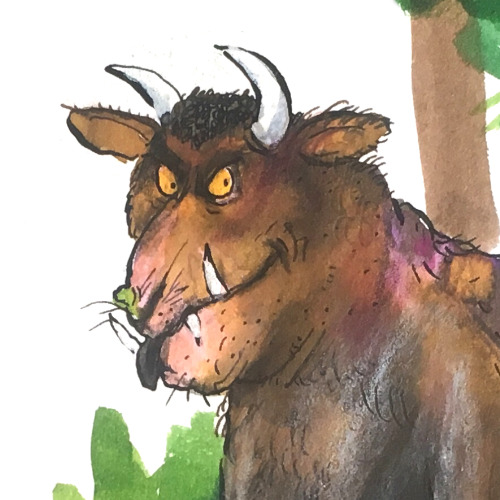
In this post, Axel takes us on a journey through his art studio and career. As well as sharing wonderful development work from some of his much-loved picturebooks, he shows us unseen sketchbook pages, early illustration commissions, etchings he made as a student, and his recent work to educate children about the coronavirus.
Visit Axel Scheffler’s website
Axel: I’m not really sure how many books I’ve illustrated in the 30+ years that I’ve been working. Over 150. I mostly work for the UK market, but occasionally I do books with German publishers. Not picturebooks though, so nothing that collides with the co-edition market.
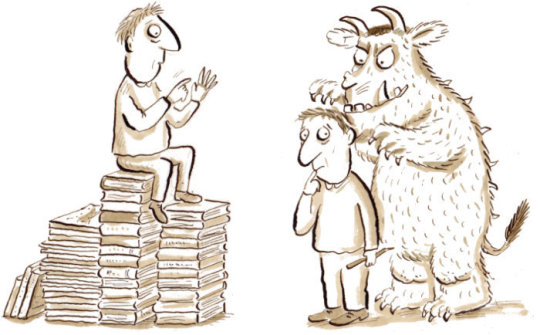
Each of the boxes you see here contains one of my books: the sketches, illustrations, dummies, alternate versions of covers, everything.

I organised these boxes with Liz, my assistant, to have all the main books there so we can find things for exhibitions. There’s still lots of drawings in these boxes which aren’t sorted yet. Liz is such a great help, but it’s very difficult for me to keep on top of everything. I think I would probably need two Lizes, or perhaps three.
So yes, I don’t really know where to begin... I’ve got endless sketchbooks and little drawings on paper. I’ve got some really old sketchbooks I could show you.
Shall we start with The Gruffalo?
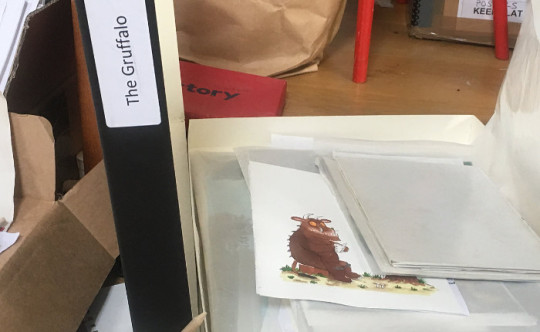
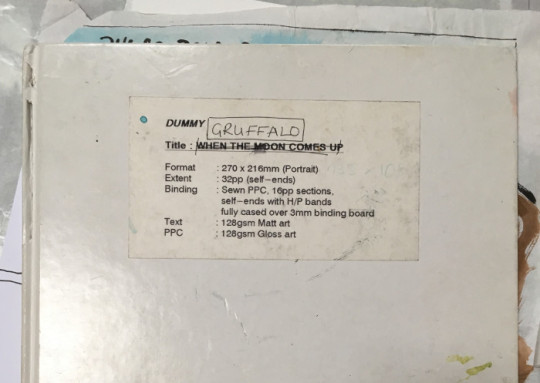
My early sketches of the Gruffalo were thought by my editor to be too scary for small children. So I had to make him a bit rounder and more ‘cuddly’. Initially, I‘d also thought that all the animals would be wearing clothes, as they often do in picturebooks. But Julia had different ideas, and to be honest I was relieved. How would I have dressed the snake?
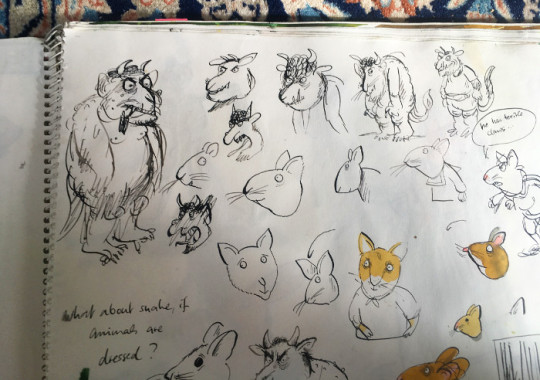
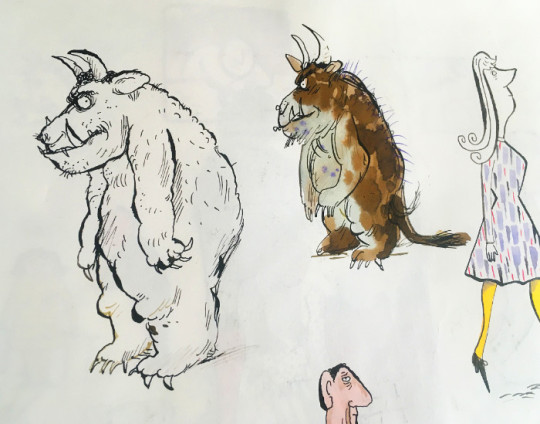
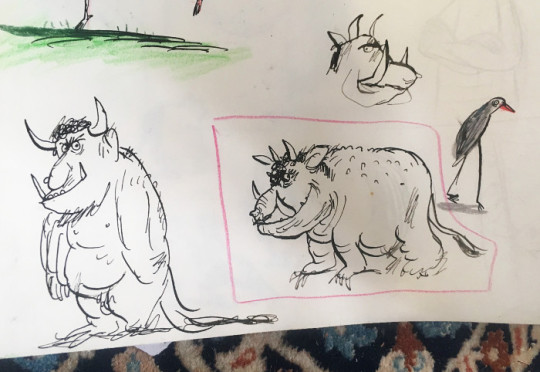
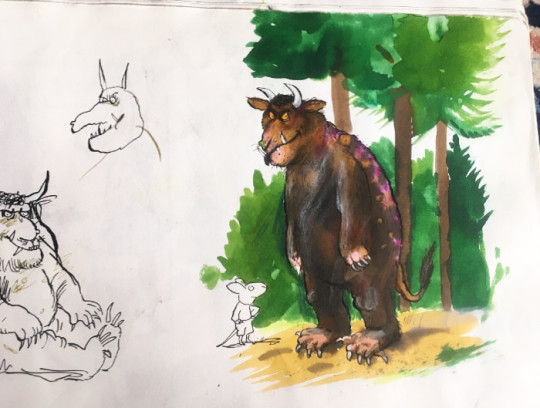

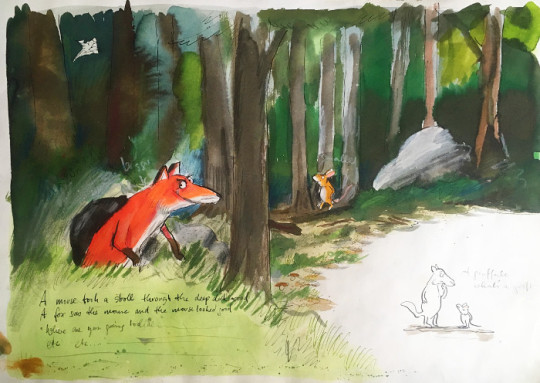
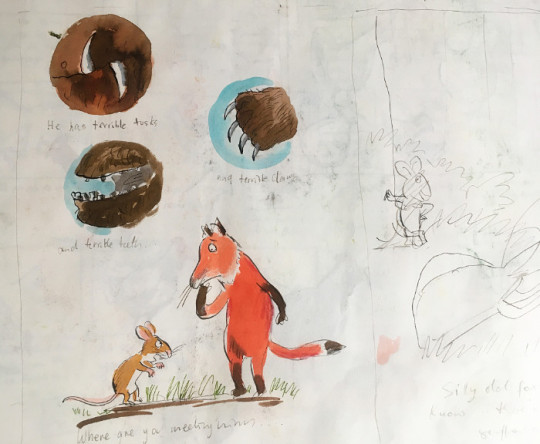
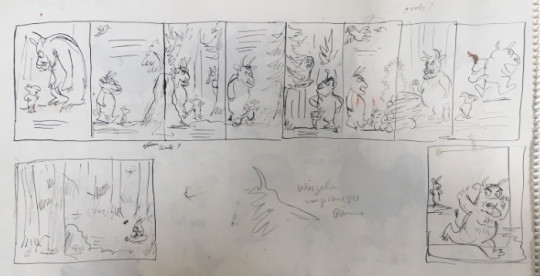
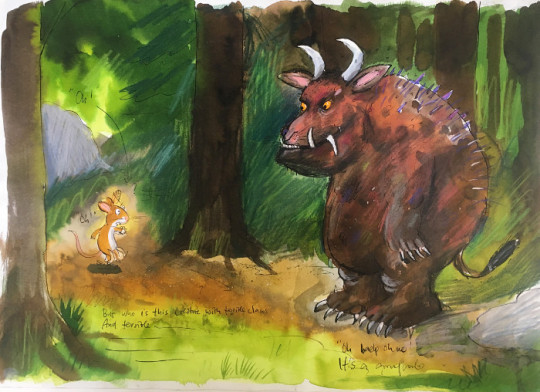
Here’s some spreads from the dummy...
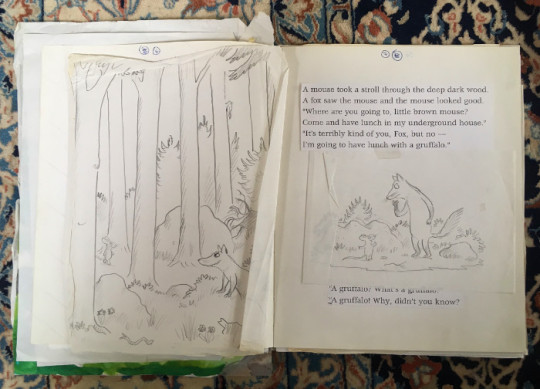
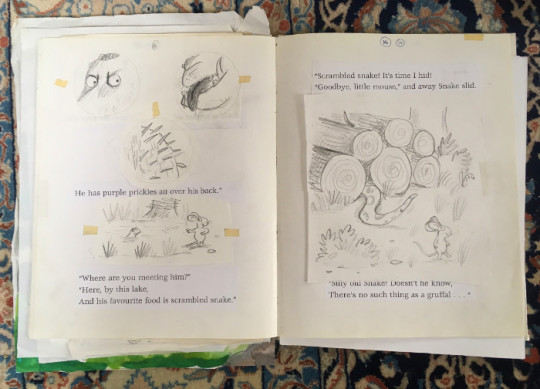

I tried a lot of alternate covers for this book; I think there were twelve in total. There’s some where the Gruffalo doesn’t even feature on the cover.

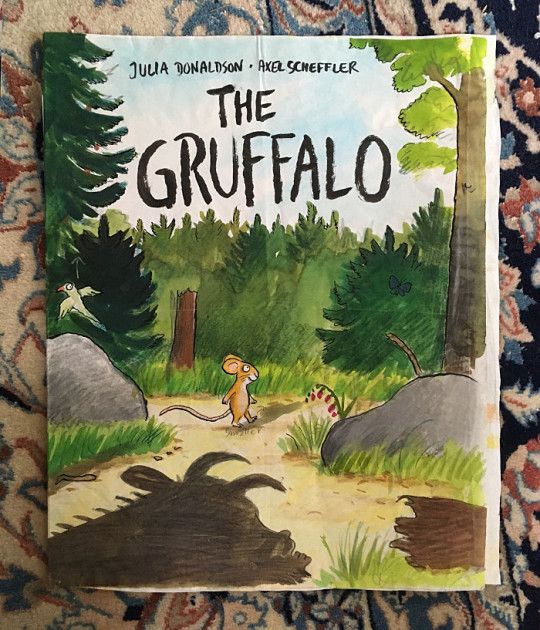
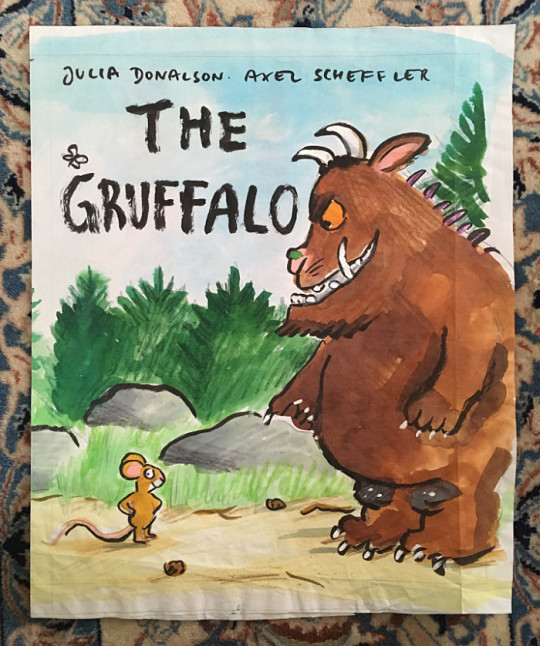
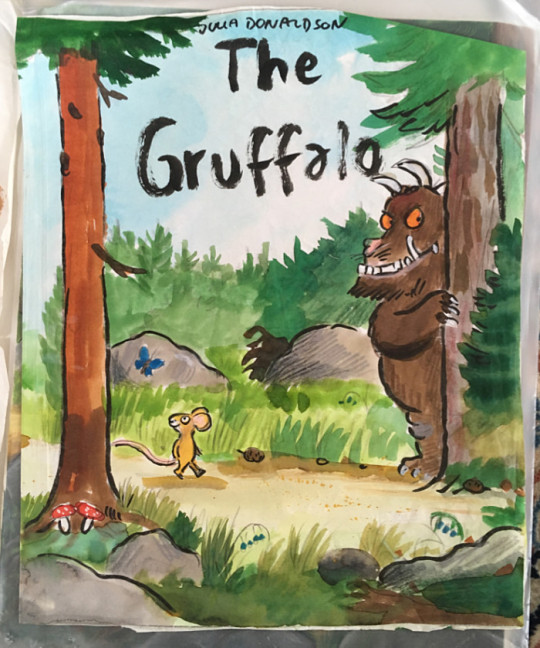

My latest book with Julia is called ‘The Smeds and The Smoos’. It was quite nice to work on because it’s so different from the other books we’ve done together. The text is a bit like a mixture between Dr Seuss and Lewis Carol; it has this nonsense element. But it’s basically Romeo and Juliet in outer space.
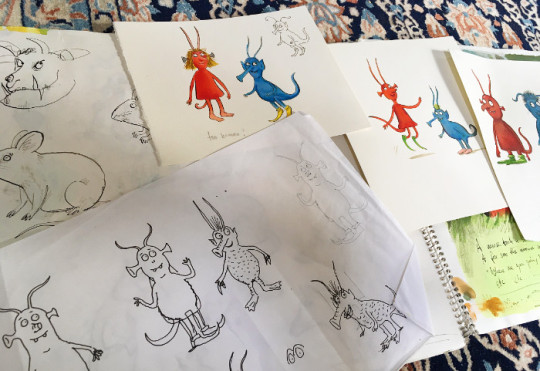
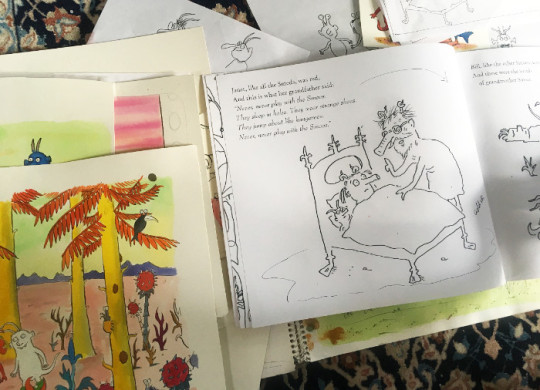
It’s an alien story, so I didn’t have to draw any rabbits or squirrels for a change, and I could invent more. I had more freedom. But like always, I got bored with drawing the same characters over and over again. But that’s picturebooks.
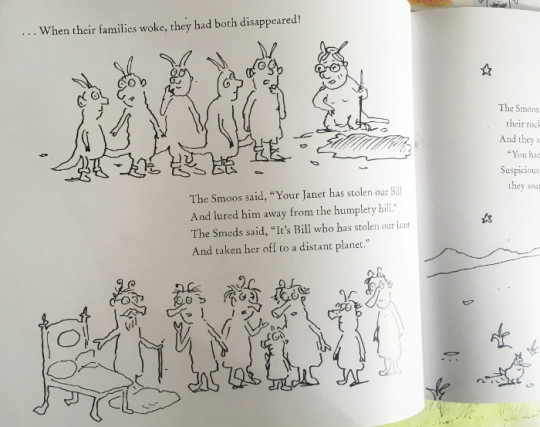
There was quite a lot of development work in the case of this book. But when it’s a story about a fox or a squirrel, I don’t do this kind of stuff. Over the years, it’s become much quicker and easier working on my books. I do far less research than I used to. Now I generally just do a quick pencil sketch then go straight to artwork.
Sometimes I have to start again because things go wrong though. This was a finished piece that was abandoned. I think I suddenly thought that the rocket was far too big or something. I do that; I work on something for ages, and then I suddenly look at it from a distance and realise that something needs redoing.
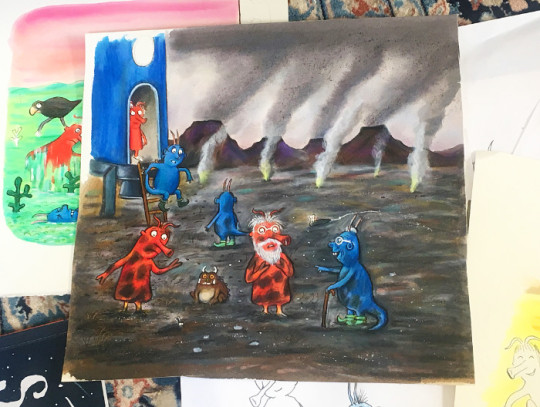
Did you spot the little Gruffalo in this picture? Since ‘The Snail and the Whale’, I’ve hidden a Gruffalo in each of my books with Julia (not ‘The Ugly Five’ though).
For almost all of the books Julia and I have done together, our editor has been Alison Green. We’re an old established team. And I’ve always worked with the publisher Kate Wilson; I followed her from Macmillan to Scholastic, and then to Nosy Crow. Julia moved from Macmillan to Scholastic, and decided to stay there. So Julia and I have some of our joint titles with Macmillan and some with Scholastic. Julia does books with other illustrators for Macmillan, and I illustrate other books for Nosy Crow.
People often ask me which of the books I’ve done with Julia is my favourite. It’s quite hard to choose, but I enjoyed working on ‘The Smartest Giant in Town’. I liked the way I could do a crazy world with animals, giants, fairytale characters, everything mixed together without anyone caring or questioning it. I’ll show you a few things from the box...
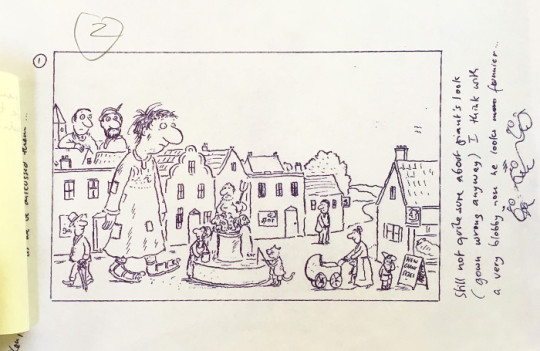
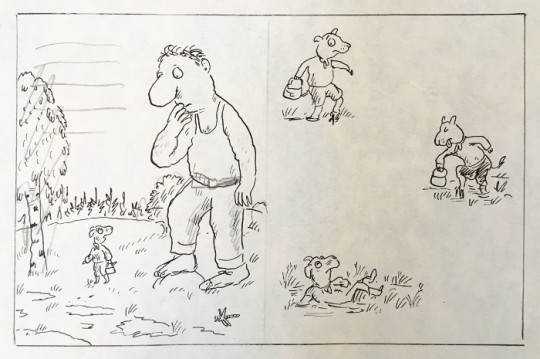

For this book, the cover was changed at the last minute. The original design had the title written on a poster stuck on a brick wall, but the sales people said they wanted a landscape, so I did another one. Years later, they used the original design for a new paperback edition, so it wasn’t completely wasted in the end.
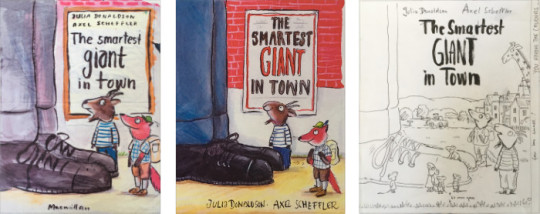
I mentioned my endless sketchbooks earlier. I’ll show you a few of them. This was mainly me playing around without thinking about what I was doing; it wasn’t a conscious thing.

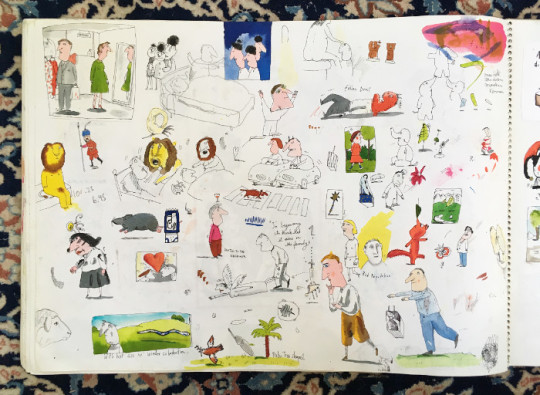
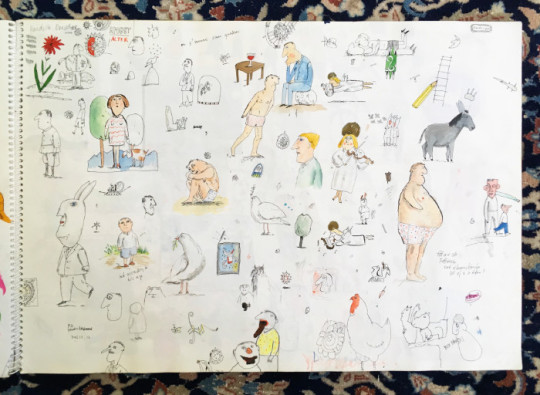
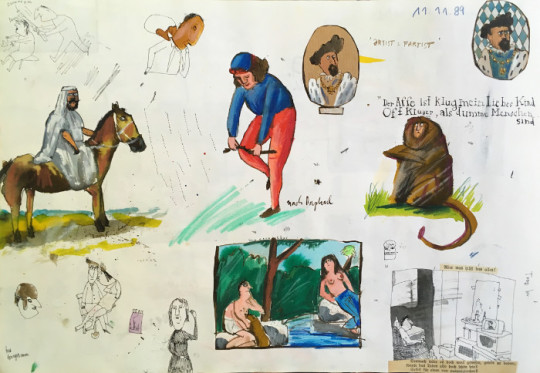
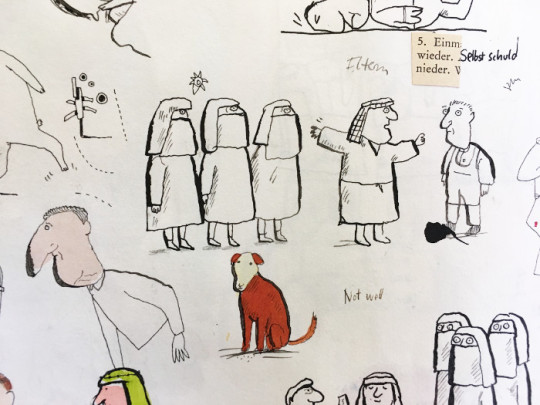
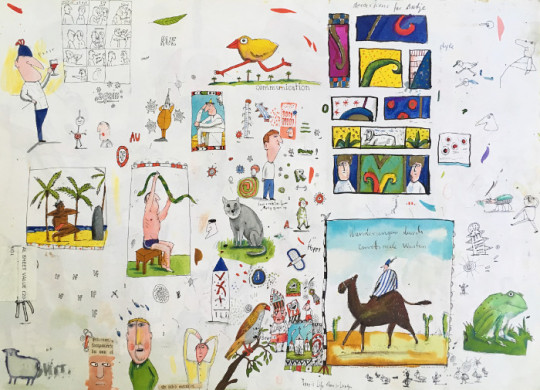
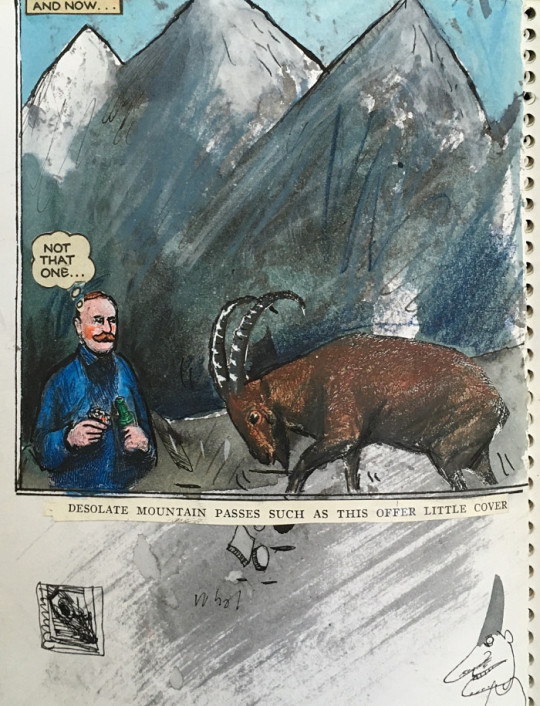
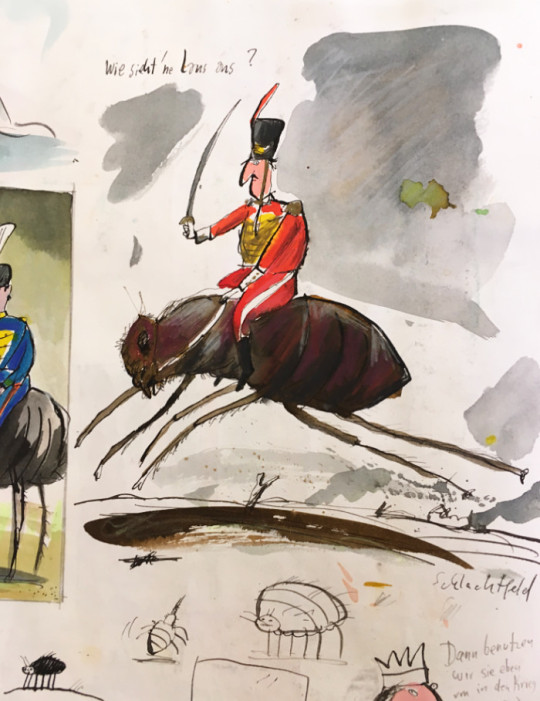
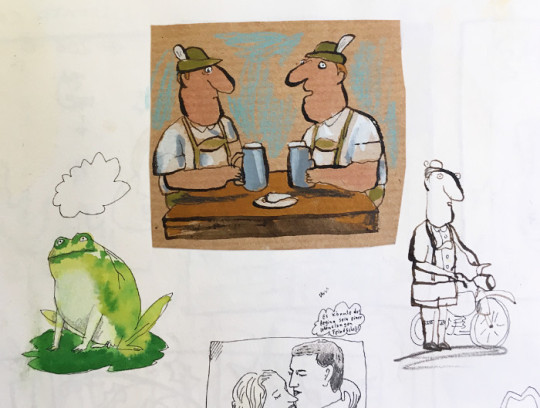

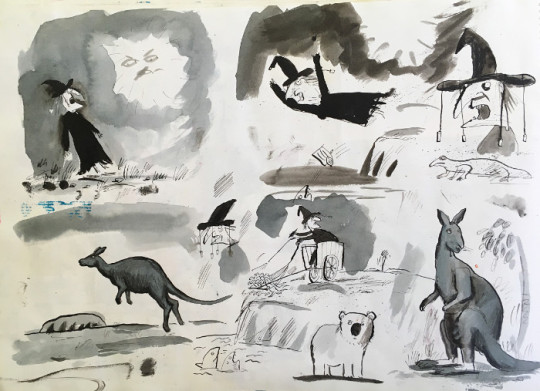
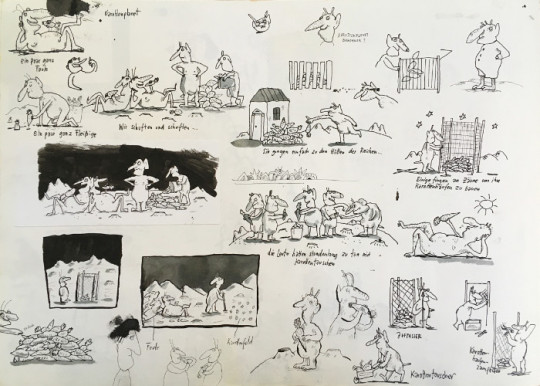
I haven’t looked at these sketchbooks for ages. It was such a long time ago. I don’t work in sketchbooks like this anymore, and I no longer doodle. But for fun, I make illustrated envelopes for friends.
I often think about doing a book with just pictures, but I’m always too busy doing other things. Posthumously, perhaps there will be time to do this. I’d also love to experiment and be more spontaneous; it’s been my dream for decades to do something completely different. But when I receive a book project, I always feel under pressure to finish it, and I’m always late with everything, so I end up doing it the way I’ve always done it.
This is my drawing table, which is and always has been too small and too messy. I think I have to accept it will always be this way.
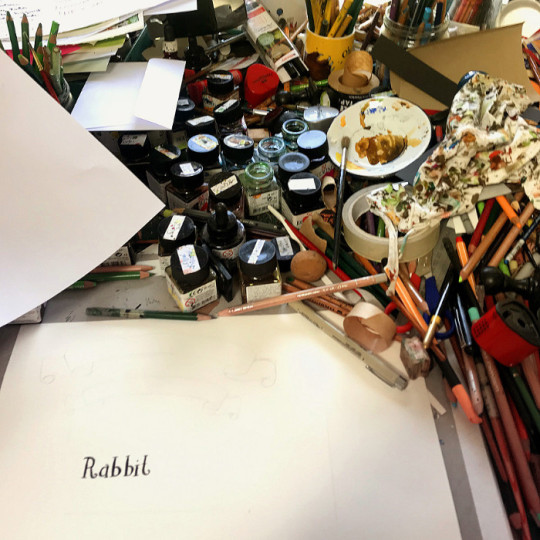
I use Saunders Waterford paper for my illustrations. It’s funny how we all have our special paper. My rough sketches are often quite small, so I have them blown up to the correct size. Then I trace the sketches on a lightbox onto my watercolour paper. After that, I draw the outlines in black ink with a dip pen. I colour everything with Ecoline inks using brushes, and then coloured pencils on top of it (I use Faber Polychromos and Prismacolour crayons). I might then need to redraw some of the black lines, or use some white gouache for highlights.
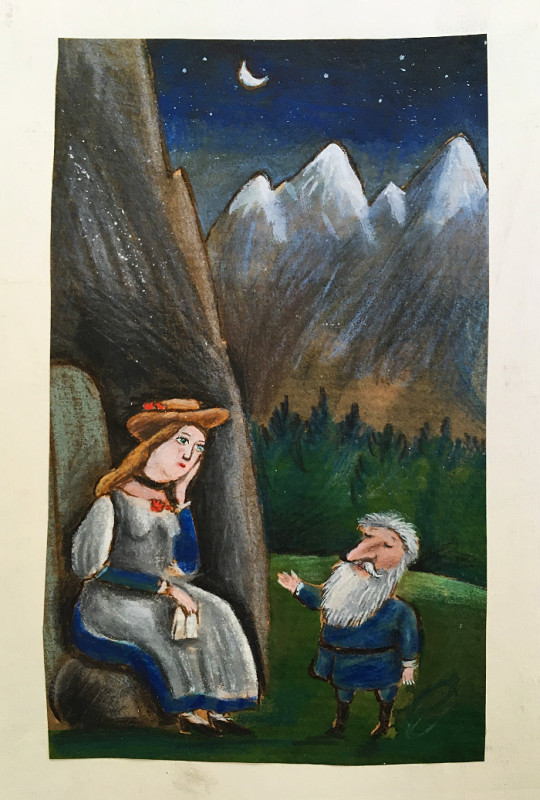
I studied History of Art in Hamburg, but left before graduating. I realised this wasn’t what I was good at; I’m not an academic.
Then I had to do my alternative service as conscientious objector. Sixteen months. There was still conscription then; that’s how old I am. I worked with mentally ill people in their homes. It was during this time that I had a friend studying ceramics at Bath Academy of Art in England. I went to visit her. I really didn’t know what else to do, so I thought maybe I could move to Bath and go to the art school. So this is what I did. The course was Visual Communications, so it was design, printmaking, photography, all that stuff. But I realised I only wanted to do illustration.
I’d gone to art college hoping to learn something. I don’t think that necessarily happened, but drawing intensively for three years was, I think, what I had needed to do. I don’t remember actually finishing any projects though.
Here’s some drawings from my student sketchbooks. I did lots of observational drawing back then, which I don’t anymore. I did it then because they told us to. I’m an obedient person!
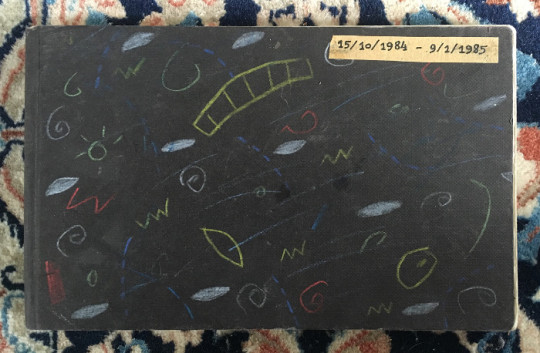
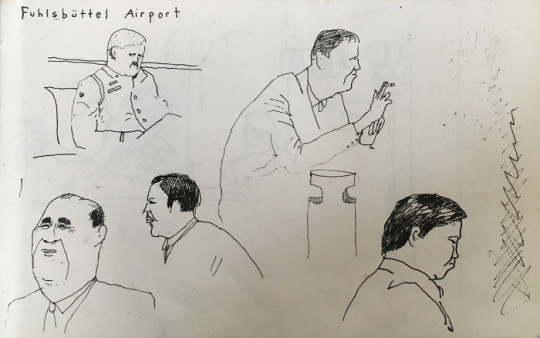
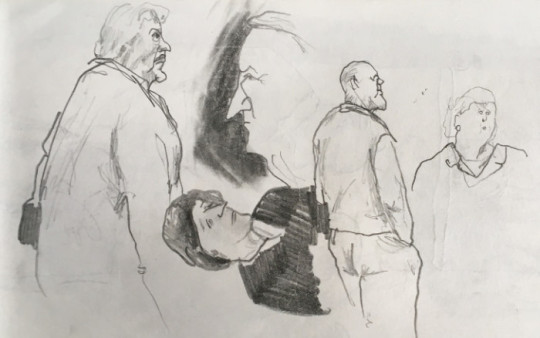
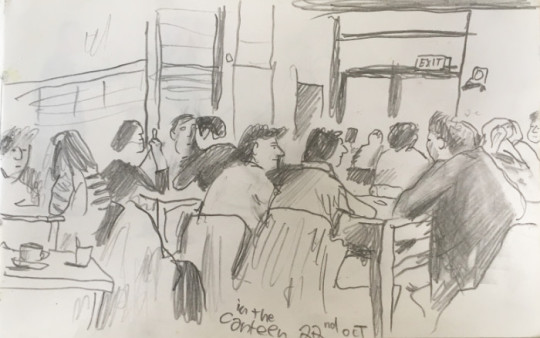
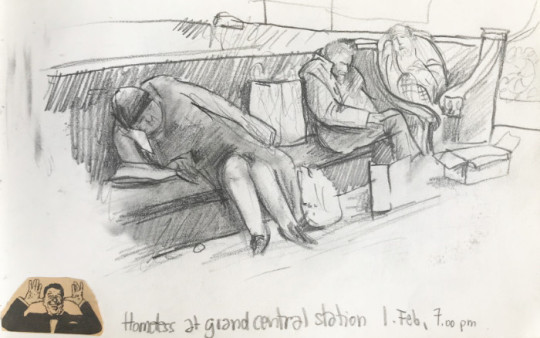
While I was a student, I did an exchange in New York: Cooper Union Art College for three months. These drawings are of Jewish immigrants, meeting for coffee. It was 1984, so many of them were still alive; refugees from Germany or Austria. I heard them speaking German, so that’s how I knew.
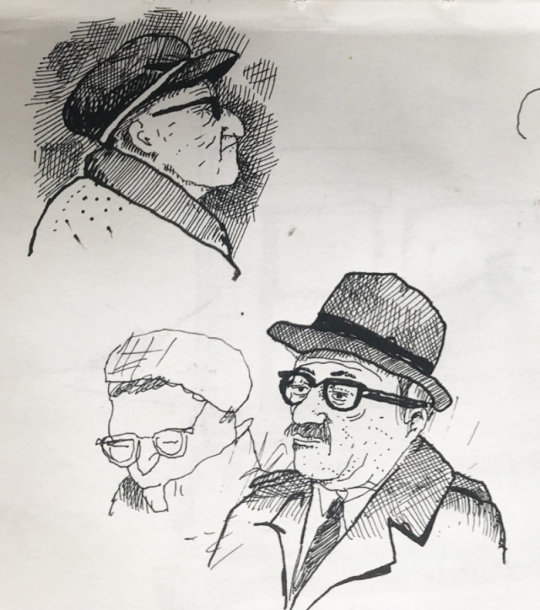
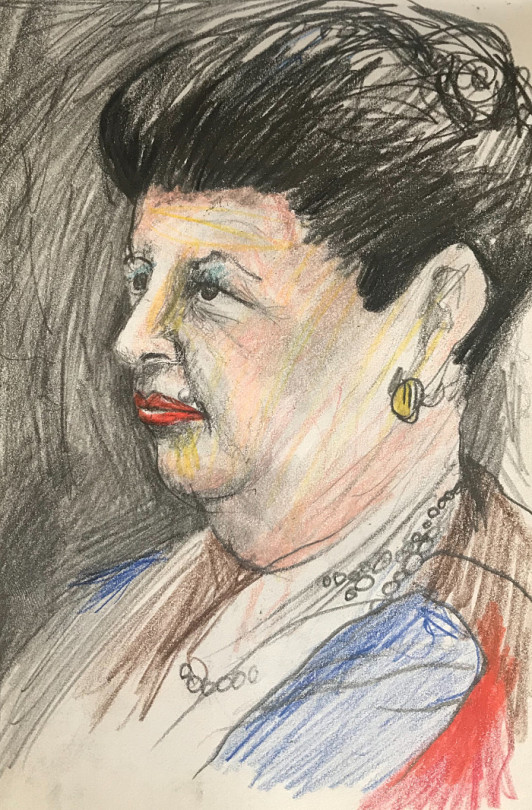
Sketchbooks are such a good way of memorising things. Nobody really knows about these sketchbooks; I used to take them to interviews, but they’ve been hidden away for years.
After I graduated, I moved to London and took my portfolio around. My art teacher had suggested I should do this to get work, so that’s what I did. In those days, you had to ring them and ask to come around. I got two commissions straight away, and it’s been busy ever since, really. I’ve always had something to do.
Here’s some of my early commissions. Starting from 1985, I guess. Very pointy noses...
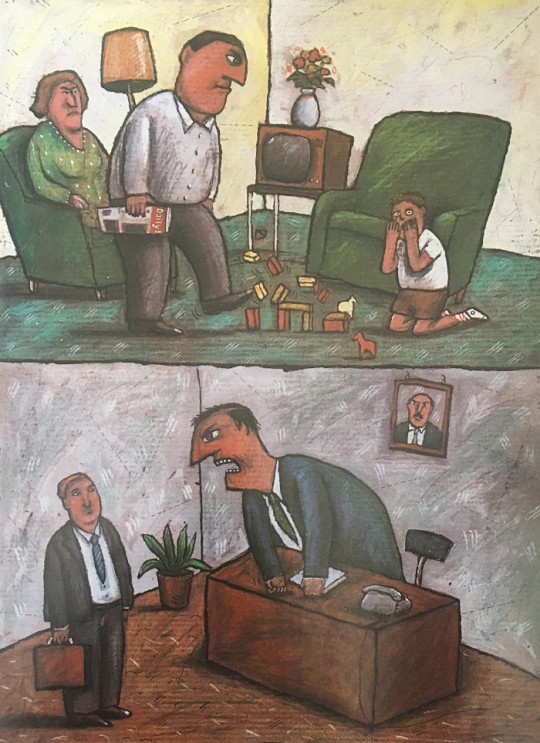

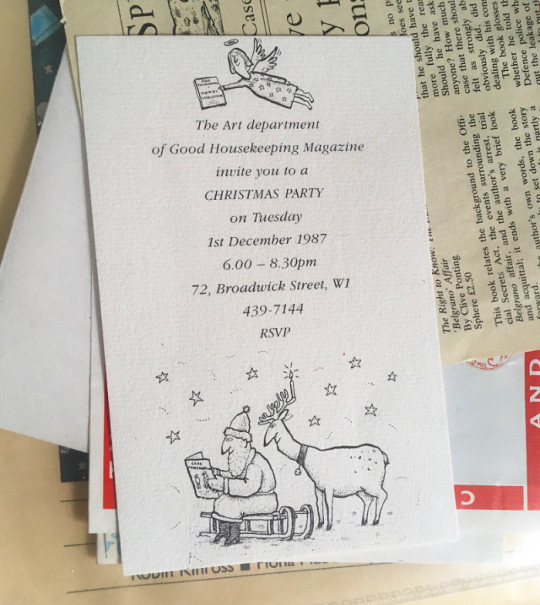
I did so much of this kind of work. It was a good way of earning money quickly. Occasionally, I still do editorial. I did some Brexit drawings for the remain campaign. Sadly, it didn’t help. Maybe I wrecked everything!
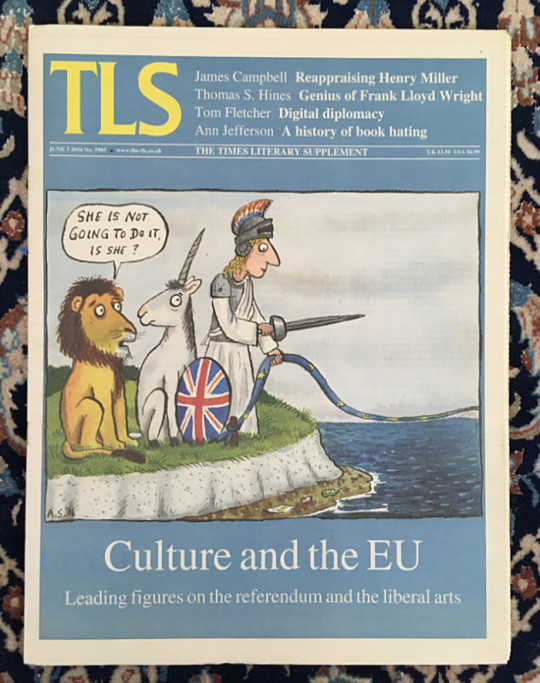
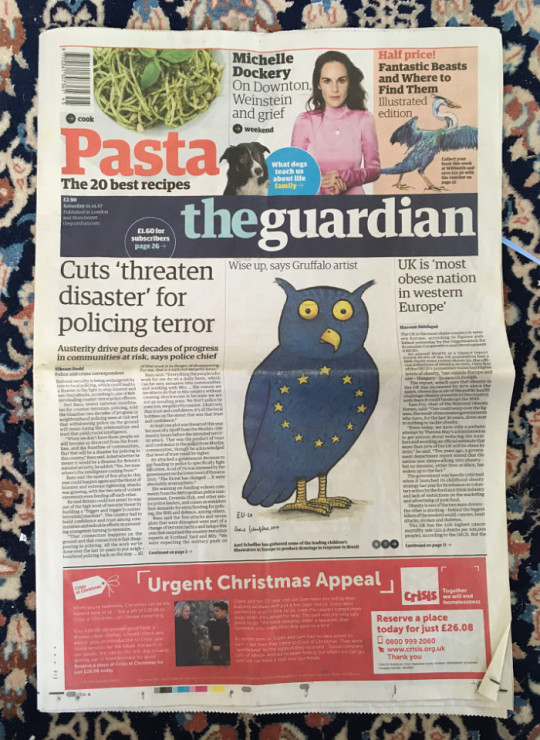
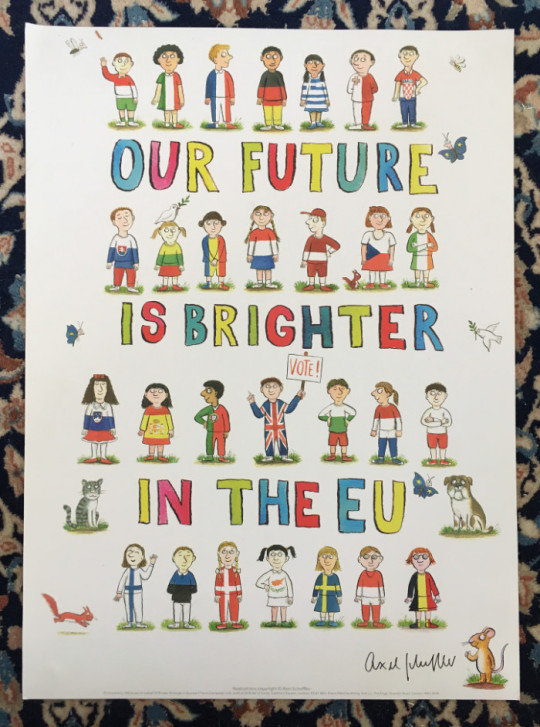
I’ll say a few words about the KIND book... 38 wonderful artists donated a picture to illustrate some of the many ways children can be kind. Such as sharing their toys or helping people from other countries to feel welcome.
One pound from each book sold goes to the Three Peas charity, which supports refugees from war-torn countries. It’s been a big success so far, and Three Peas has received a lot of money from sales in the UK and co-editions.


I’d quite like to do the UNKIND book next! I think illustrators would probably enjoy that, but I don’t imagine it would sell very well.
And now for something completely different! Some etchings I made when I was a student.
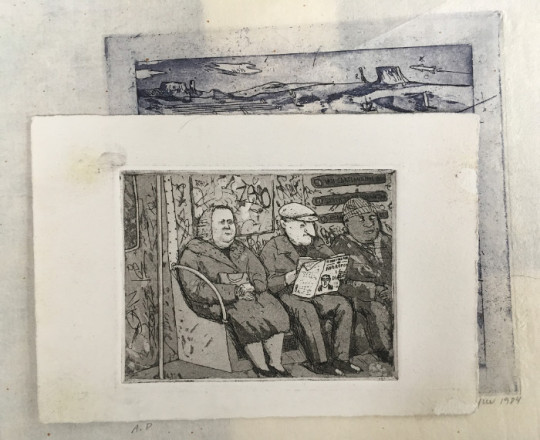
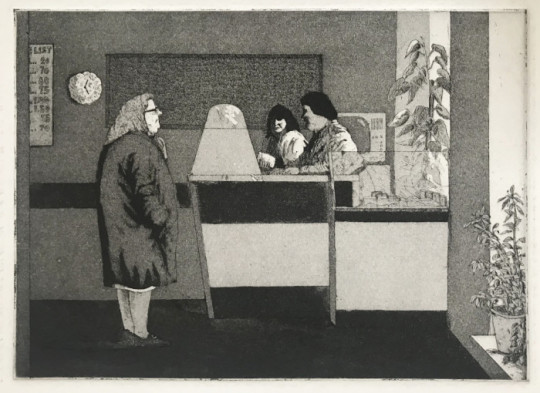

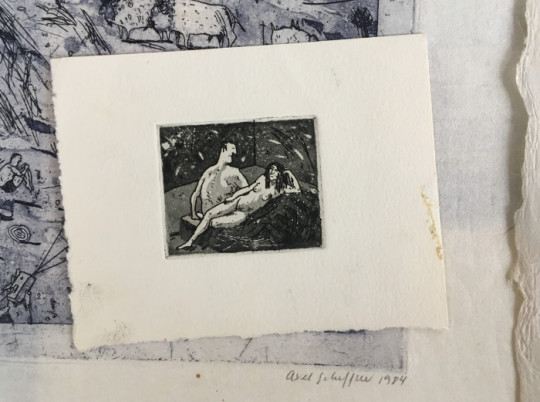


People often ask me which illustrators I’m inspired by. I don’t seek any direct influence on my work, but I’ve always said that Tomi Ungerer had the greatest influence on my approach to illustration. Although his style is quite different to mine, this humour and wackiness is something that has always appealed to me. And the details.
William Steig is someone I got into later, when I was already illustrating. And Edward Gorey of course. And Saul Steinberg. I think the Czech artist Jiří Šalamoun is wonderful. And I like Eva Lindström from Sweden a lot. She’s so great.
Okay, to finish with I’ll talk about the coronavirus work I’ve been doing...
I asked myself what I could do as a children’s illustrator to inform, as well as entertain, my readers here and abroad about the coronavirus. So I was glad when Nosy Crow asked me to illustrate a book on the subject. I think it’s extremely important for children and families to have access to reliable information in this unprecedented crisis.
You can download the free digital book in English here, and in over 60 other languages here.
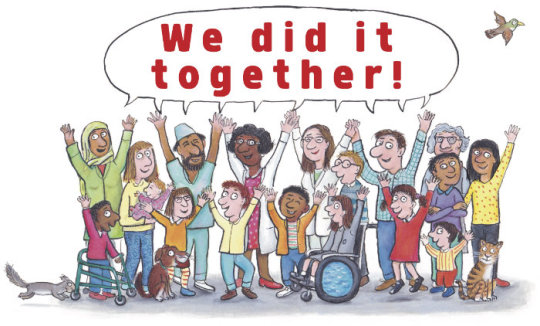
I also wanted to do something light-hearted to cheer people up, and I thought, “What if I imagine some of our characters in corona situations?” Julia liked the idea and wrote rhymes for the new scenes. This was really more about entertainment than serious information.
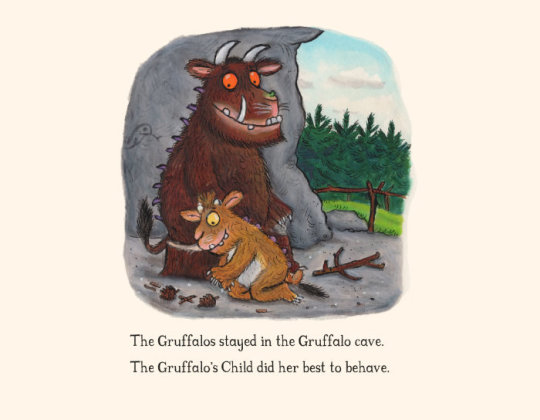
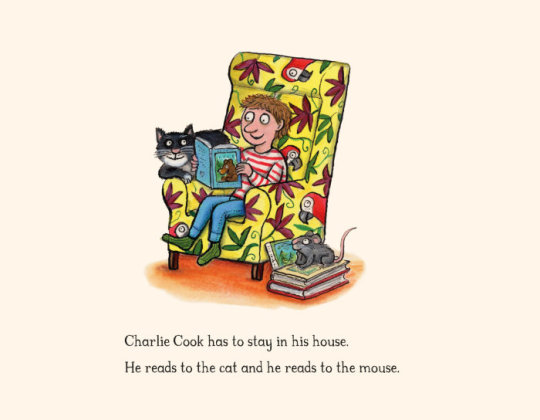
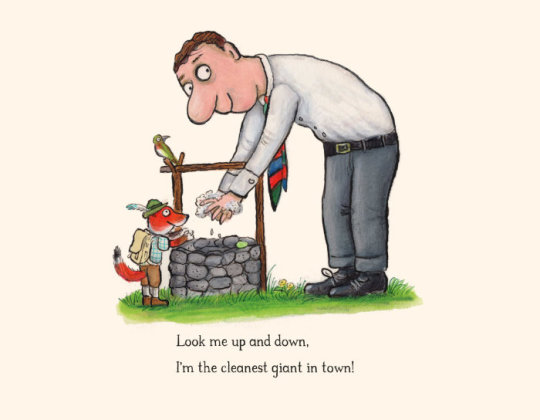

Artwork and verse © Axel Scheffler and Julia Donaldson 2020. Based on characters from ‘The Gruffalo’s Child’ (2004), ‘Charlie Cook’s Favourite Book’ (2005), ‘The Smartest Giant in Town’ (2002), and ‘The Gruffalo’ (1999) — © Macmillan Children’s Books.
And here’s one more thing: my ‘letter from lockdown’. On The Children’s Bookshow website, you’ll find lockdown letters from lots of other wonderful authors and illustrators.
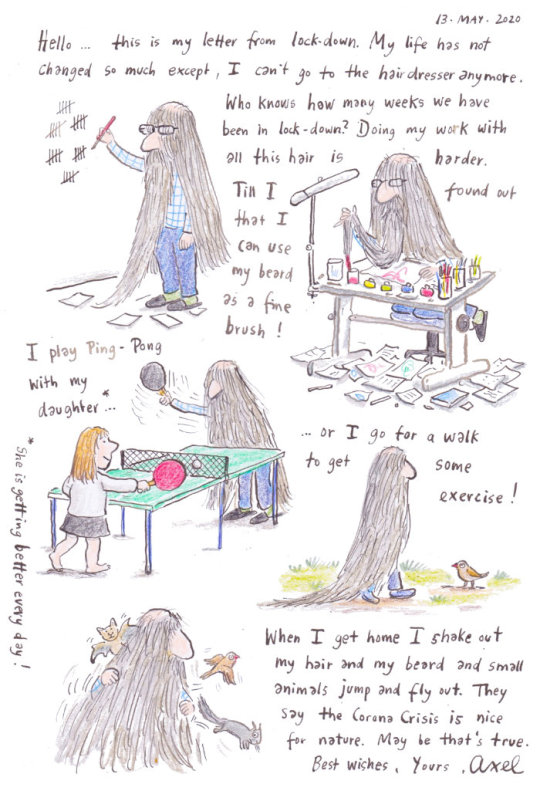
Illustrations © Axel Scheffler. Post edited by dPICTUS.
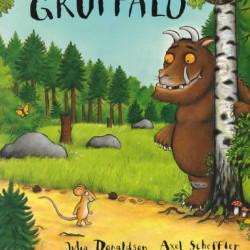
Buy this picturebook
The Gruffalo
Julia Donaldson & Axel Scheffler
Macmillan Children’s Books, UK, 1999
‘A mouse took a stroll through the deep dark wood. A fox saw the mouse and the mouse looked good.’
Walk further into the deep dark wood, and discover what happens when a quick-witted mouse comes face to face with an owl, a snake... and a hungry Gruffalo!
‘The Gruffalo’ has become a bestselling phenomenon across the world. This award-winning rhyming story of a mouse and a monster is now a modern classic, and will enchant children for years to come.
PUBLISHED IN THE FOLLOWING LANGUAGES & DIALECTS
Afrikaans
Albanian
Arabic
Australian
Azerbaijani
Basque
Belarusian
Bengali
Breton
Bulgaria
Catalan
Chinese (Simplified)
Chinese (Traditional)
Corsu
Croatian
Czech
Danish
Doric
Dundonian
Dutch
English
Esperanto
Estonian
Faroese
Farsi
Finnish
French
Frisian
Gaelic
Galician
Georgian
German
Glasgow Scots
Greek
Guernésiais
Hebrew
Hindi
Hungarian
Iceland
Indonesian
Irish
Italian
Jèrriais
Kazakh
Kölsch
Korean
Latin
Latvian
Lithuanian
Low German
Lowland Scots
Luxembourgish
Macedonian
Maltese
Manx Gaelic
Maori
Marathi
Mexican Spanish
Mongolian
Norwegian
Orcadian Scots
Polish
Portuguese
Portuguese (Brazil)
Romanian
Russian
Sami
Schwabisch
Serbian
Sesotho
Setswana
Shetland Scots
Slovakian
Slovenian
Spanish
Swedish
Swiss German
Tamil
Thai
Turkish
Ukrainian
US English
Vietnamese
Welsh
Xhosa
Zulu
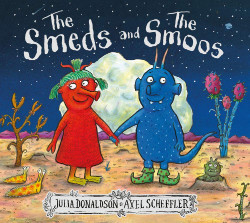
Buy this picturebook
The Smeds and The Smoos
Julia Donaldson & Axel Scheffler
Alison Green Books, UK, 2019
The Smeds (who are red) never mix with the Smoos (who are blue). So when a young Smed and Smoo fall in love, their families disapprove.
But peace is restored and love conquers all in this happiest of love stories. There’s even a gorgeous purple baby to celebrate!
PUBLISHED IN THE FOLLOWING LANGUAGES
Afrikaans
Catalan
Croatian
Dutch
English
Finnish
French
German
Hebrew
Hungarian
Italian
Korean
Luxenbourghish
Polish
Russian
Slovenian
Spanish
Swedish
Turkish
Ukrainian

Buy this picturebook
Kind
Alison Green, Axel Scheffler & 38 illustrators
Alison Green Books, UK, 2019
Imagine a world where everyone is kind; how can we make that come true? With gorgeous pictures by a host of top illustrators, KIND is a timely, inspiring picturebook about the many ways children can be kind, from sharing their toys and games, to helping those from other countries feel welcome.
One pound from the sale of each printed copy will go to the Three Peas charity, which gives vital help to refugees from war-torn countries.
PUBLISHED IN THE FOLLOWING LANGUAGES
Bulgarian
Catalan
Chinese (Simplified)
Chinese (Traditional)
English
French
German
Greek
Hebrew
Italian
Korean
Netherlands
Portuguese (Brazil)
Romanian
Spanish
Swedish
Turkish
Vietnamese
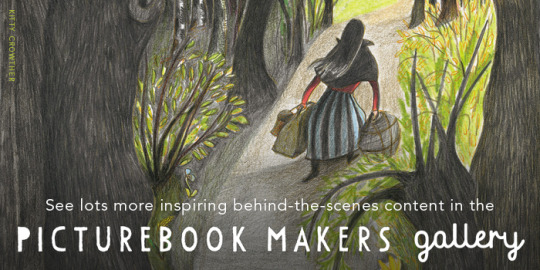
2 notes
·
View notes
Link
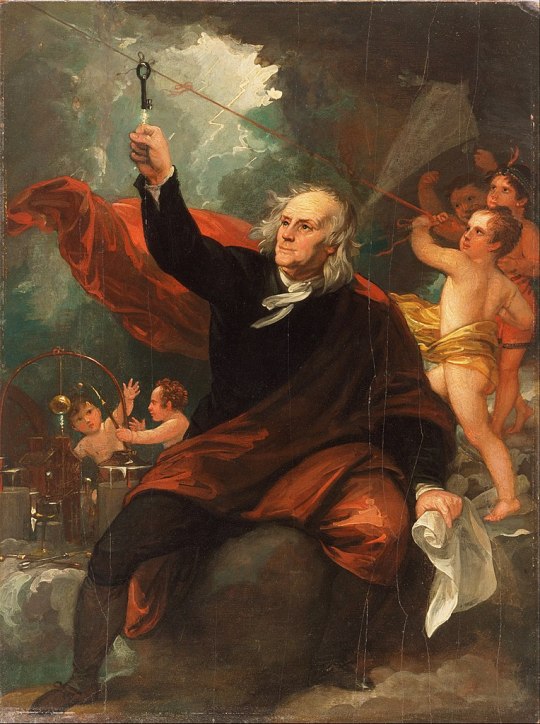
(Benjamin Franklin calling down lightning from the sky. Not that relevant to the episode, but I feel obliged to use it anyway.)
The Quaker faction in Pennsylvania fights a rearguard effort to hold on to political power despite their dwindling population, at one point literally beating back riotous sailors with clubs.
>>>Direct audio link<<<
(iTunes) (Spotify) (Podbean) (Libsyn) (YouTube) (WordPress) (Twitter)
Transcript and Sources:
Hello, and welcome to Early and Often: The History of Elections in America. Episode 39: The Long Death of Quaker Rule.
Over the last two episodes, we’ve discussed the history of Pennsylvania from the 1680s to the 1730s. Politically, the main struggle was over local autonomy. Pennsylvania was a proprietary colony ruled by one man, William Penn, and then later by his heirs. Thanks to various legal troubles, Penn had to spend most of his time in England instead of in America. In his absence the Assembly slowly but surely accumulated power until they were the dominant force within the colony. In fact, in 1701, the Assembly forced Penn to accept a new constitution, which made Pennsylvania unicameral. The Assembly became the sole legislative body, while the council was reduced to a mere group of advisors.
But just as important as these political changes were the demographic changes reshaping Pennsylvania across the 18th century. Pennsylvania had been founded as a refuge for persecuted Quakers, and in the beginning Quakers and other similar denominations did in fact dominate the colony. But there weren't actually that many Quakers in the world, and so the initial wave of Quaker migration soon dried up. However, that didn't mean that immigration stopped. Pennsylvania was a prosperous, tolerant place, and so many non-Quakers started coming. By the early 1700s the Quakers were already a minority in their own colony.
Some of these immigrants were Scots-Irish, fleeing the poverty of Scotland and Northern Ireland. The Scots-Irish in particular had almost nothing in common with the Quakers. They were rowdy, violent, and poor. I'll talk much more about them next time. And I've already discussed the Anglicans living in Philadelphia, plus other cosmopolitan men like Ben Franklin.
The other big group came from Germany. Germany was still recovering from the devastation of the Thirty Years' War several decades ago, and therefore migration was an enticing prospect. And once they started coming, they didn’t stop. By 1717 there were some 15-20,000 Germans in Pennsylvania. By the Revolution, there were 110,000.
When it came to politics, these Germans tended to support the Quakers, for a few reasons. Firstly, many of the Germans also came from pacifist religious denominations. Even those Germans who weren't pacifists wanted to avoid war. Secondly, the Germans, being foreigners, were unlikely to run for office themselves, so it made sense to pick a group of native English candidates to support. And the Quakers, for their part, advocated giving the Germans citizenship as soon as possible, so that they could vote for Quaker candidates.
In order to maintain their power, the Quakers also made sure that the settlements on the western frontier, which were typically filled with non-Quakers, were systematically underrepresented in the Assembly. For example, in 1760, the eastern counties of Philadelphia, Bucks, and Chester had a combined 26 delegates out of 36 total, while the 5 western counties together had only the remaining ten representatives, despite the fact that both regions had similar populations.
So thanks to these sorts of tactics, the Quakers managed to stay in power much longer than you might expect, considering their small numbers. For example, in 1739, 22 out of 36 seats in the Assembly were held by Quakers. But it would've been clear to everyone that things were changing. In order to keep that power, the Quakers had to stick together. So no more middling vs. elite Quakers. From now on, there would just be a single Quaker faction.
And when I say “Quaker faction”, I mean Quaker faction. They may have gotten support from other groups, but it was very much controlled by the Quakers themselves. By the 1750s they were literally choosing their candidates during Quaker meetings. You might recall that Quakers governed themselves through a system of meetings, local meetings, regional meetings, meetings for men, meetings for women, and so on. Well it was at some of these meetings that the Quakers chose their candidates. It's a bit like if today Republican party candidates were being chosen explicitly by meetings of Evangelical Christian leaders.
Their opponents found this outrageous, and they issued calls for nominees to be chosen in public, rather than in private, but the Quakers ignored them.
Who were these opponents? Well, the Quakers had continued to attack proprietary authority, and so their opponents wound up becoming supporters of the proprietorship. So once again the factions were simultaneously split along lines of religion and politics. Quakerism overlapped with anti-proprietary beliefs, while non-Quakerism overlapped with pro-proprietary beliefs, by default.
However, the proprietary faction was generally on the losing side of things. The Quakers had assembled a powerful coalition, their policies were popular, and frankly the Penn family wasn’t much of a help.
William Penn had died in 1718, but it took a long time for his estate to be settled. The legal proceedings dragged on for most of a decade. I’ll spare you all the details, but basically in the end Pennsylvania went to his children by his second wife, Hannah, who herself died just after the court case was settled.
It took a few years longer to decide who was going to actually govern the colony, but in practice it was her son Thomas who wound up running things. Thomas spent some time in Pennsylvania, but mostly he lived in England.
He was a very different man than his father. In fact, he wasn’t even a Quaker. He didn’t see Pennsylvania as a Quaker refuge or as some divine experiment. He had no grand visions for what life in Pennsylvania could or should be. To him, it was just an investment to be properly managed. In his words, “I never desire to have views so noble, extensive, and benevolent as my father, unless he had left a much larger fortune; because these views, though good in themselves, yet by possessing him too much, led him into inconveniences which I hope to avoid.” No point in sticking to your beliefs so strongly you wind up in a debtor’s prison.
And the officials he appointed were generally non-Quakers as well.
So those are the dividing lines within Pennsylvania. Anti-proprietary Quakers, supported in particular by the Germans, vs. the non-Quaker proprietary faction. It's remarkable how the government of Pennsylvania had now become anti-Quaker. This in the colony founded by William Penn, one of the most prominent Quakers in history. Just goes to show the weird twists history can take.
By the way, this was also the time of the Great Awakening. The Great Awakening had a moderate impact in Pennsylvania, less than in New England but more than in New York. The Quakers and Germans proved mostly immune to the Awakening's charms, but other groups such as the Anglicans were more receptive. Therefore, members of the Quaker faction tended to oppose the Awakening, while members of the proprietary faction tended to support it, but I don't think that it actually proved to be a major source of division like in New England. Pennsylvania just wasn't theocratic in the same way that Massachusetts was.
But, moving along.
The 1730s were a time of transition. Many of the old politicians who had led Pennsylvania for the last half century -- David Lloyd, James Logan -- were either dead or nearing retirement. And a new generation of politicians was rising to take their place. Benjamin Franklin for one, although he was kind of an outlier. He was from Boston and he was a self-made man.
Most leaders came from the new Quaker upper class which I mentioned last time. Take for example William Allen, a leader of the proprietary faction. Allen had a somewhat successful merchant father and Allen himself become one of the richest men in Pennsylvania. He married the daughter of a prominent politician, and in the 1760s one of his daughters married into the Penn family. He became a member of the council at age 23, and was elected to the Assembly at age 27, then as mayor of Philadelphia at age 31. The same sort of career path as Thomas Hutchinson in Massachusetts. Men from prominent merchant families going into politics at a young age and marrying women from other such families.
So all in all, that's the pattern Pennsylvania had settled into by the mid-1730s. But in the late 1730s, King George’s War broke out, and once again, Pennsylvania was called upon to contribute to the war effort.
The governor asked the Assembly to raise funds, and at first the Assembly, which was controlled by the Quaker faction, was open to the idea. During the previous wars, the Quakers had come up with a compromise. They’d raise money without explicitly specifying what it was for, even though they in fact knew it would be spent on fighting. That had been enough for the Quakers. They felt that their hands were clean.
Initially, it seemed like that compromise would still hold. However, things were swiftly derailed. The governor began raising a volunteer militia. But when this militia took in a number of indentured servants without the permission of their masters, there was a general uproar in the colony. People thought that the militia, by taking in these servants, was stealing property from the masters. They soon turned both against the militia and against war in general. Realistically, it may have just been an excuse to oppose the war effort, but either way the damage was done. The Quaker faction now opposed the war.
There is one other factor to consider in understanding why this happened. The Quakers themselves were becoming more pacifist. You may recall that in New England, there had been a gradual transformation of Puritanism as time went on, as the initial enthusiasm wore off. Something similar had happened within Quakerism. After 50 years in Pennsylvania Quakerism had become less spiritual, less aggressive. And all you had to do to be a Quaker was conform to Quaker practices, rather than accept the Inner Light. Quakerism was becoming normal.
And just like in New England, this gradual loosening eventually provoked a backlash by people who wanted to recapture the old fervor, and to maintain the Quaker identity against all the other immigrants in Pennsylvania. That meant taking their beliefs more seriously, including pacifism. And so, many Quakers now found it harder to support war than in the past. They now wanted to be real pacifists, not just nominal pacifists. Of course, not all Quakers supported this change, but at the moment, it was the hardline pacifists who had the upper hand.
Whatever the reason, the Quaker faction was now at odds with the proprietorship.
During the 1740 election, the proprietary faction argued that unless Pennsylvania agreed to help fund the war, some sort of catastrophe might overtake them. The Quakers, on the other hand, argued that war meant conscription, tyranny, and higher taxes. The people found that message more believable, and the Quakers won the election and kept control of the Assembly.
The proprietary faction was in a difficult position. They really had very little chance of winning the Assembly, and without the Assembly, they couldn’t hope to contribute to the war effort, which would undermine the Penn family in Britain. Remember, it was still possible that Parliament might make Pennsylvania into a royal province. That concern hadn’t gone away. So, if they couldn’t win legitimately, the proprietary faction decided to use underhanded tactics instead.
In the runup to the 1741 election, they tried to get the Board of Trade to ban Quakers from holding elective office during times of war. Needless to say, such a drastic action would have wiped out the Quakers as a political force, at least temporarily. However, the Board of Trade declined to go along with the plan, which was probably sensible of them. Banning Quakers altogether sounds a bit harebrained to me.
Although, I should point out that it wasn't only the proprietary faction using underhanded tactics. For example, for several years the Quakers had been physically interfering with the election process in Philadelphia. As it happened, voters in the capital had to go up a flight of stairs in order to hand in their ballots. The Quakers had recently begun using this quirk to their advantage. They would all crowd along the stairwell and only allow voters who supported them to come up to vote. Everyone else they tried to block.
Anyway, during that next election, in 1741, things got a bit heated. When some reverend was accused of casting two ballots someone punched him. And when an official moved in to break up the fighting, he got punched too.
The Quakers won yet again, but that little scuffle was nothing compared to what happened in the next election in 1742. Having failed to oust the Quakers through legitimate or semi-legitimate means, the proprietary faction began considering more drastic actions.
First, I need to explain a bit more about how elections in Philadelphia worked at this time. There were actually two elections on election day. The second election was for the delegates to the Assembly, but the first election was for the inspectors. The inspectors were the people who oversaw the election. They were empowered to look at people’s ballots, to decide what was and wasn’t legal, to disqualify people from voting, and so on. So controlling the inspectors meant that you could control the election process. It was a lot like the sheriffs in New York I talked about a few episodes ago. If you wanted to manipulate the elections, the inspectors were the way to go. Or, if you feared that your opponents were going to manipulate the elections, you wanted to make sure that they didn’t control the inspectors.
How were the inspectors chosen? By election, of course. But since there would be no inspectors to oversee their own election, this had to be done through a different process, overseen by the sheriffs. Instead of using ballots, voters would simply line up behind their preferred candidate to be counted. I suppose the idea was to make the election as public as possible, so that there could be no trickery. And then, after the inspectors were chosen the real election would be held.
However, this system may have had some flaws. For one thing, the elections in Philadelphia were held near the docks, an area filled with taverns and drunken sailors. It was an unstable environment. There were no orderly procedures, just big crowds of people milling around. It was an even more volatile area than that stairwell, even more vulnerable to disruptions.
And before the election, there were rumors swirling throughout the city. Firstly, that the Quakers would bring in German immigrants to vote illegally. And secondly that the proprietary faction had hired sailors to act as muscle, to intimidate the Quakers out of voting. Everyone was on edge, everyone was expecting trouble.
On the morning of October 1, everyone gathered to vote. Tensions were indeed high. There were an unusual number of sailors on the streets, already getting drunk and making threats to “knock down the broad Brims”. That is, attack the Quakers. The Quakers wanted the sailors to be removed from the area, but since they hadn’t actually done anything yet, the officials overseeing the election refused. And even before the election began already a few punches had been thrown.
At 10 AM the polls opened and the voters began lining up to choose the inspectors. It soon became clear that the Quakers were set to win. Then suddenly 50 plus sailors appeared a block away, marching towards the voters. They began beating the voters with clubs, attempting to drive them away from the polling site. The voters were pushed back at first, but the sheriffs handed out clubs to any of the voters who were willing to fight back. Even a number of Quakers entered the fray.
Thus, there was a violent back and forth, and there were a few serious injuries. At one point the Quakers were pushed into the courthouse, and the sailors besieged the building. Windows were broken in and so on. But eventually, the sailors were driven back and the rest of the election could be held in peace. 54 of the sailors were thrown in jail. It took pacifist Quakers arming themselves, but in the end they prevailed.
Needless to say, the Quaker faction won big time, both in the elections for inspector and in the elections for the Assembly. And it wasn't just a one-time victory. The attack cost the proprietary faction dearly. The voters now associated them with violence and disorder, and with unfair elections.
Although, to be fair, the accusations against the proprietary faction were never actually proven. The Assembly led an investigation into the incident, but the investigation was biased and partisan. They were aiming to make the proprietors look bad, not figure out what happened. It's possible that what happened was that the Quakers, fearing an attack, had tried to kick the sailors out of the area, which upset the sailors and led them to attack on their own initiative. Possible, at least, though I think not likely. I would wager that the proprietary faction, or at least someone within the proprietary faction, was responsible. After all, we've seen these tactics before, in 1690s New York, when Governor Fletcher had brought in sailors to intimidate voters. Although in that instance, the sailors didn't actually attack anyone.
But in any case, now the Quakers were even more firmly in control of the Assembly than before. For a while, they controlled practically every seat. And the proprietary faction now had no hope of taking over themselves. They hardly even bothered to run candidates. So the governor now had to negotiate with the anti-proprietary faction from a position of weakness. The proprietary faction capitulated on a number of issues, but the Quaker faction gave in on military appropriations as well. They agreed to go back to the old compromise of granting money without explicitly stating what it was to be spent on.
However, although the Assembly was willing to send money to other colonies to help them fight, they were much less interested in creating any sort of army or militia to defend Pennsylvania. In fact, the colony was nearly defenseless, as was shown when a French warship sailed up the Delaware and harassed some English vessels before sailing away. Rumors spread that an even bigger invasion was planned. But still the Assembly refused to create a militia.
That gave an opening to Benjamin Franklin. He was always eager to form new institutions, and so he decided to create a volunteer militia himself. He wrote and published a pamphlet to that effect and it was immediately successful. Thanks to Franklin’s efforts many men across the colony organized themselves into regiments and began drilling.
Like many American militias at this time, the officers were elected. Specifically, the volunteers elected their officers, and then those officers elected colonels. Franklin could've been elected to lead the Philadelphia militia, but he declined the offer, instead serving as a common soldier, though all he ever did was keep watch. And in any case the war ended that next year.
Still, Franklin’s efforts further increased his standing, at least among most Pennsylvanians. The more extreme Quakers weren’t fans of the militia, but the moderates were happy enough to see someone else take up the burden. According to Franklin, “Indeed I had some cause to believe that the defense of the country was not disagreeable to any of them, provided they were not requir’d to assist in it.”
On the other hand, if many Quakers proved unexpectedly grateful, the proprietary faction was rather lukewarm. They weren't too happy that Franklin had succeeded where they had failed. It was partly due to jealousy, and to concerns over how ambitious Franklin was. Thomas Penn, the proprietor, was particularly wary of Franklin. He saw him as an agitator. “He is a dangerous Man and I should be very Glad he inhabited any other Country, as I believe him of a very uneasy Spirit. However, as he is a Sort of Tribune of the People, he must be treated with regard.”
So, strangely enough, by creating a militia, Franklin endeared himself more to the faction that opposed a militia than to the one that supported it. Although, Franklin did remain friendly with both sides, it wasn't like he had firmly sided with one camp or the other. And his efforts were popular with the people as a whole.
It was around this time that Franklin retired as a printer. He’d amassed enough money that he could now just pursue his personal interests, whether politics or science or inventions or founding new institutions. And though he was a dilettante, he did make genuine contributions. He helped advance the study of electricity, plus he invented the lightning rod, bifocal lenses, and a new type of stove. I have to say, his reputation was earned, it wasn’t merely inflated later on because of his role in the American Revolution. He was an impressive guy.
Politically, he became an alderman in Philadelphia, and then he was elected to the Assembly, where he served from 1751 to 1764. Although according to him, he didn't seek office on his own, though he was happy to accept it. “I would not, however, insinuate that my ambition was not flatter’d by all these promotions; it certainly was; for, considering my low beginning, they were great things to me; and they were still more pleasing, as being so many spontaneous testimonies of the public good opinion, and by me entirely unsolicited.”
In his first years in office, Franklin didn't join with the Quakers or with the proprietary faction. He remained non-partisan, and he was able to work with men from both sides. He spent his time on various useful projects, getting a hospital built, getting the streets paved, and so on.
Perhaps less admirably, he also worked to reduce the influence of the Germans within Pennsylvania. Like many English-speaking Pennsylvanians at the time, Franklin harbored serious anti-German prejudice. He was concerned that the Germans might never assimilate to English ways of life. They could remain forever German, a foreign element in the body politic. Their pacifism worried him as well. In one essay he asked, “why should the Palatine Boors be suffered to swarm into our Settlements and, by herding together, establish their Language and Manners, to the Exclusion of ours? Why should Pennsylvania, founded by the English, become a Colony of Aliens, who will shortly be so numerous as to Germanize us instead of our Anglifying them...?”
And the Germans did indeed purposefully separate themselves from their English-speaking neighbors. They lived in ethnic enclaves and kept on speaking German rather than learning English. And they were politically passive. Franklin thought they were too ignorant of liberty to properly participate in government. They rarely voted, and when they did they just supported the Quakers en masse.
And so Franklin proposed measures to remedy the situation, to weaken the Germans politically and to encourage assimilation. According to the historian Theodore Thayer, he “proposed in 1752 that all non-English speaking people should be barred from holding civil or military office. In addition, he held that a prohibition should be placed on the importation of German books, and that all German publications should be obliged to carry an English translation on each page, while deeds, bonds, and other legal documents should be in English only. Intermarriage, he thought, should be encouraged to break down the clannishness of the Germans, and a limitation or quota should be placed on German immigration. Furthermore, he recommended that English schools be established among the Germans to Anglicize the younger generation.”
However, none of those plans really went anywhere. There were a few schools opened, but they folded within a few years, since they were correctly seen as being politically motivated. And the proprietary faction kept trying to ban Germans from voting along with the Quakers, but that didn't happen either. The Germans did begin to assimilate around the time of the Revolution, but it was of their own accord, not because the government forced them to.
Moving along, the main dispute after the end of King George's War was over paper money. The Assembly wanted to print more paper money, while the proprietor wanted the opposite. A very standard dispute.
Thomas Penn sent governors to Pennsylvania with secret instructions to not approve any more money being printed. But the Assembly kept passing bills to that effect, which the governors had to veto over and over again, leading to a stalemate that lasted into the 1750s. The Assembly was aggrieved, not just that they couldn't get more money printed, but that Penn's instructions to his governors were kept private, meaning that they didn't know what they were negotiating with.
One governor got so fed up that he resigned. His replacement was a man named Robert Hunter Morris, who was actually the son of Lewis Morris, one of the big landowners in New York, the guy who’d been removed from the supreme court by Governor Cosby. He's not that important historically, but I bring him up because Benjamin Franklin, in his autobiography, relates an amusing anecdote about him which I'd like to share, which tells you something about how politics worked at the time.
“In my journey to Boston this year, I met at New York with our new governor, Mr. Morris, just arriv’d there from England, with whom I had been before intimately acquainted. He brought a commission to supersede Mr. Hamilton, who, tir’d with the disputes his proprietary instructions subjected him to, had resign’d. Mr. Morris ask’d me if I thought he must expect as uncomfortable an administration. I said, “No; you may, on the contrary, have a very comfortable one, if you will only take care not to enter into any dispute with the Assembly.” “My dear friend,” says he, pleasantly, “how can you advise my avoiding disputes? You know I love disputing; it is one of my greatest pleasures; however, to show the regard I have for your counsel, I promise you I will, if possible, avoid them.” He had some reason for loving to dispute, being eloquent, an acute sophister, and, therefore, generally successful in argumentative conversation. He had been brought up to it from a boy, his father, as I have heard, accustoming his children to dispute with one another for his diversion, while sitting at table after dinner; but I think the practice was not wise; for, in the course of my observation, these disputing, contradicting, and confuting people are generally unfortunate in their affairs. They get victory sometimes, but they never get good will, which would be of more use to them. We parted, he going to Philadelphia, and I to Boston.
In returning, I met at New York with the votes of the Assembly, by which it appear’d that, notwithstanding his promise to me, he and the House were already in high contention; and it was a continual battle between them as long as he retain’d the government. I had my share of it; for, as soon as I got back to my seat in the Assembly, I was put on every committee for answering his speeches and messages, and by the committees always desired to make the drafts. Our answers, as well as his messages, were often tart, and sometimes indecently abusive; and, as he knew I wrote for the Assembly, one might have imagined that, when we met, we could hardly avoid cutting throats; but he was so good-natur’d a man that no personal difference between him and me was occasion’d by the contest, and we often din’d together.”
So, politics could get heated, but it didn't always get personal. It depended on the men involved.
Anyway, as it happened, Morris was governor for the first two years of the French and Indian War, which is our next big topic of discussion.
The previous wars with Quebec had generally been fought in the north, on the borders of New York and New England. But now, a new theater was opening up: the Ohio Valley, which is the area surrounding the Ohio River. The Ohio runs west from Western Pennsylvania into the Mississippi. So basically the area we’re talking about is part of Pennsylvania, West Virginia, Ohio, Indiana, and Kentucky. This territory was disputed between France and Britain. It was still mostly populated by Native Americans, with a few British traders. But now, the French were starting to move in. Who would control this region? Well, by 1754 it became apparent that the only way to settle this was through war.
War was coming to Pennsylvania for real this time, or at least to the outskirts of Pennsylvania. But the Quaker faction and the governor remained at each other's throats over the money supply, and for that reason it was hard to raise funds for the war. The Assembly was trying to use their leverage to increase their power, increase the money supply and force the governor to make his instructions public.
Into this dispute stepped Ben Franklin. He came up with a workaround solution which involved the Assembly issuing loans to raise funds, rather than printing money directly. He also proved extremely helpful in gathering supplies for the army of General Braddock, which was setting off to fight along the frontier. However, these were only temporary bandaids. Braddock's force was soon utterly defeated, and Braddock himself killed, which left Pennsylvania even more dangerously exposed to attack than before.
The Assembly voted to raise a further 50,000 pounds, but once again relations with the governor caused problems. This time the issue was property taxes. The Assembly had decided to raise the money by raising property taxes, but the bill they passed taxed land owned by the proprietor, along with everyone else's land. Governor Morris had instructions to prevent the Penn family lands from ever being taxed, and so he vetoed the bill, declaring that, “All Governors, whether hereditary or otherwise, are, from the Nature of their office, exempt from the Payment of Taxes; on the Contrary, Revenues are generally given to them to support the Honour and Dignity of Government, and to enable them to do the Duties of their Station.”
Obviously to the average Pennsylvanian, the idea that they had to pay taxes while their leaders didn’t, was seen as flagrantly unjust, especially during a time of war. With opponents like that, it’s no wonder the Quakers held on to power.
Well, that was only one reason they held on to power. The Quaker faction was also changing internally. Changing so much in fact, that within a few years it would hardly be a Quaker faction at all. You'll notice that the issue being fought over is not whether or not to fund these military expeditions, but over how that money was to be raised. The pacifist Quakers were slowly losing their grip on the Quaker faction. Their demands were more and more seen as impractical in a time of war, and they themselves were growing weary of politics, which meant that non-pacifists and indeed non-Quakers were now able to put themselves in positions of power.
Most notably, after spending his first few years in the Assembly as a non-partisan figure, Ben Franklin had moved into the Quaker faction. In fact, he swiftly became the leader of the Quaker faction, despite being neither a Quaker nor a pacifist.
He kept some of the old policies in place, in particular the attacks on proprietary authority. He still tried to get Governor Morris to accept that proprietary lands would have to be taxed, the same as everyone else. But he was also much more open to the use of force. He proposed a bill to create a voluntary militia, based on the one he'd created during the last war, and it was passed with only a few dissenting Quaker votes.
Indeed, Franklin himself was made an officer. He went out to the frontier and raised a force of 560 men. There he had several forts built, but he soon returned to Philadelphia to continue his work in the Assembly without ever seeing any action.
But the point is that Franklin was moderating the more extreme Quaker demands for total pacifism, to create a more moderate, broadly acceptable faction. It was such a big change that I'm going to start calling it the popular faction instead of the Quaker faction. It was a continuation of the old Quaker faction, but it no longer had much Quakerism in its DNA.
Franklin's new faction was opposed to proprietary authority, and it was still pretty anti-war, but it was also willing to raise a militia and so on. That was the sort of compromise position which appealed to most Pennsylvanians. They didn't want to pay for big armies or risk conscription, but neither did they want to be defenseless. Hence, a volunteer militia made perfect sense. It was a platform designed to get support from a supermajority of Pennsylvanians.
And at the same time Franklin was taking over the Quaker faction, the remaining Quakers were voluntarily removing themselves from power.
The proprietary faction was still continuing its quest to bar Quakers and Germans from serving in the Assembly or voting. In 1755 they sent a petition to London asking the Board of Trade to keep these groups out of government. The Board of Trade heard the petition and issued a recommendation to Parliament that they pass an act requiring officeholders in Pennsylvania to swear oaths, which of course Quakers were forbidden from doing. It was an indirect way to ban Quakers from office.
In response to this, the Quakers in England mobilized to help their brethren in America. They worked on two fronts: firstly, to keep officials in London from taking any drastic actions. And indeed, Parliament wound up not banning Quakers from office, although it was probably due to the fact that Pennsylvania was being more proactive in the war thanks to Ben Franklin. But either way the Quakers were saved for the time being.
The other thing that the English Quakers did was to discourage Pennsylvania Quakers from holding office during wartime. Maybe that seems contradictory. They were working both to make sure that Quakers could hold office and to make sure that Quakers didn't hold office. But I think it made sense. This way, the Quakers wouldn't have to compromise their principles, and they wouldn't take the blame for any problems that came up. It was better to voluntarily give up power for a little while, rather than risk being permanently forced out.
The Pennsylvania Quakers apparently agreed with this logic. Six of the hardline pacifists resigned from the Assembly, and they were replaced by Anglican supporters of Franklin. And after the next election, another four Quakers resigned. By 1756, a majority of the Assembly was now non-Quaker, a tremendously rapid fall.
But as it turned out, that was it for the Quakers. They never again regained control of Pennsylvania. Their numbers were too few and their total pacifism was too unacceptable. That they'd held on so long was a miracle itself, but realistically it couldn't last. As soon as they were dislodged, there was never any going back.
And so, the transformation of Pennsylvania was complete. The proprietorship had ceased to be Quaker with the death of William Penn, and now even the Quaker faction had ceased to be Quaker. 70 years was all they'd had.
The Quaker experiment had failed, just like every other planned attempt to build a society in America. In New England, the Puritans, in the end, had abandoned their Puritanism in favor of creating a normal society. The Quakers, however, made the opposite choice. They held on to their beliefs even when it meant losing power.
As society drifted away from the Quakers, the Quakers drifted away from society. Many Quakers were becoming increasingly apolitical. Well, not exactly apolitical – they still wanted to make the world a better place, but the compromises politicians had to make were unacceptable. And so the true believer Quakers became increasingly withdrawn from political life. Any of the Quakers who didn't support this turn drifted away from Quakerism in general, which reduced the Quakers to a small but devoted rump of true believers.
Instead of politics, the remaining Quakers devoted themselves more and more to charity and to advocacy, which is one of the big reasons why Quakers turned to abolitionism before almost anyone else in America. They redirected their energy into causes like that. And so the few remaining Quakers continued to have an outsized impact on America for generations to come.
There’s a saying, “Never doubt that a small group of thoughtful, committed citizens can change the world; indeed, it's the only thing that ever has.” I don’t know if that’s true, but it’s what Quakerism aspires to. Pennsylvania was no longer Quaker, but Quakerism imprinted itself on America’s identity far more than you’d think.
Next episode, we'll finish off the history of colonial Pennsylvania with a comprehensive look at the one group of colonists I haven't yet talked about: the Scots-Irish, the fighting Scots-Irish. So join me next time on Early and Often: The History of Elections in America.
The podcast is on twitter, at earlyoftenpod, or go to the blog at earlyandoftenpodcast.wordpress.com for transcripts of every single episode. And if you like the podcast, give it a good review on iTunes. That helps. Thanks for listening.
Sources:
The Colonial Period of American History Volume III by Charles M. Andrews
The Philadelphia Election Riot of 1742 by Norman S. Cohen
Voting in Provincial America: A Study of Elections in the Thirteen Colonies, 1689-1776 by Robert J. Dinkin
The World of William Penn by Richard S. Dunn and Mary Maples Dunn
Albion’s Seed by David Hackett Fischer
The Autobiography of Benjamin Franklin by Benjamin Franklin
Colonial Pennsylvania: A History by Joseph E. Illick
The American Colonies in the Eighteenth Century, Volume II by Herbert L. Osgood
Pennsylvania Politics and the Growth of Democracy, 1740 - 1776 by Theodore Thayer
Benjamin Franklin and the Pennsylvania Germans by Glenn Weaver
American Nations by Colin Woodard
Benjamin Franklin and the Quaker Party, 1755-1756 by John J. Zimmerman
29 notes
·
View notes
Text
To speak is to blunder
Choosing to renounce a mother tongue.
By Yiyun Li
Illustration by Jun Cen
In my dream, I asked for the phone. Two women came out of a front office. I recognized them: in real life, they are both gone. No, they said; the service is no longer offered, because everyone has a cell phone these days. There was nothing extraordinary about the dream—a melancholy visit to the past in this manner is beyond one’s control—but for the fact that the women spoke to me in English.
Years ago, when I started writing in English, my husband asked if I understood the implication of the decision. What he meant was not the practical concerns, though there were plenty: the nebulous hope of getting published; the lack of a career path as had been laid out in science, my first field of postgraduate study in America; the harsher immigration regulation I would face as a fiction writer. Many of my college classmates from China, as scientists, acquired their green cards under a National Interest Waiver. An artist is not of much importance to any nation’s interest.
My husband, who writes computer programs, was asking about language. Did I understand what it meant to renounce my mother tongue?
Nabokov once answered a question he must have been tired of being asked: “My private tragedy, which cannot, indeed should not, be anybody’s concern, is that I had to abandon my natural language, my natural idiom.” That something is called a tragedy, however, means it is no longer personal. One weeps out of private pain, but only when the audience swarms in and claims understanding and empathy do people call it a tragedy. One’s grief belongs to oneself; one’s tragedy, to others.
VIDEO FROM THE NEW YORKER
How to Write a New Yorker Cartoon Caption: Will Ferrell & John C. Reilly Edition
I often feel a tinge of guilt when I imagine Nabokov’s woe. Like all intimacies, the intimacy between one and one’s mother tongue can be comforting and irreplaceable, yet it can also demand more than what one is willing to give, or more than one is capable of giving. If I allow myself to be honest, my private salvation, which cannot and should not be anybody’s concern, is that I disowned my native language.
In the summer and autumn of 2012, I was hospitalized in California and in New York for suicide attempts, the first time for a few days, and the second time for three weeks. During those months, my dreams often took me back to Beijing. I would be standing on top of a building—one of those gray, Soviet-style apartment complexes—or I would be lost on a bus travelling through an unfamiliar neighborhood. Waking up, I would list in my journal images that did not appear in my dreams: a swallow’s nest underneath a balcony, the barbed wires at the rooftop, the garden where old people sat and exchanged gossip, the mailboxes at street corners—round, green, covered by dust, with handwritten collection times behind a square window of half-opaque plastic.
Yet I have never dreamed of Iowa City, where I first landed in America, in 1996, at the age of twenty-three. When asked about my initial impression of the place, I cannot excavate anything from memory to form a meaningful answer. During a recent trip there from my home in California, I visited a neighborhood that I used to walk through every day. The one-story houses, which were painted in pleasantly muted colors, with gardens in the front enclosed by white picket fences, had not changed. I realized that I had never described them to others or to myself in Chinese, and when English was established as my language they had become everyday mundanities. What happened during my transition from one language to another did not become memory.
People often ask about my decision to write in English. The switch from one language to another feels natural to me, I reply, though that does not say much, just as one can hardly give a convincing explanation as to why someone’s hair turns gray on one day but not on another. But this is an inane analogy, I realize, because I do not want to touch the heart of the matter. Yes, there is something unnatural, which I have refused to accept. Not the fact of writing in a second language—there are always Nabokov and Conrad as references, and many of my contemporaries as well—or that I impulsively gave up a reliable career for writing. It’s the absoluteness of my abandonment of Chinese, undertaken with such determination that it is a kind of suicide.
The tragedy of Nabokov’s loss is that his misfortune was easily explained by public history. His story—of being driven by a revolution into permanent exile—became the possession of other people. My decision to write in English has also been explained as a flight from my country’s history. But unlike Nabokov, who had been a published Russian writer, I never wrote in Chinese. Still, one cannot avoid the fact that a private decision, once seen through a public prism, becomes a metaphor. Once, a poet of Eastern European origin and I—we both have lived in America for years, and we both write in English—were asked to read our work in our native languages at a gala. But I don’t write in Chinese, I explained, and the organizer apologized for her misunderstanding. I offered to read Li Po or Du Fu or any of the ancient poets I had grown up memorizing, but instead it was arranged for me to read poetry by a political prisoner.
A metaphor’s desire to transcend diminishes any human story; its ambition to illuminate blinds those who create metaphors. In my distrust of metaphors I feel a kinship with George Eliot: “We all of us, grave or light, get our thoughts entangled in metaphors, and act fatally on the strength of them.” My abandonment of my first language is personal, so deeply personal that I resist any interpretation—political or historical or ethnographical. This, I know, is what my husband was questioning years ago: was I prepared to be turned into a symbol by well-intentioned or hostile minds?
Chinese immigrants of my generation in America criticize my English for not being native enough. A compatriot, after reading my work, pointed out, in an e-mail, how my language is neither lavish nor lyrical, as a real writer’s language should be: you write only simple things in simple English, you should be ashamed of yourself, he wrote in a fury. A professor—an American writer—in graduate school told me that I should stop writing, as English would remain a foreign language to me. Their concerns about ownership of a language, rather than making me as impatient as Nabokov, allow me secret laughter. English is to me as random a choice as any other language. What one goes toward is less definitive than that from which one turns away.
Before I left China, I destroyed the journal that I had kept for years and most of the letters written to me, those same letters I had once watched out for, lest my mother discover them. What I could not bring myself to destroy I sealed up and brought with me to America, though I will never open them again. My letters to others I would have destroyed, too, had I had them. These records, of the days I had lived time and time over, became intolerable now that my time in China was over. But this violent desire to erase a life in a native language is only wishful thinking. One’s relationship with the native language is similar to that with the past. Rarely does a story start where we wish it had, or end where we wish it would.
One crosses the border to become a new person. One finishes a manuscript and cuts off the characters. One adopts a language. These are false and forced frameworks, providing illusory freedom, as time provides illusory leniency when we, in anguish, let it pass monotonously. “To kill time,” an English phrase that still chills me: time can be killed but only by frivolous matters and purposeless activities. No one thinks of suicide as a courageous endeavor to kill time.
During my second hospital stay, in New York, a group of nursing students came to play bingo one Friday night. A young woman, another patient, asked if I would join her. Bingo, I said, I’ve never in my life played that. She pondered for a moment, and said that she had played bingo only in the hospital. It was her eighth hospitalization when I met her; she had taken middle-school courses for a while in the hospital, when she was younger, and, once, she pointed out a small patch of fenced-in green where she and other children had been let out for exercise. Her father often visited her in the afternoon, and I would watch them sitting together playing a game, not attempting a conversation. By then, all words must have been inadequate, language doing little to help a mind survive time.
Yet language is capable of sinking a mind. One’s thoughts are slavishly bound to language. I used to think that an abyss is a moment of despair becoming interminable; but any moment, even the direst, is bound to end. What’s abysmal is that one’s erratic language closes in on one like quicksand: “You are nothing. You must do anything you can to get rid of this nothingness.” We can kill time, but language kills us.
“Patient reports feeling . . . like she is a burden to her loved ones”—much later, I read the notes from the emergency room. I did not have any recollection of the conversation. A burden to her loved ones: this language must have been provided to me. I would never use the phrase in my thinking or my writing. But my resistance has little to do with avoiding a platitude. To say “a burden” is to grant oneself weight in other people’s lives; to call them “loved ones” is to fake one’s ability to love. One does not always want to be subject to self-interrogation imposed by a cliché.
When Katherine Mansfield was still a teen-ager, she wrote in her journal about a man next door playing “Swanee River” on a cornet, for what seemed like weeks. “I wake up with the ‘Swannee River,’ eat it with every meal I take, and go to bed eventually with ‘all de world am sad and weary’ as a lullaby.” I read Mansfield’s notebooks and Marianne Moore’s letters around the same time, when I returned home from New York. In a letter, Moore described a night of fund-raising at Bryn Mawr. Maidens in bathing suits and green bathing tails on a raft: “It was Really most realistic . . . way down upon the Swanee River.”
January 2, 2017
Illustration by Marco Goran Romano
Shouts & Murmurs
After Watching “Sully” and “Star Trek Beyond”
By Ian Frazier
Photograph by Laura El-Tantawy for The New Yorker
Fiction
“Most Die Young”
By Camille Bordas
Briefly Noted
Books
Briefly Noted Book Reviews
Illustration by Tom Bachtell
Recycling Re
“How do you feel about staying in power?”
I marked the entries because they reminded me of a moment I had forgotten. I was nine, and my sister thirteen. On a Saturday afternoon, I was in our apartment and she was on the balcony. My sister had joined the middle-school choir that year, and in the autumn sunshine she sang in a voice that was beginning to leave girlhood. “Way down upon the Swanee River. Far, far away. That’s where my heart is turning ever; That’s where the old folks stay.”
The lyrics were translated into Chinese. The memory, too, should be in Chinese. But I cannot see our tiny garden with the grapevine, which our father cultivated and which was later uprooted by our wrathful mother, or the bamboo fence dotted with morning glories, or the junk that occupied half the balcony—years of accumulations piled high by our hoarder father—if I do not name these things to myself in English. I cannot see my sister, but I can hear her sing the lyrics in English. I can seek to understand my mother’s vulnerability and cruelty, but language is the barrier I have chosen. “Do you know, the moment I die your father will marry someone else?” my mother used to whisper to me when I was little. “Do you know that I cannot die, because I don’t want you to live under a stepmother?” Or else, taken over by inexplicable rage, she would say that I, the only person she had loved, deserved the ugliest death because I did not display enough gratitude. But I have given these moments—what’s possible to be put into English—to my characters. Memories, left untranslated, can be disowned; memories untranslatable can become someone else’s story.
Over the years, my brain has banished Chinese. I dream in English. I talk to myself in English. And memories—not only those about America but also those about China; not only those carried with me but also those archived with the wish to forget—are sorted in English. To be orphaned from my native language felt, and still feels, like a crucial decision.
When we enter a world—a new country, a new school, a party, a family or a class reunion, an army camp, a hospital—we speak the language it requires. The wisdom to adapt is the wisdom to have two languages: the one spoken to others, and the one spoken to oneself. One learns to master the public language not much differently from the way that one acquires a second language: assess the situations, construct sentences with the right words and the correct syntax, catch a mistake if one can avoid it, or else apologize and learn the lesson after a blunder. Fluency in the public language, like fluency in a second language, can be achieved with enough practice.
Perhaps the line between the two is, and should be, fluid; it is never so for me. I often forget, when I write, that English is also used by others. English is my private language. Every word has to be pondered before it becomes a word. I have no doubt—can this be an illusion?—that the conversation I have with myself, however linguistically flawed, is the conversation that I have always wanted, in the exact way I want it to be.
1 note
·
View note
Text
Since 9/11, US Muslims Have Gained Unprecedented Political, Cultural Influence
— By Steve Friess | 09/01/21
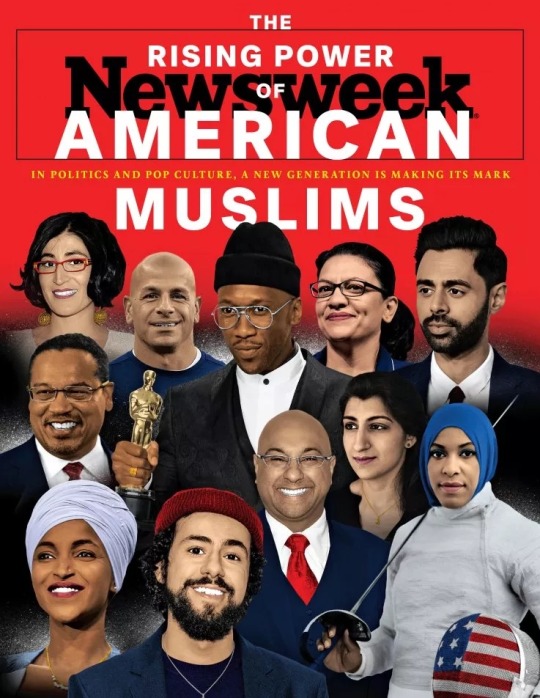
It's been an impressive 2021 so far for Muslim Americans. The U.S. Senate, that bastion of partisan gridlock, overwhelmingly confirmed the nation's first Muslims as a federal district court judge and to chair the Federal Trade Commission. Legislatures in five states swore in their first Muslim members, including a nonbinary, queer hijab-wearing representative in, of all places, Oklahoma. Three Detroit suburbs are poised this fall to elect their first Muslim mayors. The New York Jets tapped Robert Saleh as the first Muslim head coach of any American pro sports team. CBS premiered, then renewed The United States of Al, the first broadcast network sitcom with a Muslim lead character. And Riz Ahmed, star of Sound of Metal, became the first Muslim nominated for an Oscar for Best Actor.
"Everywhere I look, I see firsts happening," says MLB Tonight sportscaster Adnan Virk, who in 2012 became the first on-air Muslim host on ESPN.
As the 20th anniversary of September 11 approaches, the recent rise of many Muslim Americans to positions of power and influence—in Washington and in statehouses, on big screens and small ones, across playing fields and news desks—is a development that few in the U.S. would have predicted two decades ago, Muslims included. In the immediate aftermath of the terrorist attacks by the radical Islamic sect Al-Qaeda, anti-Muslim hate crimes exploded and the ensuing global "war on terror" to root out jihadists created a "climate of discrimination, fear and intolerance," as one think tank described it, that surrounded people of Islamic faith in this country and lasted for years. Then, just as heightened anti-Muslim sentiment in the U.S. seemed to be subsiding, Donald Trump was elected president in 2016 on an agenda overtly hostile towards Muslims, and revved it up again.
It is the experience of coming of age in this post-9/11 environment, experts say, that drew a new generation of young Muslims to activism, and motivated them to use their voices in political and cultural arenas to debunk misinformation. That they've found a receptive audience beyond the Muslim community suggests to some observers that many Americans now understand that the anti-Islamic rhetoric they've been served in recent years is based on myths and untrue. As Minnesota Attorney General Keith Ellison, who in 2007 became the first Muslim sworn in as a member of Congress, tells Newsweek, "The haters have been proven to be liars."
Maybe. But trend data suggests the answer is not that simple and anti-Islamic sentiment remains a factor 20 years after 9/11. Anti-Muslim hate crimes, for instance, are second only to anti-Semitic incidents, FBI statistics show. And in a Gallup poll, one-third of Americans, and a full 62 percent of Republicans, said they'd never vote for a Muslim candidate for president, by far the least support for people of any religion in the survey.
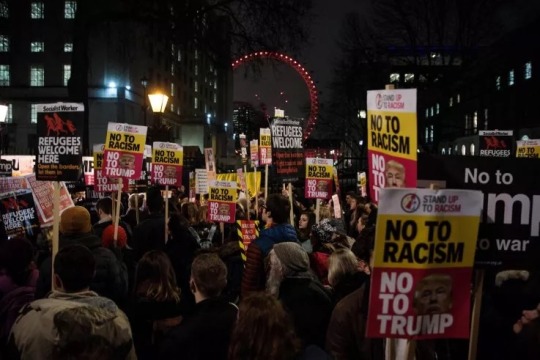
Anti-Islamic sentiment remains a factor 20 years after 9/11. President Donald Trump's ban on travel from seven Muslim-majority countries didn't help (here, protestors make their feeling about the ban known). Jack Taylor/Getty
Is the recent rise of Muslim Americans to positions of prominence a temporary surge forged during the backlash of the Trump era or a permanent change in American consciousness? Are the constant, often viciously personal attacks on Representatives Ilhan Omar of Minnesota and Rashida Tlaib of Michigan—the most famous Muslims in American politics as well as two of the nation's most strident progressives—a last gasp of Islamophobia or proof that, in some quarters at least, it's never going away? If, in fact, the political and cultural shift toward Muslims has staying power, what will the impact be?
The answers are still unfolding. "Muslims are becoming more a part of the American tapestry, but they are still a marginalized group," says political scientist Youssef Chouhoud of Christopher Newport University in Newport News, Virginia. "The question now is, OK, so you have these Muslims in public office, in the public eye, on commercials, on TV shows. But does it stick? That's TBD."
Identity Forged in Adversity
When the attacks by Al-Qaeda occurred 20 years ago, the makeup of the Muslim community in the U.S. was much different than it is today: significantly smaller, older, more conservative, less organized, and made up of more Black Americans and far fewer recent immigrants.
In 2001, roughly 1 million Muslims lived in the U.S., according to the Association of Religious Data Archives, versus 3.5 million recently. As a group, they formed a solid Republican voting bloc, with the immigrant community in particular drawn to the GOP's messages of self-reliance, small government and conservative social policies on issues like abortion and gay rights. George W. Bush won 72 percent of Muslim votes in 2000, according to the Council on American Islamic Relations, or CAIR; other polls put the figure lower by still showed a big GOP tilt. After 9/11 that support plummeted, with just 7 percent backing Bush in his 2004 face-off with Democrat John Kerry.
Party affiliation wasn't the only shift among Muslims in the U.S. in the post-9/11 years. Before the attacks, Muslim Americans seldom saw themselves as a single community bound by a common faith as much as a disparate collection of distinct ethnic groups—Iranian, Iraqi, Syrian, Pakistani and Egyptian among many others—that kept to and fended for themselves, says Niloofar Haeri, chair of Islamic Studies in the anthropology department at Johns Hopkins University. The other large bloc of Muslims in the country were Black Americans who saw the Islam of Malcolm X and boxer Muhammed Ali as both a religion and a political identity used to advocate for the poor and marginalized. That application of the faith, says Haeri, unsettled many immigrant Muslims who came to the U.S. to escape theocracies.
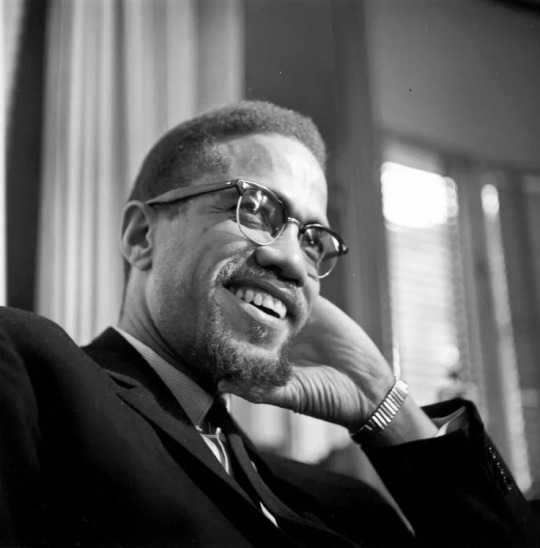
Many Black Americans saw the Islam of Malcolm X (pictured here) and boxer Muhammed Ali as both a religion and a political identity used to advocate for the poor and marginalized. Michael Ochs Archives/Getty
Then came the ferocious backlash after the September 11 attacks, marked by a wave of physical and verbal assaults on Muslims and anyone who "looked" Muslim. According to the FBI, there were 28 reports of anti-Muslim hate crimes in 2000; in 2001, that number had climbed to nearly 500. Although then-President George W. Bush had initially urged people not to take out their fear and anger Muslim Americans, his administration later went on to surveil mosques and college Muslim organizations looking for terrorists and invaded Iraq in 2003 on later-debunked claims of involvement with Al-Qaeda and plans to build weapons of mass destruction. Many Christian religious leaders during this period made harsh anti-Islamic remarks as well.
Conservative politicians also spent several campaign cycles in the post-9/11 period ginning up public fear that Muslims wanted to impose Sharia in America—that is, turn religious strictures of Islam into laws akin to those of some Middle Eastern theocracies. "For a while Republicans were all about banning Sharia law, which doesn't exist anywhere in America that I'm aware of," Ellison says. "In another way, every Muslim does 'Sharia law' every day. When I pray, that's Sharia. When I fast for Ramadan, that's Sharia. When I don't eat pork, that's Sharia. And these are the people who say they defend religious freedom."
All of this stoked fear of unwarranted reprisals among Muslim Americans and helped forge a generation of young activists who are now winning political office from city council to Congress, Chouhoud says. By 2007, 84 percent of 12- to 18-year-old Muslim Americans said they had experienced at least one act of anti-Islamic discrimination in the prior year, a New York University study found. In 2009, more than 82 percent of Muslims in the U.S. reported feeling unsafe, an Adelphi University survey found.
Muslim Americans faced a choice: Grin and bear it or band together and respond, Haeri says. "One of the most consequential changes that happened in various Muslim communities post-9/11 was that those Muslims who were not religious and did not identify as Muslim before 9/11 were suddenly being treated as Muslims whether they wanted to be or not and were asked questions about Islam," Haeri recalls. "Muslim communities filled with newly self-identifying Muslims. There was a lot of soul searching: Why are we shunning this heritage entirely?"
Meanwhile, more religious Muslim Americans, especially the ones who fled autocratic regimes and failed economies, baffled over questions about their patriotism. "We had to redefine ourselves and push back against injustice—from our country, from the government, from the media, from popular culture," says Nihad Awad, co-founder and executive director of CAIR. "We felt the pain about 9/11 that everyone felt but more pain than many because we were blamed for what happened—something we had nothing to do with."
Adversity fused a far-flung gaggle of nationalities into a coalition of necessity, says Democratic Representative Andre Carson of Indiana, who in 2008 became the second Muslim elected Congress. "This role was paved decades ago by the indigenous African-American Muslim community, but 9/11 allowed the immigrant Muslim community to see that the African-American Muslim community was right all along in calling out racial injustices, calling out governmental excess as it relates to violations of civil liberties and spying on fellow U.S. citizens," says Carson, who is Black.
At the same time, throughout the Bush and Obama years, the pace of immigration to the U.S. from Muslim-majority nations in the Middle East, Asia and Africa surged. Between 2002 and 2016, the number of Muslim refugees accepted into U.S. rose 627 percent—from about 6,000 a year to almost 40,000—which, along with the highest birth rate of any religious group, caused the sharp increase in the Muslim population. The influx has since stopped, as the Trump administration cut the number of refugees accepted into the U.S. to an all-time low of fewer than 12,000 in total, almost all of whom were Christian, according to State Department data.
During the period, Muslim visibility in everyday life increased for many because of where they live now: the suburbs. Nearly half of mosques are now in bedroom communities outside major cities, up from 38 percent in 2010, according to a July report from the Institute for Social Policy and Understanding, which researches trends in American Muslim life. At the same time, the actual number of mosques rose dramatically, more than doubling from 1,209 to 2,769 since 2000.

The number of mosques in the U.S. has more than doubled, to 2,769, since 2000. Here, an outdoor prayer event at Masjid Aqsa-Salam mosque, Manhattan's oldest West African mosque. Spencer Platt/Getty
"The age-old pattern of immigrants achieving financial success and moving away from cities seems to be repeating itself in the American Muslim community," ISPU notes.
By the election of Trump, who as a candidate in 2015 called for a "total and complete shutdown of Muslims entering the United States," the American Muslim community was bigger, brasher and uniformly unwilling to roll over. Indeed, observes MSNBC anchor Ali Velshi, Trump's effort to ostracize Muslims, and a subsequent rise in anti-Muslim rhetoric and hate crimes to levels not seen since 2001, lit a spark.
"Something is happening right now," says Velshi, who is believed to be the first Muslim to helm a cable network news program. "It feels like a flourishing of Muslims across industries and across platforms."
Running While Muslim
The arc of Sadaf Jaffer's adult life—from college freshman at Georgetown during 9/11 to the nation's first female Muslim mayor in 2019—offers a useful road map of what has happened to Muslims in U.S. politics over the past two decades and, particularly, recently.
The 38-year-old, who was born in Chicago to immigrants from Pakistan and Yemen, had planned to be a U.S. diplomat and interned at both the State Department and the Marine Corps. But she became increasingly distressed by the anti-Islam sentiment rising across the U.S. and, in 2007, shifted her focus, enrolling at Harvard to pursue a doctorate in philosophy focused on Islamic cultures in South Asia. Her goal: "Understanding Muslim societies better so I could teach about Muslim societies in their complexity."
By 2017, she was a professor at Princeton University so alarmed by the election of Donald Trump that she decided to go into politics by running for a seat on the Montgomery Township Committee, the governing council for a wealthy, fast-growing New Jersey burg of 24,000 residents about 20 miles north of Trenton. Even on such a small scale, the notion terrified her family. "My parents told me, 'Shouldn't we lie low and not draw attention to ourselves right now?' but I felt like if we don't stand up for our rights now, who's to say that we'll even have rights moving forward," Jaffer says.
Jaffer won that seat and, in 2019, was elevated to mayor. Her status as the nation's first female Muslim mayor, she says, was blared in foreboding tones across pro-Trump news sites and Twitter. "That caused an avalanche of hate mail—violent ones, too, about how all of us should be removed from the planet," she says.
It didn't deter her from seeking higher office. This June, she won the Democratic nomination for a seat in the New Jersey Assembly; if she wins this fall, she'll be the first Muslim (and first Asian American) in the Garden State's legislature. She is bracing for some anti-Muslim sentiment but also views her campaigns as a chance to debunk constituents' misconceptions about Islam.
"Those person-to-person connections are really important," she says. "They're about getting to know people as human beings."
If Jaffer wins, she'll follow on the success in the 2020 election that brought the first Muslim legislators to capitols of Delaware, Oklahoma, Colorado, Florida and Wisconsin, and the first re-election of Omar and Tlaib. There are other firsts likely to come this fall too; the top vote-getters in the August primaries for mayor of Detroit suburbs Dearborn, Dearborn Heights and Hamtramck—enclaves with large Muslim populations—were all Muslims.

U.S. House Speaker Nancy Pelosi administers the oath of office to members earlier this year, including Representatives Andre Carson, Ilhan Omar and Rashida Tlaib, three of only four Muslims who have served in Congress. Erin Scott/Getty
In all, a record 170 Muslim candidates were on ballots in 28 states in 2020, up from 57 in 2018, and 62 of them won. Exit polling showed that more than 1 million Muslims voted last year, also a record.
"When Trump won, it was a wake-up call for the community," says Wa'el Alzayat, the CEO of Emgage, an organization promoting civic engagement among Muslim American communities.
Also notable: Almost all of these winners are Millennials; Tlaib, at 45 and slightly older than that cohort, is an exception. And most of these Muslim politicans report being the target of some form of anti-Islam sentiment while running.
"They sent out emails connecting me with Ilhan Omar and accusing all the Muslim candidates running across the country of being Islamist or Jihadists," says Delaware state Representative Madinah Wilson-Anton, 27, who ousted a 20-year Democratic incumbent in 2020 to become her chamber's first Muslim. "I was door-knocking and someone was like, 'Go back to your country.'"
Wilson-Anton is not the only Muslim candidate whose religion is used by opponents as grounds to call their qualifications for office into question. In June, GOP Representative Marjorie Taylor Greene of Georgia sent a fundraising email attacking Omar as a "terrorist-supporting member of the Jihad Squad." Sam Rasoul, the first Muslim to run for lieutenant governor in Virginia, was asked in May by a debate moderator whether he could reassure voters he would "represent all of them, regardless of faith or beliefs." And Joe Biden's nominee for deputy administrator of the Small Business Administration, health care executive Dilawar Syed, is in confirmation limbo after two GOP senators objected to the fact that he is on the board of Emgage, the Muslim nonprofit. (He says he'll resign if confirmed.)
In each of these recent cases, though, a broad spectrum from various religious and ideological groups have joined Muslims to object to how the candidates are being treated. An opponent of Rasoul's, for instant, lambasted the debate moderator from the stage for asking the question and social media scorn was so swift that an anchor for the TV station, WJLA, apologized that night on the air. In Syed's case, several Jewish groups are rallying to his side.
"Overall," says Emgage CEO Alzayat, "things are moving in the right direction."
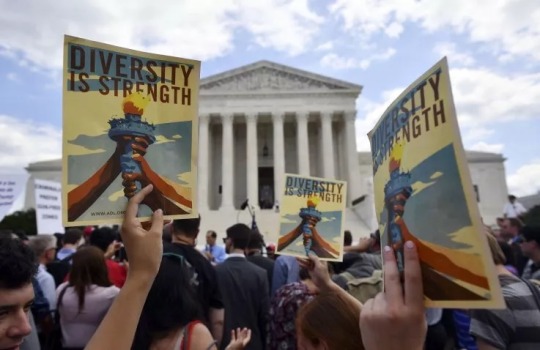
People protest the Muslim travel ban outside of the US Supreme Court in Washington, DC on June 26, 2018. Mandel Ngan/AFP/Getty
A Growing Impact
In office, many of these legislators can point to measures influenced directly by their Muslim backgrounds. Wilson-Anton in June pushed through a new law requiring schools to excuse student absences for religious observances such as Muslim or Jewish holidays. Saqib Ali, who at age 31 in 2006 was elected Maryland's first Muslim state legislator, co-sponsored a law with a Jewish colleague allowing for the licensure of funeral directors who do not embalm bodies because observant members of both faiths do not do so. After someone left a slab of pork on a Muslim family's car in her town, Jaffer started the Montgomery Mosaic, a monthly series of community-wide events to combat hate crimes.
More broadly, Chouhoud says, having more Muslims in the halls of power has changed some conversations. In May, when violence erupted between Israel and Palestine, for example, several Democratic leaders in Washington expressed concern about Israel's aggressive response and the plight of Palestinians. That, he says, was due in part to the activism of Omar and Tlaib. "It's pretty undeniable that the presence of Ilhan Omar and Rashida Tlaib in Congress has given voice to opinions that other Congresspeople in the past have either shied away from or found to be outside of the bounds of what they can actually say, even if they personally held those positions," he says.
Indeed, the congresswomen, both of whom declined Newsweek's requests for interviews, are considered inspirational trailblazers by many within the American Islamic community who see them exploding myths about Muslim women being docile and submissive, Haeri says. Even their differences—Omar wears a hijab, Tlaib is famous for her penchant for swearing—shows "the diversity of Muslim women in a way that surprises and educates a lot of people," Haeri says.

Democratic Representatives Rashida Tlaib of Michigan (left) and Ilhan Omar of Minnesota are considered inspirational trailblazers by many within the American Islamic community. Tom Williams/Getty
Virtually every Muslim elected to state legislatures—and all four who have ever been elected to Congress—are progressive Democrats; Carson, the Indiana congressman, was among the first elected officials to endorse Vermont Senator Bernie Sanders, a Democratic Socialist, for the 2016 Democratic presidential nomination. Sanders held firm to that support four years later; a CAIR survey in February 2020 found 39 percent of Muslim Democrats supported Sanders versus 27 percent for Biden. For many Americans, this alignment defies well-worn stereotypes about Muslims as extreme social conservatives who would not support a pro-choice, pro-LGBTQ Jewish candidate.
Yet the Omar-Tlaib approach is offensive and troubling for some politically conservative Muslims, who object to what they say is an underlying message that Muslims are badly-treated victims of bias. "The experience of American Muslims is one that's overwhelmingly positive," says Omar Qudrat, 40, of California who in 2018 was the first Muslim to win the GOP nomination for a seat in Congress. (He lost by 23 points.) "Many of us reject the victimhood narrative. Do we have problems? Absolutely. But it would be tragic for any young American Muslim to believe all they amount to is being a victim of this great country."
Qudrat and prominent Muslim conservative Zuhdi Jasser defend Trump's policies as being in the interest of national security and praise him for brokering treaties between Israel and Bahrain and the United Arab Emirates. "I'm not embarrassed of my faith," says Jasser, a Phoenix physician appointed by Republican Senator Mitch McConnell in 2012 to the U.S. Commission on International Religious Freedom. "But I understand the mindset of a country that was attacked. Those wounds are still very deep."
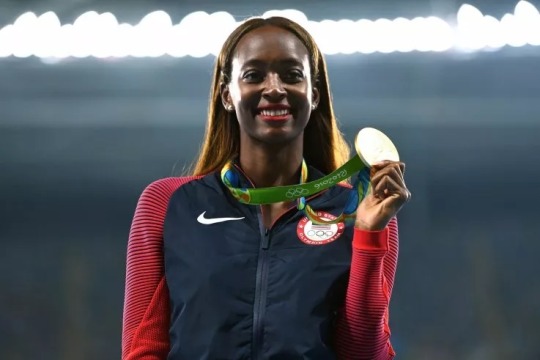
Gold medalist, Dalilah Muhammad of the United States, poses on the podium during the medal ceremony for the Women's 400m Hurdles on Day 14 of the Rio 2016 Olympic Games at the Olympic Stadium on August 19, 2016 in Rio de Janeiro, Brazil. David Ramos/Getty
There is an audience for this view: Trump modestly increased his share of the Muslim vote in 2020 to 17 percent from 13 percent in 2016, CAIR reports.
"Muslims are still a relatively socially conservative population," Chouhoud says. "Certain values and priorities do overlap between Muslims and Republicans. It's just that there's the sense that there is no place for Muslims within the Republican Party."
Jasser maintains the GOP is not as anti-Muslim as progressives believe, citing the confirmations earlier this summer of Lina Khan to chair the FTC and Judge Zahid Quraishi to the federal bench, by wide bipartisan margins. Awad, of CAIR, counters by citing Republican opposition to other Muslims nominated by Biden for positions within the administration, such as Reema Dudin as deputy director of the White House Office of Legislative Affairs, and the long GOP-led delay on Syed's bid for an SBA post.
"To dismiss the rest of the Muslim community's concerns about discrimination, they must be living on the moon," Awad says. "I have not met a Muslims since 9/11 who has not experienced some form of discrimination."
Alzayat of Emgage, for one, hopes the GOP does, in fact, become more hospitable. "There will come a day when we have Muslim Republicans running, Muslim Democrats running, Muslim independents running, and they can have healthy disagreements about policies," Alzayat says. "That would be good for the community and good for democracy."
The Stars and the Crescent
This moment of ascendence for American Muslims is not only about political achievements. Popular culture, too, is seeing a sharp increase in Muslim representation, and the two trends feed each other. Movies and television offer familiarity that helps fuel acceptance, allowing many non-Muslim Americans who don't personally know anyone who practices Islam to see Muslim characters woven into the fabric of everyday life.
"It's an opportunity to create greater empathy for and less prejudice towards Muslims off-screen," says Arij Mikati of Pillars Fund, a Muslim philanthropy that next year will award $25,000 grants to 10 Muslim TV or movie storytellers.
Among those helping to drive this new level of cultural visibility: Ramy Youssef, who won a Golden Globe and a Peabody Award in 2020 for Ramy, a half-hour Hulu dramedy about a first-generation Muslim-American millennial struggling with his faith. Also in the cast for the show's second season was Mahershala Ali, the first Muslim actor to win an Academy Award, for his supporting roles in Moonlight (2016) and Green Book (2018). Disney+ is due this fall to drop Ms. Marvel, introducing Marvel's first Muslim superhero, a shapeshifting, bubble-gum-chewing Pakistani-American teen from New Jersey. And there are past and present recent series like Patriot Act with Hasan Minhaj and United States of Al, a CBS sitcom about a U.S. war veteran who helps his Afghan interpreter move to Ohio.

The Netflix series "Patriot Act with Hasan Minhaj" is one of a number of shows that helped to bring Muslim actors and storytellers a new level of cultural visibility. Matt Doyle/Getty
Jaffer, the Montgomery Township mayor, says she's also noticed greater Muslim visibility on kids' shows like Sesame Street and Peg Plus Cat, and it's extended to her daughter's first-grade classroom, where the teacher this spring read a book about Ramadan to students. "Those things seem like little victories, that our celebrations are being recognized as part of America,'" she says. "It's nice, because as a child, I had to explain everything. Just imagine asking a six-year-old to answer, 'What is Christmas?'"
Some Muslim actors and celebrities say they try to advance the ball, talking openly about their faith and cultural identity when asked—or not asked. Adnan Virk, while still at ESPN in 2016, recalls being asked to help anchor coverage after boxer Muhammed Ali died. "One of our producers called and said, 'Hey, we don't know anything about Islamic funerals. Could you come in?'" Virk recalls. "That made sense. They wouldn't know. Open casket, closed casket? What prayers are they reciting? Why is he draped in white? That was a cool moment."
Comic Negin Farsad, a frequent panelist on the NPR quiz show Wait Wait...Don't Tell Me!, says she takes "any occasion I can when it fits organically in the joke to make mention of being Muslim. I do that to let people know that one of their favorite radio comedy shows has a Muzz on it and it's cool."
And MSNBC's Velshi says he intentionally tries to bring on guests and experts who are Muslims and of other marginalized communities to talk about topics unrelated to their identities. "It's the simplest thing in the world to do to break down barriers, to cause people to open their minds," Velshi says. "I want my roster of guests to look like the full breadth of America. Familiarity breeds understanding."
But while there are undeniably more Muslims in higher visibility and breakthrough roles, experts in and outside of the American Islamic community note that the numbers and depictions still don't come close to fair representation. A USC Annenberg study this June of 200 popular global movies from 2017 to 2019 found that just 1.1 percent of the speaking characters in U.S. films and 1.6 percent overall were Muslim, still frequently stereotyped as outsiders, threatening or subservient, particularly to white characters.
"More than half of the primary and secondary Muslim characters were immigrants, migrants, or refugees, which consistently rendered Muslims as 'foreign,'" says Al-Baab Khan, one of the study authors. "Film audiences only see a narrow portrait of this community, rather than viewing Muslims as they are: business owners, friends and neighbors whose presence is part of modern life."

Islamic Center Of America on July 17, 2014 in Dearborn, Michigan. Raymond Boyd/Getty
A Long Road Ahead
The challenges Muslim Americans face in popular culture in many ways mirror the political environment: The gains are real, increasingly visible and more prominent, but for now at least, still relatively modest—and, Muslim activists worry, too easily at risk of being erased.
They point out, for instance, that there's never been a Muslim in the U.S. Senate, elected as governor or appointed to a Cabinet position. Another major terrorist attack involving extremist Muslims, a successful White House comeback for Trump or the election of a similarly-minded candidate could once again sour public opinion or create new dangers.
"Trump was able to capitalize on bigotry, on ignorance and racism, on fear," said CAIR's Awad. "He mobilized it, weaponized it, made it official. His impact is still with us. And he might come back."
Still, the progress thus far has Muslim leaders cautiously optimistic and thirsting for more. Haeri hopes to see more taught in schools about Islam's history, noting the contributions of Muslim scientists and artists are absent from the education of most American children. Carson, the Indiana congressman, looks forward to the day he can donate to the first Muslim to run for president. Farsad just wants better roles to play. "I'm both ashamed and unashamed to admit that I have auditioned for the wife of a terrorist," she says. "That's what was available."
"We've been so underrepresented for so long, we're just working to even out the odds," Emgage's Alazayat says. "The question is not, 'Wow, look at how much we've done.' We should expect more."
0 notes
Text
THE G WORD
I wrote this blog months ago. It’s time to share my story and some exciting news! I’m re-branding my business to include herbal education, workshops, and more! The entrepreneurial journey has been fun for me as I grow and expand my offerings. I am so happy to offer skincare and beauty services, but my practice has evolved into so much more. The following true story is told from my heart and I hope you’ll embrace my new brand with enthusiasm and support. This is my story from Gypsy Skin Spa to Wild N Rooted.
It has been brought to my attention recently that a word exists. This word is part of our English language and our cosmology. This word has many meanings, it is powerful, controversial, and mysterious.
Gypsy.
Some people believe it to be a racial slur, others believe it to be a lifestyle and some have no idea what the word is, means, where it comes from, how to say it, or even care. You can see where this may cause some issues and concerns. Due to its controversial nature, I used it once, but will refrain from using it moving forward out of respect for those reading this who deem it offensive.
This is my story and how I birthed my lifestyle brand in 2015. This word resonates with me deeply in a very authentic way. It is an expression of my being. After being attacked online and accused of being a racist, I strongly felt the need to tell my story. I want to talk about it. This dilemma, this idea, this age of offending is an opportunity for education and to begin co-creating a high vibe around the label.
You see, our English language is convoluted in historical accounts that many of us didn’t even know existed. For instance, the word “Bucket List” actually comes from hanging someone by “kicking the bucket” out from beneath them before they die. Did you know that Hooligans are associated with the Irish? Vandals, the Germans? The G word are associated with the ethnic group, Roma or Romany, who immigrated into parts of Eastern Europe. The locals thought they were from Egypt or Egyptian (hence gyp) which we now know as they begin to have a voice in literature and other cultural affairs. They identify with Roma, Romani, Romany, or Rroma. I’m what you call a European Mutt, which is essentially a dog mixed with who knows what and I don’t like it very much. Alas, society has deemed that description appropriate.
My focus is on the positive aspects of the G word discussion and how we can use it to free the people under this guise, not slander them. More importantly, that we stop grouping people together and/or generalizing, stereotyping subgroups of people or minorities in the first place. There are good people and bad people. Period. There are all types of different people in this world. I mean, there are ALOT of us! We have different ideas, perspectives, opinions, customs, foods, languages, fashions, economics, currency, status, religions, and experiences. This all happens simultaneously as life spirals along, upwards and outwards.
My personal story regarding this particular identity began when I was 30 years old, also known as my Saturn Return, when the walls around me would literally come crashing down. My roommates and I were residing in Marina Del Rey, CA and we all lived peaceful, independent lives. A large development company purchased the property and our landlord told us to vacate. During this time, I also lost my job and couldn’t afford to pay my bills. A dance troupe that I created and adored fell apart at the seams and my Grandmother passed away. I went on unemployment and moved back in with my parents. Welcome to the Boomerang Generation.
Although grateful for this landing, it was uncomfortable. I got a part time job in a small salon, but my business couldn’t thrive without clientele. Soon enough, I decided to go back to College in Fullerton and soon I found myself back in Los Angeles living in West Hollywood. This was an interesting time. I had ditched an abusive boyfriend, my car was broken into, very important documents like college homework and documentary drafts were stolen. I was drunk most of the time falling into a deep state of depression. I had also discovered Ayahuasca as a medicine, something that would change my life in the most extraordinary way.
Still to come at 32 years old, I was forced to file Bankruptcy, the banks wouldn’t accept my income loss or life changes. Eventually, I found another spa in Redondo Beach, CA and moved into a room with the generous Persian couple who owned it. A month later, I met a nice Indian man in Hawthorne and I rented a room from him. He was a single father with a daughter and a gorgeous white Shepherd named Bella. To supplement my income, I began working as a cocktail waitress while developing my clientele. No more than 3 months later, the restaurant folded. My inappropriate employer kept my last paycheck and I wasn’t making enough money at the spa to live on my own. I moved back to Culver City with my Aunt and shared a room with a friend. I lived there for, you guessed it, about 3 months. During this time, I was able to get another part time job in Santa Monica at a small spa called Petite Spa with a lot of potential, as well as taking up an offer to work for a high- profile ticket broker in Huntington Beach. This led me to a short stint in Orange County. I even got a third job working part time at another day spa. Less than 3 months later, I was fired from the office job and so I quit the esthetic job and moved back to Los Angeles. I found a small studio in Mar Vista, CA. One room, no kitchen, and it became my sacred space for 2 years.
With hardly anything, but a strong will and a humbled spirit, my private practice as an Esthetician and Herbalist was born. The journey was already under way.
In 2016 I studied in New York with a wise, old woman named Susun Weed, a Witch. All five of her apprentices were not allowed to say the word “guy.” It was unacceptable around her and she would only accept “Gaia” instead. It was difficult to change my habitual language, but eventually I started to remember. I admired how she created her reality, yet I feared her verbal abuse. Ironic eh? I lived on her land for two weeks and was initiated as a Green Witch, polishing my toe green as the final induction. The Washington Post wrote a great article about the word “guy” and its origins. Although now common language, the Oxford English Dictionary defines it as a “person of grotesque appearance.” When I came back to L.A, I began noticing how many people said “Guy” when referring to myself and women. It really bothered me. I attempted to correct them several times, then held my tongue, then it became plain awkward. Nobody cared. It was a construct. Once I realized my offenders never intended to insult or hurt me, I stopped physically hearing it. I can’t even remember the last time. I know they’re saying it, but I just can’t hear them. The origin of “guy” has become a fun fact in Etymology. Now it means “a man or woman.” It’s amazing how our language morphs, twists and turns, along with history, experiences and ideologies.
Why am I telling you my life story? Well, because it all has to do with the G word. With all of that being said, we are still in a predicament because the G word is STILL used as a derogatory ethnic slur in other parts of the world. In this very moment. In fact, people all over the world continue to oppress minorities and entire countries still deny genocides and documented accounts of massive human extermination. This pains my heart so. I dream of a peaceful planet where all cultures can learn from one another, respecting the language, food, music, fashion, art, and religious views. May we all migrate toward our tribes. This is a tall order; however, THIS is my focus, not how the G word has dubious meanings around the globe. My work is to continue finding my truth, my voice, and stand up for what I believe in. Of course, my writings and teachings are a part of this. I believe in service to the people, empowering women and leaving the world a cleaner place. It’s that simple.
There is freedom and oppression within the G word. It has become an archetype. At age 3, my mother chose this as my costume on Halloween, dressing me in a gold scarf, bright red lipstick, blush and hoop earrings (clip on of course!). Let us think about it as an archetype. Like Witch, Faerie, Crone, Goddess, and Bitch, all those that we have reclaimed. Allow for the good, the bad, and the ugly. I don’t subscribe to living in a paradigm that even allows for racism. Using the word racist and race separates us more than it holds us. I think that for people in the U.S, the G word conjures up feelings of traveling, romance, fashion, mystery, a free spirit, natural living, family, and determination. The irony and most painful part of this archetype is that one group of people on one side of the world felt and feel offended by it, and the other groups in the West have gained wild open-hearted freedom from it. We must ponder as a society, no matter where we were in the past, we are here today and need to continue moving forward together. We cannot suspend each other in the past. As my Mentor once said, “It’s ok to look into the rear-view mirror every once in a while, but you can’t drive the car that way.”
I consistently check myself and tune into my energy. When I’m feeling off, I have to take a deep breath and move it into a higher vibration. Living in society with different people has its challenges, but I believe it is our human right to feel happy and free no matter what our circumstances. I wish this upon all cultures. Instead of accepting a slur from the oppressors, the people of Romany are in a great position to reclaim themselves. Let us embrace the real G word and may they come into the light. Let the women tell their stories, entering into evolution. My prayer is that we release the word into the ethers and let peace fall upon the land of the aggrieving. My highest belief about this is that we are one human race thriving together on Planet Earth.
So here we are back in my studio apartment. I knew exactly what I had to do. I had to create work for myself, with my own two hands. I had to discover my passion, my gifts, and share them with the world. I had to learn from other women and I also promised myself I would stay in one place as long as I could. Humbled by my life on the road, I was finally feeling confident, independent, and free once again. I began embracing my call to the wild, to ceremony, Paganism, the plants, and natural healing methods, reading books, apprenticing, and attending workshops. I studied myself. I studied others. Along with the Magician, The G word was becoming a strong presence in my life. I still receive gifts to this day that represent G word magic.
What I did not know until recently is that the Romany are STILL being oppressed in Eastern Europe and the G Word is not a nice word at all.
I interviewed a couple Roma men that I found online. I interviewed Romany women who use the term in their business brand. They told me that the prejudices are still occurring against them. They all said they are not personally offended by the word, but warned that others may be. As a woman of mixed European descent, I am always searching for cultural traditions that I can call my own. I grew up with a small family and little tradition. This is partly why I am so drawn to the archetype and the lifestyle, one that allows me freedom, contrary to what others feel the G word means.
I am a privledged white woman. I will use my voice to help others in need. I will continue to lead by example. I am a Lover. I am a Magician. I am a Manifestor. I am not an oppressor. I am not a racist. I AM wild and rooted.
The Archetype that I felt would continue to represent my journey, my dream, and my passion was Gypsy (oops I said it), but after months of pondering the last three years of my life in the herbal world and reading historical accounts of this word and how misused it has been, it has left a rather bitter taste on my lips. I have decided to evolve myself, my name, and my brand to include more herbal knowledge, medicine making skills, and workshops. A name that I feel will bring the people together. The timing couldn’t have been more perfect. Things really do happen for a reason and sometimes buttons get pushed for a higher purpose. I will be launching a new website soon so stay tuned!!! I created a name that represents my most divine constitution. A name that is not controversial, or offensive, but one that remains powerful and meaningful to me. I belong to no one.
I AM WildNRooted!!
Emilee Amara
Holistic Facials, Herbalist
2 notes
·
View notes
Text
NEW SHERIFF IN TOWN.....JOE BIDEN
The world is learning. America has a new leader and he is not a Donald Trump. The new Sheriff in town is Joe Biden.
Some people are complaining. Claiming Biden already is making trouble for the U.S. with Russia and China. Biden referred to Putin as a killer. The meeting with Chinese and American representatives this past week in Anchorage found both sides playing diplomatic hard ass. No name calling, however.
Better Biden openly acknowledged Putin a killer. He is. His track record in this regard clear.
I don’t know why China has a hair up its derriere. My gut feeling is China is testing the waters as regards Biden. Let’s see how tough he is type thing.
I am an expert at falling. I have many times in the past few years. I now require use of a cane. And I still fall, though much less.
Biden fell friday. Going up the steps of Air Force One. He apparently stubbed his toe on a step, fell forward, grabbed the handrail, went to pull himself up and fell again.
Got up and finished the step climbing with no problem. No injury involved.
He subbed his toe? Who has not?
Trump and Republicans are making a big deal of it. Trump especially. He who has been the biggest clown to ever sit in the White House has been tweeting negatively about Biden’s fall. Making fun of the President.
One tweet has Biden stumbling down the steps of Air Force One. Another also prepared by Trump has Biden being knocked over by a golf shot Trump’s father had just made.
Another tweet joked Biden needed a “Chair Force One.” A stair lift to help him up the steps.
The arrogance and poor taste of Trump. On the other hand, could less have been expected of him?
There was a case similar to Brown v. Board of Education 69 years before Brown. Brown was decided in 1954. The case I am referring to in 1885.
The Asian racial situation coming to light motivated me to do some research about Asians and their problems generally in the U.S. I came upon the case in question.
An 8 year old Chinese-American girl in 1885 helped desegregate San Francisco schools. The issue discrimination against an Asian-American girl.
Her name Mamie Tape.
One significant difference between Tape and Brown. Tape was finally decided in the California Supreme Court whereas Brown in the U.S. Supreme Court.
It was September 1884. Mamie’s parents were prosperous. Her father a very successful businessman. Their home in a very affluent neighborhood. Though Chinese, the family well respected and part of San Francisco society.
Mamie was born in the U.S. Her parents, immigrants. She was raised similar to an affluent white young lady.
The school of choice for affluent persons was Spring Valley Primary School. Mamie’s mother attempted to enroll Mamie. Never gave any thought she would be rejected.
Principal Hurley refused to accept Mamie citing scholar board policy against admitting Chinese children. Anti-Chinese sentiment was running high at the time. Chinese were assumed to be incapable of assimilating to mainstream American culture. Note Mamie’s parents and their family were totally westernized in language, dress and lifestyle.
Suit was filed against the Principal Hurley and the San Francisco Board of Education. The case was ultimately decided by the California Supreme Court one year later. Mamie won! The Court holding the Constitution’s “separate but equal” clause had no application.
Mamie was permitted to enter the previously all white school. Not just Mamie. The decision in her case applied to all San Francisco children. Chinese students from that point forward were admitted to all San Francisco schools.
Mamie’s decision did not seem to have any impact on other states.
I wonder if Mamie’s decision had any influence on Brown v. Board of Education. Chief Justice of the U.S. Supreme Court at the time was Earl Warren. He previously had been Governor of California and a California prosecutor before becoming Governor.
Warren ran for the Republican nomination for President against Eisenhower. Eisenhower beat him. When the Chief Justice vacancy arose on the U.S. Supreme Court, Eisenhower nominated Warren.
Could Warren’s California experience with Mamie’s decision have influenced his thinking in arriving at the decision the full Supreme Court did in Brown? It has been mentioned historically that Warren pushed for the decision in Brown. Insisted it had to be a unanimous one. Convinced his fellow Justices there could be no other decision.
Donald may be having financial problems. Could be. I suspect so.
Trump’s personal jet prior to becoming President a 757. Those were his glory days.
The glory days may be gone and the 757 with them.
The 757 sits in an airport in Orange County 60 miles north of New York City. The plane is need of extensive repairs. Big dollars involved.
The plane has not been flown at all since Trump left the White House. For his trips back and forth from Palm Beach Airport to La Guardia he uses his smaller 1997 Cessna 750 Citation X. Nowhere fashioned in gold as the 757. Trump even had 24 carat gold plated seat buckles on the 757.
I was thrilled beyond expectations last night. Stayed up till midnight watching the Syracuse/San Diego game. The first night of March Madness in Indianapolis.
San Diego State was favored. Syracuse destroyed them. With class! Seventy eight to sixty two.
Syracuse’s 2-3 zone defense worked all night. San Diego I suspect had never run into a zone defense before. They could not penetrate, get the ball in the center. They were relegated to taking 3 pointers which eventually did not fall. Embarrassingly so.
Buddy Boeheim excelled again. Scored 30 points. Sixteen consecutive points in the first half. At a time when San Diego scored not one point and Boeheim was the only Syracuse player who did score. He made 6 of 8 shots from the field.
Syracuse’s next game is Sunday at 5:15 pm. Syracuse plays West Virginia. Will Syracuse win again? I don’t know. What I do know is Syracuse played as close to a perfect game last night as can be played.
Go ‘Cuse!
One week from today I get my second vaccine shot. I am thrilled. Two weeks later I hope to be out on the road again.
Enjoy your day!
NEW SHERIFF IN TOWN…..JOE BIDEN was originally published on Key West Lou
0 notes
Link
via Politics – FiveThirtyEight
During her decade in national politics, Sen. Kirsten Gillibrand has been profiled, ad nauseam, by any number of very important publications: The New Yorker, New York Magazine (a couple times), Vogue, The New York Times.
But her 2012 interview with Self magazine, three years into her Senate tenure, is among the most compelling and useful texts for the Gillibrand close-reader. In a span of 599 words, the senator manages to ruminate on fitness tips (her 40-pound postpartum weight loss being the ostensible reason for the story), touch on the difficulties of being a working mother, name-drop several across-the-aisle friendships, and plug, in the most deft of humblebrags, her tireless spirit: “I approached losing weight the same way I’ve approached any other challenge throughout my life: I figured out exactly what I needed to do to succeed and dove in. I was determined.” Through Self, Gillibrand was cleverly reaching beyond snoozy news stories to a voting public that would perhaps remember a young senator who talked food-journaling and breastfeeding.
But the interview also offers an oblique insight into Gillibrand’s ever so determined and calculating rise in Democratic politics: At the time, Gillibrand had a standing weekly squash date with Sen. Al Franken. Yet five years later, she was the first Democratic senator to call for Franken to resign, and became, by no accident, the face of a movement to clean House (as it were) of harassers in public office.
No one was off the table, including — or perhaps especially — political patrons. Gillibrand said Bill Clinton, husband of the woman whose Senate seat she inherited, should have resigned from office. That led Clintonworld capo Philippe Reines to tweet, among other things, “Over 20 yrs you took the Clintons’ endorsements, money, and seat. Hypocrite. Interesting strategy for 2020 primaries. Best of luck.”
But Gillibrand’s appetite for biting the hands that feed her might actually be just what brings her success in the Democrats’ all-but-free-for-all scramble for leadership. She sniffed out the direction of the party months, even years ago, and has been tacking hard to the left ever since. She is attuned to the base, fluent in the new mediums of activism and, perhaps most importantly, knows how to spin. Who is Kirsten Gillibrand and what does she want? The latter is easy to answer: She likely wants to be president.1 But the former — who exactly is this woman whose moment it is we’re all living through — takes a bit more to parse.
The Gillibrand biography has, at this point in her career, reached a calcified, rote state that is particularly advantageous to politicians: maximum schmaltz, minimum actual insight. Generally, what you’re meant to take away from a Gillibrand bio paragraph in a profile is this: raised in regular old America; strong female role models growing up (including a grandmother who seemed to be Albany’s own LBJ); driven; Dartmouth; fancy lawyer (but let’s not linger on that too long); loves her kids; loves God; loves working across the aisle.
She has been charged in print on not one, but two occasions with being less-than-reflective.
The New Yorker called her “not given to soul-searching,” while New York called her “not inclined toward introspection.” FiveThirtyEight is neither given nor inclined to say much more than that Gillibrand might just be well media-trained, or perhaps she’s the kind of person who really does just plunge ahead. Just a political animal with a goal in mind, as she told the good people of Self.
She’s sensed the identity politics vehicle of the era, and has settled into the driver’s seat for a long haul.
At her essence, Gillibrand would seem to be not an ideologue, but an operator. In order to win she has evolved her positions, changed her mind … flip-flopped, in less polite terms. She used to have an “A” grade from the NRA, when she represented a conservative upstate district in the House, and she was against protections for sanctuary cities. One New York immigration group, incensed by her 2009 appointment to the Senate, issued a press release noting “she strongly supported throwing more resources toward ineffective border enforcement but appeared to oppose any path to citizenship for undocumented immigrants.” Progressive members of New York’s congressional delegation were so incensed by her appointment, they threatened to run against her.
In 2017, things are different. Gillibrand supports a path to citizenship, and has called Trump’s border wall a “hurtful, terrible policy that will never work.” In 2016, she wept in an interview while discussing her former stance on guns. She has voted against Trump’s positions more often than any other senator and is the sole member to vote against every one of the president’s Cabinet nominees. Gillibrand is a co-sponsor of Bernie Sanders’s single-payer health care bill, widely seen as a new Democratic presidential litmus test. In the House, where she served from 2007 to 2009, she was among the least liberal members of the Democratic caucus, ranking 209th out of 241. But in the Senate, she has skewed left. In the last Congress, she was the seventh most liberal member of the 46-person Democratic caucus.
So what to make of this impressive litany of flip-flops, her ease in changing her mind? It would appear that Gillibrand is a Democrat above all else. As the party has shifted left, so has she.
In other words, she is good at politics, if by politics we mean sensing the direction of the populace, capturing their sentiments in rhetoric, turning that rhetoric into votes, fundraising off those votes, gaining power and popularity, running for re-election, winning, and doing it all over again.
And the membership of the Democratic Party has, after all, gotten a whole lot more liberal during Gillibrand’s time in office, a trend that is only likely to continue. In 2008, according to Pew, 41 percent of Democrats called themselves “moderate” and 33 percent said they were “liberal.” By 2015, the ideological balance had flipped in the party, with 42 percent of Democrats calling themselves “liberal” and 38 percent “moderate.”
As of 2015, 49 percent of millennial Democrats identified as “liberal,” meaning that it’s smart politics to evolve left. Gillibrand is on to something. When people write that it is Gillibrand’s moment, it largely has to do with her capitalizing on the #MeToo movement to call out harassers. (After Trump’s taunting tweet, for instance, her office sent out a fundraising email.) But Gillibrand has been at the political fore of feminism’s resurgence for years. Well before this year, she made waves advocating for changes to the way the military prosecutes sexual assault, and she has introduced a paid family leave bill every year for the past five years.
She’s sensed the identity politics vehicle of the era, and has settled into the driver’s seat for a long haul. A recent poll showed that 64 percent of Democrats thought that sexual harassment was a very serious problem in the country, and 86 percent of women college graduates thought it represented a serious problem in society. Should Gillibrand run for president, that group, which continues to lean ever more Democratic, would be an important constituency.
And while many public figures are tone deaf on Twitter or have fallen victim to equivocating on behalf of allies (as Nancy Pelosi has), Gillibrand understands the moral absolutism required to survive in the Twitter age. “I think when we start having to talk about the differences between sexual assault and sexual harassment and unwanted groping, you are having the wrong conversation,” she said at a press conference calling for Franken to resign. “You need to draw a line in the sand and say none of it is OK. None of it is acceptable.” Polls showed that about half of Democrats thought Franken should leave.
So if her 2020 viability as a candidate is attached to the cultural reckoning over harassment and women’s empowerment, would Gillibrand still face the challenges Hillary Clinton had as a female candidate?
Any election she’s in will feature gendered lines of attack, but Gillibrand’s advantages go back to the kind of assured wielding of soft power she showed in that Self magazine interview. A generation younger than Clinton, Gillibrand has had the luxury of refining her power, allowing it to reside not just in the Senate chamber, but also in the facts of her womanhood. Iron ladies aren’t entirely in vogue; relatability is. And the senator from New York has made her empathy something central to her persona — it might have even helped her get her current job. Then-Gov. David Paterson told The New Yorker that she was a great comfort to him after an “SNL” parody centering around his legal blindness. “I’ve never mentioned to her really why I picked her, but that incident played a role,” he said.
Empathy might have helped her rise in politics, but it’s that operator’s sense that has likely helped keep her in it. In the last week of a hard-fought 2006 election to Congress, a police report about a domestic violence incident involving Gillibrand’s Republican opponent surfaced. Gillibrand, New York Magazine later noted, “has never denied that her campaign was the source of the leak despite being asked about it several times. She defeated Sweeney by six points.”
Politics can be a nasty line of work, and Kirsten Gillibrand is good at politics. Maybe that’s all a person needs to make their moment.
27 notes
·
View notes